








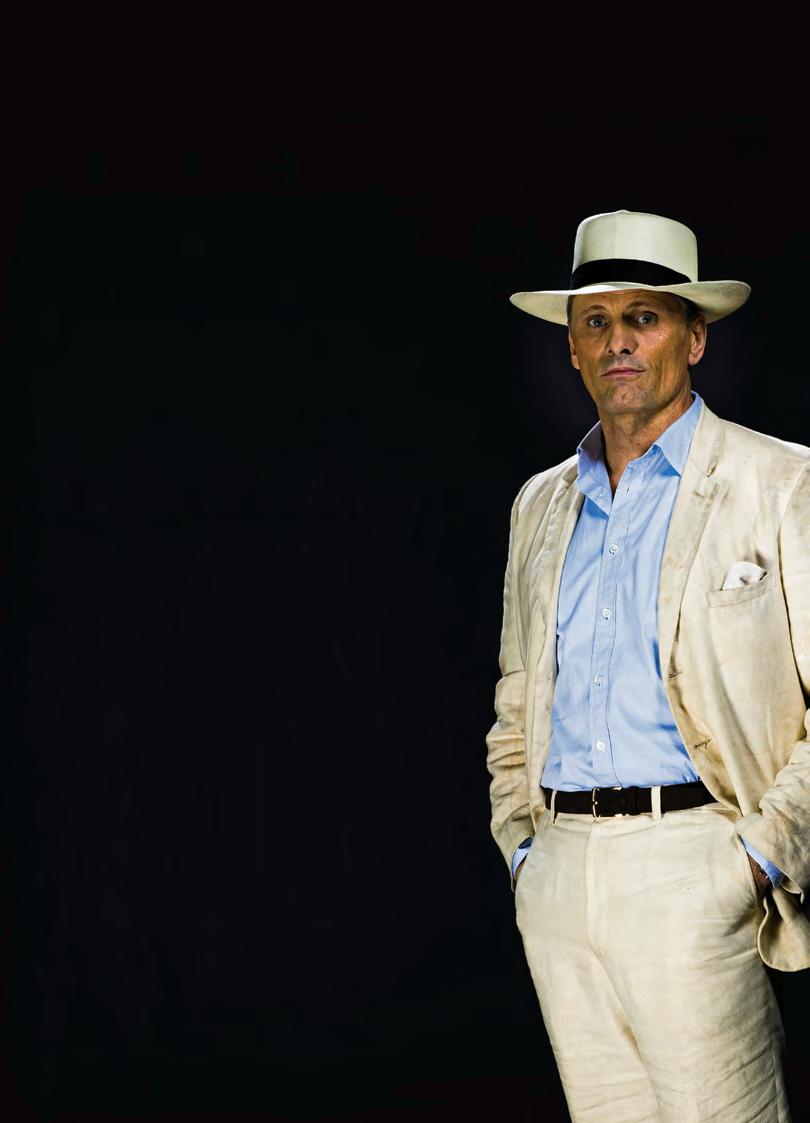


JUNE 2014
LOVE TO SEE WAYNE ROONEY HAVE AN AMAZING WORLD CUP’ VIGGO MORTENSEN TALKS FOOTBALL AND FILMS PAGE 24 MIRACLE AT WILLOW CREEK PAGE 48 DANGERS OF E-CIGARETTES PAGE 40 I SURVIVED A WHALE ATTACK! PAGE 98 A CURE FOR DIABETES? PAGE 62 JUNE 2014 £3.79 REPUBLIC OF IRELAND €5.10 readersdigest.co.uk LAUGH! .................................................................. 138 WORD POWER ....................................................... 131 IRVINE WELSH: “I REMEMBER” ......................... 32 BOOKS THAT CHANGED MY LIFE ....................... 127 BEAT THE CARTOONIST ...................................... 144
‘I’D









features
16 Rea sons To be Chee R f ul
The Yorkshire countryside brings out James Brown’s philosophical side
e ntertainment
24 Vig go mo RT e nsen
The A-list actor on new film
The Two Faces of January , politics and why he’s football crazy
32 iRVine We lsh: “i R e membe R”
From a housing scheme in Edinburgh to world fame, Irvine Welsh on his most meaningful memories
Health
40 bu R ning ques T ions
Just how safe are e-cigarettes?
48 m i R aC l e aT W il lo W
CR e ek
How eight-year-old Precious Reynolds made medical history
Inspiration
66 a f T e R Yo u’ Ve g one
Learning to live again after your spouse has died, by those who’ve been through it

74 i T’s all ki C king off Thirty-two teams, one goal: to win the World Cup
84 loVe R aT
Meet Mr T—the lovable rodent that changed a young couple’s life
Travel & Adventure
90 The pe ople’s beaC h
Writer Robert Kiener avoids the mayhem of the World Cup in favour of a stroll along Rio’s Copacabana beach
98 dang e R in T he deep blue sea
When Max Young found himself face to face with a 40-ton grey whale, he thought it was all over
cover: Jack e nglish; this page: g etty i mages/ c harles o mmanney 1 06•2014 |
june 2014 p 48
Contents

i’ Ve alWaY s loVe d T he W o R l d C up, in fact, as very young girls my sister and I wrote to the Brazilian embassy in London to ask for pictures of our footballing heroes Pelé and Jairzinho. We were thrilled when the pictures were duly sent to us—we really hadn’t expected a response. So I was delighted to discover that film star Viggo Mortensen, our cover personality this month, is also a World Cup fan. Read his interesting take on the beautiful game on p24.
You’ll notice some changes as you look through this month’s issue. We’ve restyled our cover to put the emphasis firmly on what’s unique about RD—great stories, well told. We’ve also organised everything into easy-to-follow categories that will make navigating the magazine more straightforward, and we’ve refined the design by introducing clearer, more legible typefaces. We hope we’ve given you the ultimate reading experience. Do please write and tell us what you think. Thank you.
 Catherine Haughney theeditor@readersdigest.co.uk
Catherine Haughney theeditor@readersdigest.co.uk
facebook.com/readersdigestuk
| 06•2014 2 IN e V er Y I s sue 4 See the World Diff erently 13 Ove r to You e ntertainment 21 Your Guide to June Health 56 Dr Max Pemberton 60 Susannah Hickling Inspiration 82 If I Ruled The World: Stephen Mangan Travel & Adventure 106 Kate Pettifer Money 110 Jasmine Birtles Food & Drink 114 30-Minute Recipe DIY & Home 116 Gardening 118 Gad gets: Olly Mann Books 120 June Fiction—our recommended reads of the month 127 Bo oks That Changed My Life: Annabel Karmel Fun & Games 128 You Couldn’t Make It Up… 131 Wo rd Power 134 Brain Teasers 138 La ugh! 144 Beat the Cartoonist
I tor’s letter
ed
Digest is published in 17 languages around the world
twitter.com/rdigest pinterest.com/rdigest Reader’s



4
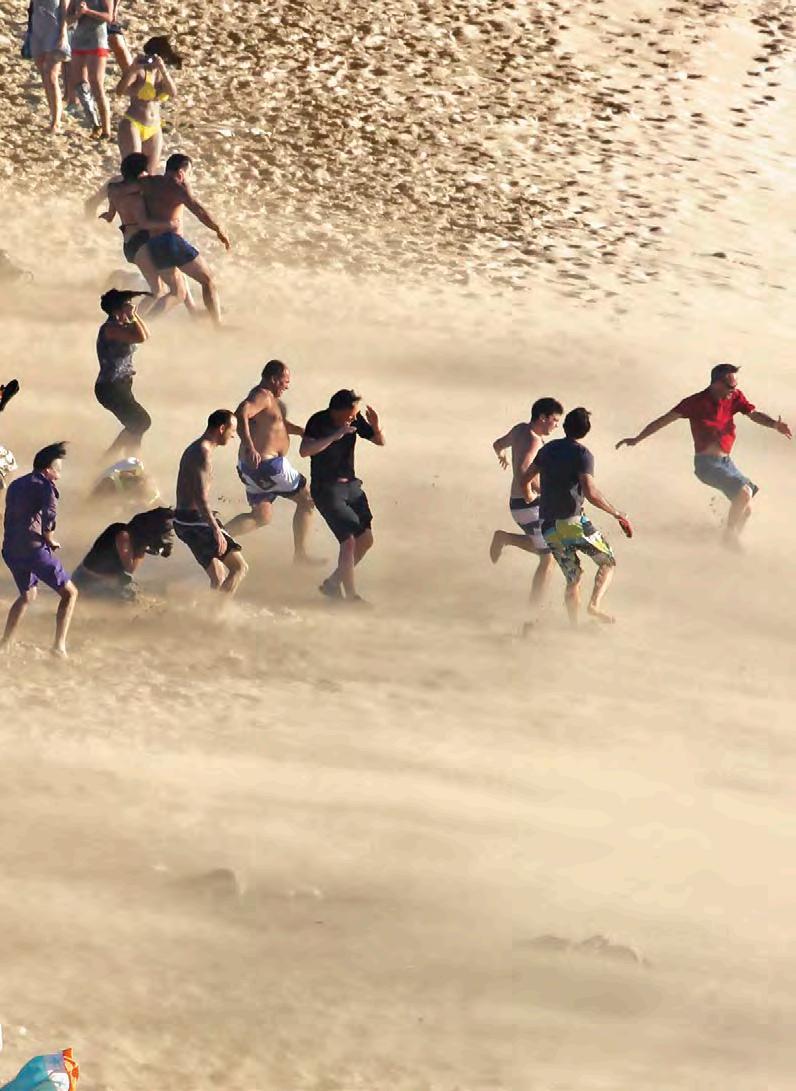
5 this spread: Fyodor Borisov. next spread: Kent Miller
see the world turn the page

6

...differently
Most people go to the beach to chill, but tourists who flock to Maho Beach on the Caribbean island of Saint Maarten go for thrills. Low-flying planes heading for the adjacent airport can actually blow sunbathers into the water (at least that’s what local government signs warn).
7
Write to Us
send us your stories, jokes and letters
We Pay...
£50 for the star letter and £30 for regular letters.
Email readersletters@ readersdigest.co.uk or go to readersdigest.co.uk/ contact-us

...and we pay
£50 for the true stories, anecdotes, jokes in Laugh! and You Couldn’t Make It Up…, and contributions to end-ofarticle fillers, Travel and Gardening Email excerpts@ readersdigest.co.uk or go to readersdigest.co.uk/contact-us
subscribe

* s ee p10 for details of call rates
Visit readersdigest.co.uk or write to: reader’s digest, Po Box 7853, ringwood BH24 9FH. UK: £45.48 a year. Republic of Ireland: €61.20 a year. Prices include delivery. For Gift subscriptions contact Customer services below
Customer Services
Contact Customer Services for renewals, gifts, address changes, payments, account information and all other enquiries.
Phone: 0330 333 2220* email: customer_service@ readersdigest.co.uk
Sorry!
We cannot acknowledge or return unpublished items or unsolicited article-length manuscripts. do not send saes. article-length stories, poetry and cartoons are not requested.

twitter.com/rdigest

Talking Magazines
reader’s digest is available in a talking edition for blind and partially sighted people for £16. For details, phone: 01435 866 102; email: info@ tnauk.org.uk, website: tnauk.org.uk.
Small Print
ensure submissions are not previously published. include your name, email, address and daytime phone number with all correspondence. We may edit letters and use them in all print and electronic media. Contributions used become world copyright of Vivat direct ltd (t/a reader’s digest).

facebook.com/readersdigestuk pinterest.com/rdigest
| 06•2014 8
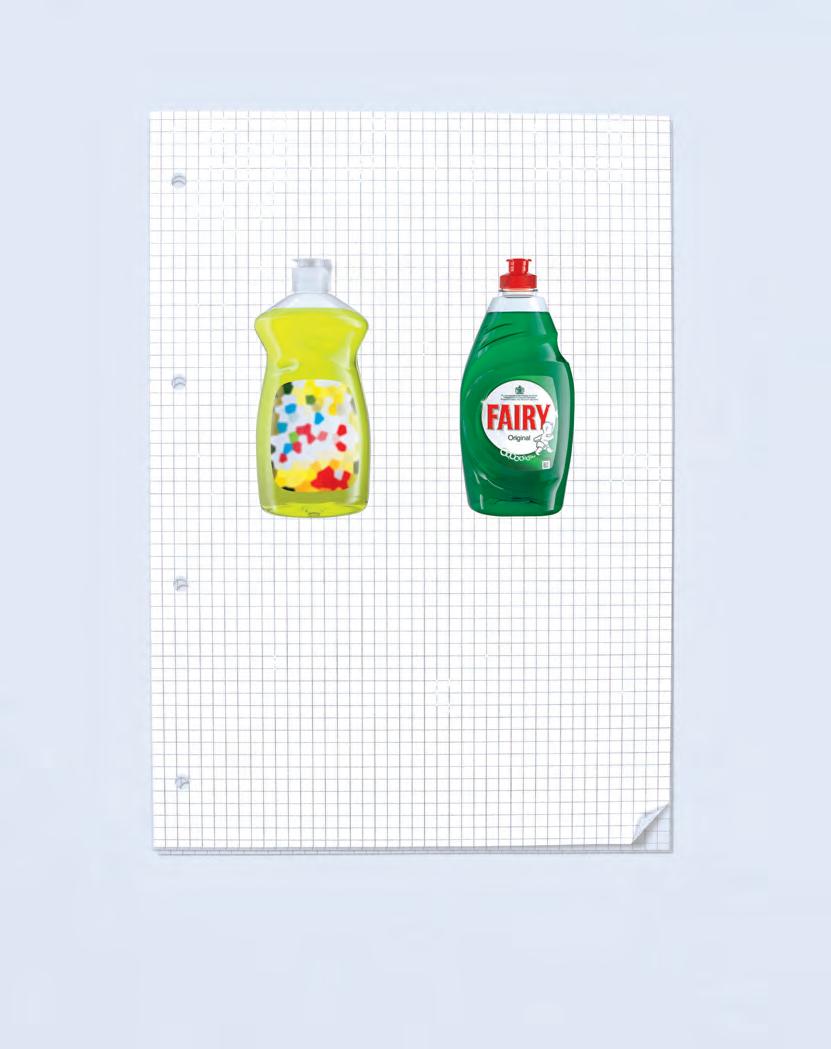







@readersdigest.co.uk
Your chance to Win £5,000! Looking for an easy way to win some extra cash? Look no more. If you take part in our daily online draw, you could win £5,000! It’s simple and free to enter—all you have to do is register; we’ll then send you a unique daily code, which you enter on our site, and your numbers will go into the draw! It really is as simple as that. What are you waiting for? Go to readersdigest. co.uk/prizedraw to get started!

£5,000 pricaSh Ze DraW
r D S h op Look out also for our fantastic new online shop. Go to shop.readersdigest. co.uk for all the best in DVDs, books and music CDs!





*Calls to 03 numbers cost no more than a national rate call to an 01 or 02 number and will be free if you have inclusive minutes from any type of line including mobile, b t or other fix ed line

| 06•2014 10
facebook.com/readersdigestuk pinterest.com/rdigest twitter.com/rdigest © 2014 Vivat Direct Ltd (t/a Reader’s Digest). British Reader’s Digest is published by Vivat Direct Ltd, 57 Margaret Street, London W1F 7JS. All rights reserved throughout the world. Reproduction in any manner, in whole or part, in English or other languages, is prohibited. Reader’s Digest is a trademark owned and under license from The Reader’s Digest Association, Inc, and is registered with the United States Patent and Trademark Office. All rights reserved. Classified advertising by Madison Bell. Printed by Polestar Chantry, Polestar UK Print Ltd. Newstrade distribution by Seymour Distribution Limited. PAPER FROM SUSTAINABLE FORESTS
Visit Our Website f O r… CEO gARy h OP KINS ED ITORIAL Editor C AT h ERINE h AU gh NE y Sub -Editor TOM B ROWNE Ar t Editor h U gh K y LE ADVERTISING Advertising Director S IMON F ULTON simon.fulton@readersdigest.co.uk 0203 701 5936 Account Director P EVIN PATEL pevin.patel@readersdigest.co.uk 0203 701 5935 MARKETING Operations Director JU LIE L EAC h Com mercial Director ST EVE KIN CAID Th E R EA DER ’ S D IG EST A SS OCIATION I NC (USA) Chairman of the Board RO BERT E g UT h President and Chief Executive Officer B ON NIE K IN T zER Vice President, Chief Operating Officer, International BRIAN KENNEDy Editor-in-chief, International Magazines RAIMO MOySA cuStomer ServiceS 0330 333 2220*
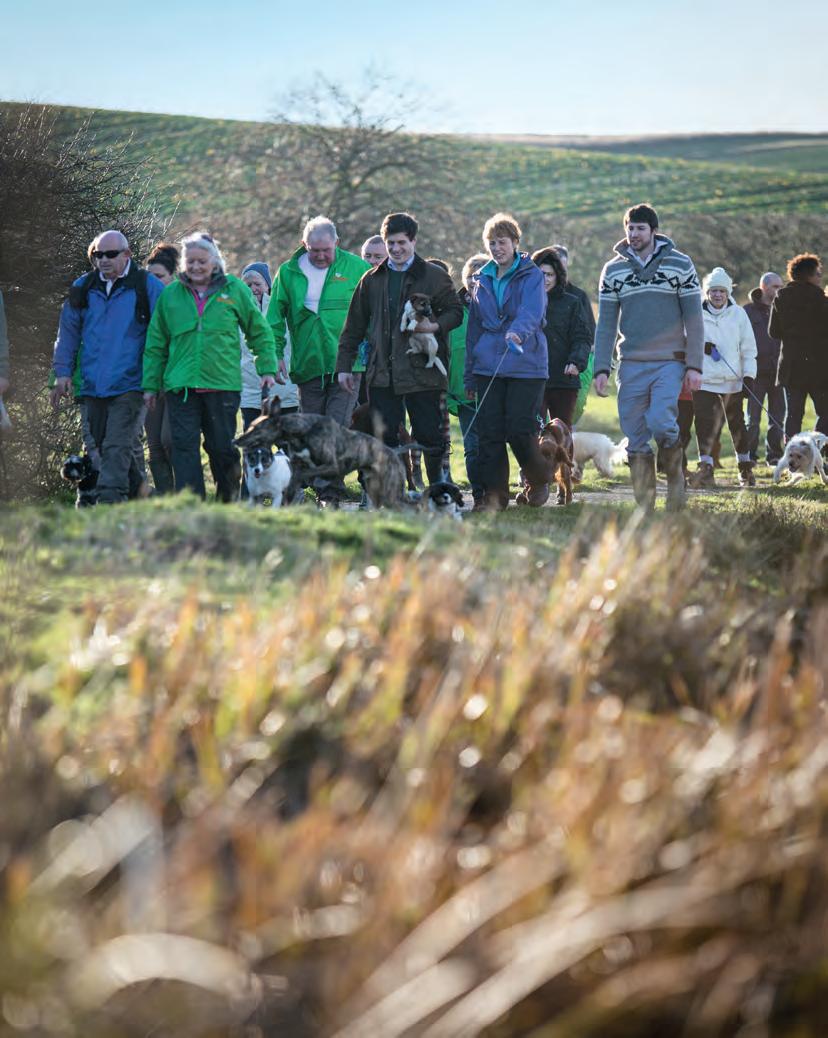

Lower your cholesterol in 3 weeks.
If they can, you can.

The people of Rutland came together to prove that even the smallest community can make a big difference. Through a combination of exercise, a healthier diet and Flora pro.activ, 82% of those who completed the challenge in Rutland lowered their cholesterol *






Join the journey by going online and searching Flora pro.activ and get your 3 week challenge pack. floraproactiv.co.uk






*82% of 69 participants. Individual results may vary. Flora pro.activ contains plant sterols. Plant sterols have been shown to lower blood cholesterol. High cholesterol is a risk factor in the development of coronary heart disease. Consuming 1.5– 2.4g of plant sterols per day can lower cholesterol by 7– 10% in 2– 3 weeks when consumed as part of a healthy diet and lifestyle with sufficient fruit and vegetables.













Over to You
✯ Letter of the month...
Well said, Seumas Milne!
His “Maverick” article is spot on about current privatisation practices— worse pay, conditions and job security for employees, and massive benefits for those at the top. It’s logical that anything with tax revenue put into it should become taxpayer-owned; future pensions could be funded from the revenues, instead of supporting wealthy individuals.
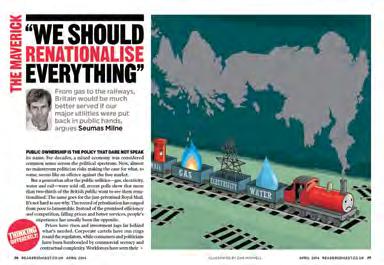

If private is better, how come the highly profitable mobile-phonenetwork coverage is so dire? And it’s truly shocking that the water companies have gone from having no debt when founded to almost junk-bond status today, and are spending no more now on investment than when under state ownership, despite charges increasing and huge profits being paid out. ken Mills, by email
...not a goLden age?
I don’t agree with Seumas Milne.
I remember the sort of service you used to get before state monopolies were sold off, and it was very poor.
I once had to wait 13 weeks to get a phone line installed, and it cost me nearly a week’s wages—all because the Post Office were the only ones
by law allowed to do it. Now I can pick the company that gives the best service at the cheapest price.
If we returned the utilities to state ownership, we’d be back in the dark old days of overmanning, rude and inefficient staff, and high prices due to lack of competition.
andreW berrY, Lincoln
06•2014 | | 13
LetterS oN tHe APrIL ISSue
a positive impact
I found “A Life Less Ordinary: More Than a Game”, outlining the work of nurse Marcus McGilvray, a truly inspiring story.
It’s easy to think that one person can’t make a difference, yet here is a clear example that one person can change the lives of others for the better. His ingenious idea of combining football with medical treatment in a way that engages with young people and overcomes the stigma attached to HIV is really creating a brighter future for South African children.
claire bradford, Surrey
having a voice
I was delighted to read your item “How to be heard” in “1,001 Things”, especially as most people know very little about their voice.
It’s certainly true that breathing deeply can make your voice louder, but unfortunately this isn’t easy to do. If your voice is quiet, there’s usually a physical or psychological reason for this. The way we breathe is habitual, so changing the pattern takes a lot of time and practice. Very often, a quiet speaker will react negatively to the louder sound when it’s first produced, and a lot of reinforcement and
support is needed to change the perception that they are shouting.
Anyone wanting help should visit voicecare.org.uk.
Priscilla Morris, Leicestershire
good exposure
“Good Bacteria, Good Health?” raised serious questions about whether or not we’re too wary of germs. I know I was with my own children, but I realise now that our bodies need to be exposed to germs in order to boost our immune systems.
Of course, this doesn’t mean we need to live in filth, but it’s reassuring to know that our immune system helps us fight off many illnesses and allergies—and the earlier the exposure, the better.
shula clarkson, Norfolk
out of reach
I’m a keen cyclist, so I was interested in the LED lighting system that can be integrated into your bike’s wheels, as featured in Olly Mann’s “Gadgets” column. This is a great new invention, but at £399 it’s unfortunately far too expensive for me.
I hope one day it becomes more affordable, because it would certainly increase safety on the road.
kira aitkins, Wirral send
over to you | 06•2014 14
to
letters
readersletters@readersdigest.co.uk
include your full name, address, email and daytime phone number. We may edit letters and use them in all print and electronic media. We Want to hear froM You!
We pay £50 for Letter of the Month and £30 for every other published letter Please
Every year thousands of people put their faith and trust in Cats Protection when looking for a new addition to the family.
Behind each volunteer and member of staff is a wealth of experience and expertise which means when you adopt one of our cats, you can feel safe in the knowledge that he has been given the best possible care.
When he leaves Cats Protection, your cat will have been treated to a top-to-tail medical.
This means he will have been:
• Fully examined by a veterinary surgeon
• Vaccinated at least once against flu and enteritis
• Treated against fleas, roundworm and tapeworm
• Neutered if old enough
• Microchipped

We also provide four weeks’ free insurance (terms and conditions apply) giving invaluable peace of mind and reassurance as you and your cat embark upon this lifelong friendship.
All he needs now is a loving home to make his dreams come true – over to you!

Find a Cats Protection cat looking for a home in your area. Simply scan the QR code with your smart-phone to use our new find-a-cat search tool, or get in touch on the details below. Thank you.
T: 03000 12 12 12
E: helpline@cats.org.uk
W: www.cats.org.uk
Reg Charity 203644 (England and Wales) and SC037711 (Scotland)
How a glimpse of a Yorkshire valley led James Brown to a weekend of hillwalking and Sports Mixture
Back on the Road Again

James, founder of Loaded magazine, now edits Sabotage Times—an online magazine with the motto: “We can’t concentrate, why should you?”
They say you shoulD N e Ve R g o back, but I think they’re wrong. You should definitely go back—if the “back” in question is a shockingly beautiful and totally unexpected road you had to bomb along under a time restriction and didn’t have time to stop and explore. You should always go back to somewhere you think is stunningly beautiful. That surprises you. That calls you back.
This time last year I was racing from the Lake District across to the A1 when I drove along a route into the Yorkshire Dales so stunning I couldn’t believe I hadn’t seen or heard about it. I pulled out of a town called Sedbergh with a huge hill towering over it and took a sharp right turn, following the old road sign pointing to Hawes.
What looked like one of those lovely tiny windy roads with canopies of trees suddenly opened into an amazingly wide and impressive valley. It was tailor-made for soaking in the Dales or hosting a motorbike race. The raised road that bumped up and down along the bottom of the valley felt in parts like the TT track on the Isle of Man. We were through it and into Hawes in 20 minutes, but the impression was so lasting that when my 12-year-old son recently asked if we
| 06•2014 16
cheerful
reasons to be
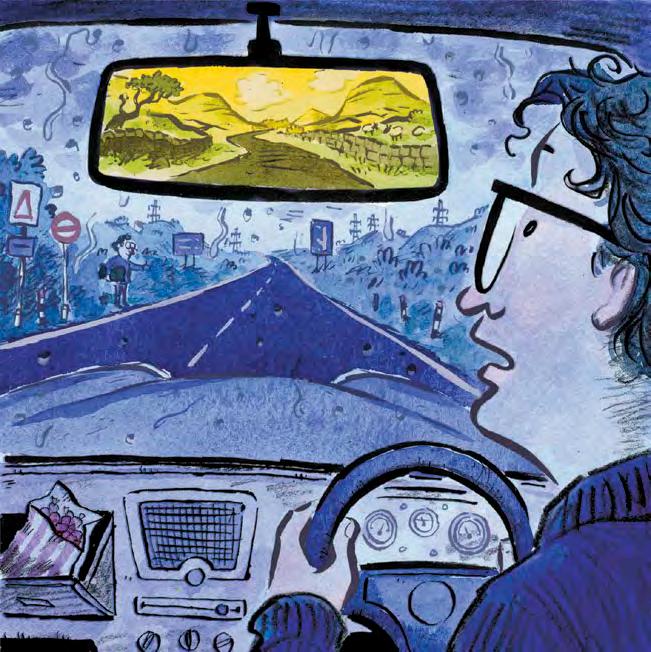
could go and climb some mountains, I knew we wouldn’t have to go as far as the Lakes. Sedbergh would be our destination.
I D o N’ T k N ow a bou T you, but as I’ve got older I’ve developed a fear of not knowing where I’m going to stay at night. Maybe it’s because I’m a parent; maybe it’s because I just don’t want any unpredictability any more. I like to know I’ve got a destination, otherwise I’ll get to a place and my
inability to choose will mean I’ll spend an afternoon worrying and wondering which place to book.
I solved this by booking a little b&b called The Blue Pig in Kirkby Lonsdale. I figured if they’d gone to the effort of calling it something like that, they’d probably also care about how much you’d like it when you got there. I wasn’t disappointed.
Something else that struck me was how many bags I feel the need to pack nowadays, compared with when I was
illustrated B y tom plant 06•2014 | 17
18. I used to set off in the clothes I stood up in and disappear on tour with a band for a few days to sell my fanzines. Back then, it would be one bag full of magazines, a thumb out by the side of the motorway, or a spot in the back of a van with the guitars. Now it’s four bags—wet weather, cold weather, warm weather all catered for—a big car and a b&b with a nice couple looking after us.
We moved on to Sedbergh, stocked up with bags of oldfashioned sweets, and after scouring a few of the town’s second-hand bookshops set off up the hill to the fell behind the town. I’m not sure of its name, but it’s about 1,700 feet high and I felt every one of them. Ten minutes in, I was lying on my back sunbathing while my son thankfully went and photographed a waterfall. It didn’t matter how many Sports Mixture sweets I ate, I didn’t feel any fitter.
Bay. I tried to explain to my son that all the years you spend planning things or putting things off probably aren’t worth it, and every minute in your life is your life.
“All the years you spend planning things or putting things off probably aren’t worth it”
“It doesn’t get much better than this,” I simplified, but he pursued me as 12-yearolds do. “Yes, there are more exciting times, but your life is what you live as you live it, not what might happen in the future.” I probably need to get a Dennis the Menace annual where he explains Buddhism to get my point across properly.
“The first quarter is the hardest,” explained my son Marlais. “That’s when your body’s getting used to it.” I don’t think he can comprehend the difference between my 48-year-old body and his.
When we’d finally reached the top we could see the Three Peaks, the Lakes and the sea in Morecambe
we Took The caR aND weNT back down the road. I’d booked into a place called Simonstone Hall by Hawes, not only because it looked nice but because the man who answered the phone had said, “Excuse me, I’m just talking to myself.” I knew exactly how he felt. The other night, my girlfriend came down at 1am and asked me who I was talking to in the kitchen. I looked around and said, “Me, I was trying to work something out.”
When we got to Simonstone Hall, the man I’d spoken to on the phone showed me some lovely rooms and his boss agreed to give me a discount on the best one. I didn’t need it, but I felt I had to show Marlais that those
| 06•2014 18 Rea S on S t o be c H ee R ful
negotiation tasks we’d watched on The Apprentice hadn’t gone unheeded.
And that’s where we are now.
Dinner was great—posh fish ’n’ chips with tempura batter. Next morning we see that the view from the room looks out over the garden, the fields to Hawes and beyond—up Yorkshire hill and down dale. There are 18 tall trees in the garden, but the robin has chosen to sit on an old moss-covered knee-high statue of a lady. In the field, lambs are bouncing around.
Hawes, home of Wensleydale cheese and location for the filming of the James Herriot TV series All Creatures Great and Small , anchors the view. It’s not going anywhere. It’s solid grey stone, surrounded by green fields with walls that look like badly drawn felt-tipped squares. It’s one of the most beautiful views in the Yorkshire National Park, and that’s saying something.
You should always go back. In fact, maybe you should stay.
budding authors, take a bow!
this melancholy tale was one of thousands submitted to our 100-Word-story Competition. We’ll be publishing a commended story every month.
the Mitten
I hastened through the park that day, collar up, head down against the driving rain. trees tossed their autumn leaves on sodden grass and puddled pathways. the distant cry of a bird carried on the wind and the empty seat of a swing rocked back and forth, back and forth.
I saw it then. Knitted in stripes of blue and white. a child’s mitten. forgotten in fun perhaps or dropped in a fleeting moment? I paused, then placed it on a nearby bench and hurried home.
I couldn’t have known, they all said later. but doubts will always haunt me. submitted by diana morrissey, taunton, somerset

diana says: “I began writing adult short stories and children’s stories in rhyme in 2001 after a gap of 33 years, and have enjoyed occasional success in competitions. I’m particularly fascinated with crime and the part that fate so often plays. The idea for my story was conceived while passing the gates to Vivary Park, Taunton, on a wet winter’s day.” diana will receive a cheque for £50
r eader’s d iges t 06•2014 | 19

Why go another day without room-filling sound?











Wave® music system III



Music. As it was meant to be heard


The Wave ® music system III reproduces music with the highest level of accuracy we’ve ever attained in a system this small. You’ll hear details you’ve never notice in songs you know by heart, feel the fullness and power of bass notes, and experience clarity in the highest frequencies. Exclusive Bose ® waveguide technology allows this compact system to deliver room-filling sound with depth and definition.
The features you want
The system’s front-loading CD player and digital DAB/FM/AM tuner offer you two ways can enjoy all kinds of music in all kinds of places.to experience your favourite music, while the digital display shows track information as you listen. Touch-top controls turn the system on, off and snooze the alarm, and the slim, credit-card sized remote offers

one touch control of all the system’s functions. And being compact, the Wave ® music system III fits neatly just about anywhere – so you can enjoy all kinds of music in all kinds of places

Hear it for yourself, risk-free
We believe the best way for you to appreciate the Wave ® music system III is to experience it in your own home. So call now and listen for 30 days without risk or obligation. Why wait any longer? Hear for yourself why Bose is one of the most respected names in sound.

Easily play music from your iPhone/iPod on your Wave ® music system III. Limited offer valid until 30th June 2014. iPhone not included.
✓
✓
* Wave® III dock not compatible with iPhone 5 or iPod shuffle. Apple inc. is not participating in this promotion.
** Payment plan is available on credit/debit cards only and is subject to status. An initial deposit is due at the time of order and all payments will be charged to your credit/debit card. If the product is returned, the deposit is fully refundable. There will be no interest charges from Bose. In the event of late payment, credit/debit card company interest charges may apply. Deliveryis subject to product availability, clearance of payment and security checks and can be up to 10 days from when Bose receives the order. Price/Payment plan / Offer subject to change without notice. Free shipping offer applies to UK standard delivery only. Risk free refers to 30-day home trial only.
All rights
Wave®
distinctive
registered trademark of the Bose Corporation in the U.S. and other countries. The Bluetooth® word mark is a registered trademark owned by Bluetooth SIG, Inc., and any such use by Bose Corporation is under license. iPhone and iPod are registered trademarks of Apple Inc. Registered DAB Digital Radio used with permission of Digital One Ltd. Registered in England no 1187672. Registered Office: Bose Ltd., Bose House, Quayside, Chatham Maritime, Chatham, Kent, ME4 4QZ Find out more about our:
30 day risk-free home trial, with no obligation
Easy payment options - 0% interest charges from Bose**
©Bose Corporation 2014.
reserved. The
music system’s
design is a
✓
✓
FREE shipping to your home
Not delighted? FREE return shipping To order or to learn more call free ✆ 0800 901 2565 today quoting reference 40149 Mon-Fri: 9.00am – 6.30pm Sat & Sun 10.00am - 5.00pm Or for a free information pack Text ‘Bose40149 to 84118 Visit: www.bose.co.uk/wms Shown in Titanium Silver. Also available in Graphite Grey and Platinum White.
FREE WAVE® III DOCK* FREE WAVE® III DOCK WITH PURCHASE
What’s On in June
In Cinemas
DraMa: GRACE OF MONACO French director Olivier Dahan previously tackled the life of Edith Piaf in the Oscar-winning La Vie En Rose, and now he turns his attention to the similarly iconic Grace Kelly, played here by Nicole Kidman. Rather than a complete biopic, the film focuses on 1962, six years after Kelly’s marriage to Prince Rainier III (Tim Roth) and her relocation to Monaco, and explores the tensions of her marriage and position during Rainier’s dispute with French president Charles de Gaulle.
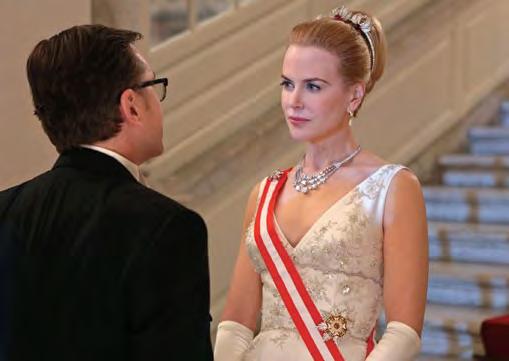
CoMeDy: MRS BROWN’S BOYS
D’MOVIE
The journey from the small screen to the cinema is not always smooth, but the huge popularity of BBC1’s Mrs Brown’s Boys guarantees a decent audience for this outing. Outand-out silliness from Brendan O’Carroll and co is guaranteed, as Mrs Brown battles against a developer threatening to shut down her market stall.
heartwarMing:
THE YOUNG AND PRODIGIOUS T S SPIVET


Based on the novel by Reif Larsen, this film follows the adventures of a 12-yearold cartography enthusiast as he goes on a journey across the US to collect a prize at the Smithsonian Institution for his discovery of the “perpetual motion machine”. Helena Bonham Carter and Judy Davis co-star.

06•2014 | | 21
DAVID KOSKAS/THE WEINSTEIN COMPANY
entertainMent
Nicole Kidman plays it cool as Princess Grace
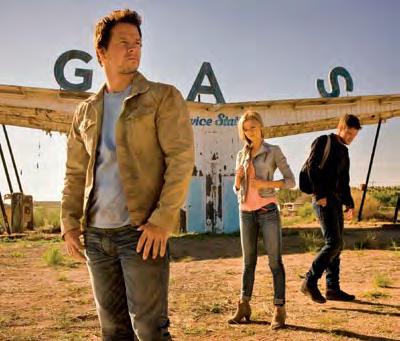
Big BuDget: transforMers: age of extinCtion For those of you who crave yet more robots thumping each other at ear-splitting volume, the fourth instalment of director Michael Bay’s hugely successful action franchise has arrived. Mark Wahlberg and Nicola Peltz head up an all-new cast, which fights alongside the Autobots against the terrifying Decepticons.
Our Pick of the DVDs
JaCk ryan: shaDow reCruit
Kenneth Branagh directs and stars in this good old-fashioned spy thriller, which also features Chris Pine as the latest actor to play the legendary CIA agent. Keira Knightley co-stars.
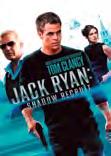

Dallas Buyers
CluB Loosely based on the life and experiences of American Aidssufferer Ron Woodroof and featuring unmissable Oscarwinning performances from Matthew McConaughey and Jared Leto.
TV Highlights
Look out for... the honouraBle woMan (BBC2), an upcoming spy thriller starring Maggie Gyllenhaal, Stephen Rea and Lindsay Duncan.
On Your Radar Lucy Vann, artist
Watching: Gogglebox (Channel 4) I’d rather watch people watching telly than anything actually on it.
Reading: Reasons for Knocking at an Empty House by Bill Viola A collection of the video artist’s notes, diaries, drawings and essays—I’m always picking up books to inform and inspire my own work.

Online: themancorialist. tumblr.com A Manchester version of the fashion website
The Sartorialist. I used to live there and have a bit of a soft spot for the place.
listening: Salad Days by Mac DeMarco His songs are really sexy and laid back, and he’s pretty funny on stage too.
PARAMOUNT PICTURES | 06•2014 22
what’s on in june

Official fuel consumption figures in mpg (l/100km) for the Ford B-MAX Zetec 1.4 90PS shown: urban 35.8 (7.9), extra urban 57.7 (4.9), combined 47.1 (6.0). Official CO2 emission 139g/km. The mpg figures quoted are sourced from official EU-regulated test results (EU Directive and Regulation 692/2008), are provided for comparability purposes and may not reflect your actual driving experience. *Nil Advance Payment available only on Ford B-MAX Zetec 1.4 90PS. This programme is subject to the standard conditions of the Motability 3-year Contract Hire Scheme. Full written details and quotations available on request from a Ford Authorised participating

(Registered Company No. 1373876),
Gate
SE1 9HB. Applications must be received and accepted between 1st April and 30th June 2014 by Motability Operations Ltd. FORD B-MAX ZETEC
rear parking
ingenious side
you
clear access
just Nil*Advance
To see what everyone’s talking about, visit ford.co.uk/motability 0845 60 40 019 FOR JUST ADVANCE PAYMENT
dealer of Motability Operations Limited. Under the Scheme the vehicles are leased from Motability Operations Limited
City
House, 22 Southwark Bridge Road, London
with free
distance sensors and
doors that give
1.5m of
available from
Payment.

A thoughtful, artistic, international man, there’s rather more to Viggo Mortensen than the usual Hollywood star
GlobalCitizen
By B enji wilson
entertainment
24
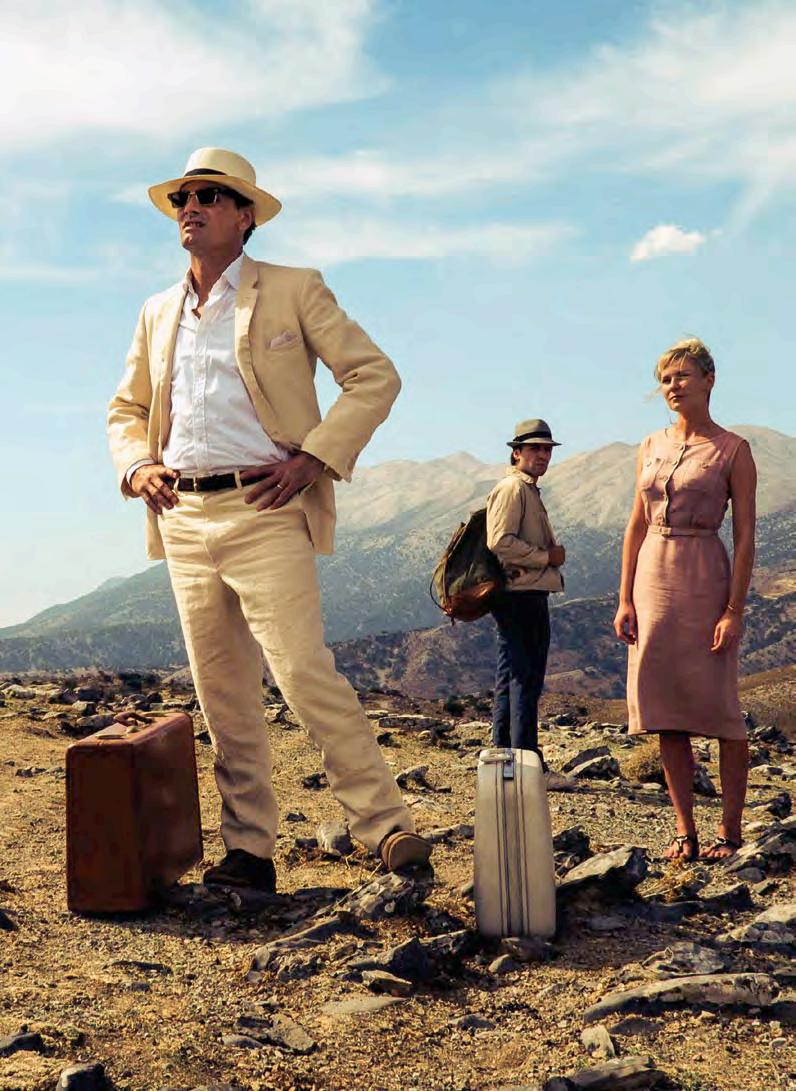
Hero or villain? Viggo
Mortensen with Oscar Isaac and Kirsten Dunst in new film The Two Faces of January
It was only a casual quest I on about the world cup this month, the sort of thing one bloke might say to another in a pub to fill a void. But the bloke with me at the Covent Garden Hotel in London today is the actor Viggo Mortensen—and Mortensen is a man who takes things seriously. He furrows his brows, sharpens those piercing eyes and ponders deeply.
“I mean, I’d love to see Argentina and Brazil in the final, and Argentina beat Brazil. I’d like to see England do better than they have, because they should have done better the previous time, but so should Argentina, at least in the last several World Cups. I’d like to see Wayne Rooney have an amazing World Cup because he’s never had that, nor in the European Championships either. He’s never shown the promise. Well, he was pretty good in Portugal…”
And so on.
It’s obvious that Viggo knows a lot about football. But then he knows a lot about a lot of things. And the films he’s made—from The Lord of the Rings to the big-screen adaptation of Cormac McCarthy’s The Road —mark him out as a man who goes wherever his many interests take him. The unpredictability goes beyond just his film choices too—sometimes he chooses not to do films at all. He publishes his own poetry, he makes
music, he sells his own artworks. He, it barely needs to be said, isn’t your standard-issue Hollywood lead: Viggo is a man apart.
His new film The Two Faces of January is all part of the trend of there not being a trend, and it captures two faces of Viggo Mortensen.
“I think the more places you go, the more chances you have to be objective about other cultures, and that’s a positive thing”
Based on a little-known and—by Viggo’s description—a not particularly good Patricia Highsmith story, it’s a taut thriller set around Europe in the early 1960s. Viggo plays an urbane American businessman called Chester MacFarlane, who brings his glamorous wife (Kirsten Dunst) to Athens for a holiday, but gets involved with a scamster called Rydal— and murder. It means Mortensen gets to play both a chiselled-cheeked charmer and a man on the make in the same film, and sometimes in the same scene.
“It’s always more interesting to watch a character’s mask come off, isn’t it?” says the 55-year-old, with a half smile.
| 06•2014 26 glob A l citizen

more interesting to watch a character’s mask come off”
t hat people have many d I fferent masks, different faces for different places, is something that Mortensen understands implicitly. His mother is American and his father is Danish, an agricultural manager. Viggo was born in New York, but his father’s work took the Mortensens to Argentina when Viggo was three years old. Then, when his parents divorced, he, his mother and his two younger brothers returned to America, near the Canadian border in upstate New York.
“My brothers and I spoke only Spanish and it was 1970, so there was no TV or radio in Spanish, no internet, no cable and no Argentine football any more. But you quickly adapt.”
The young Viggo started speaking
French; they weren’t far from Quebec. “And I swapped my football team with the Montreal Canadians hockey team —they have the same colours.”
Even today, having also spent years in New Zealand filming The Lord of the Rings , and now resident in Spain, he struggles to name one place as “home”.
“There are some places—Argentina, because it was [where I spent my] childhood—I’m very much at home in. But I don’t feel the same walking around New York. I don’t know. I think the more places you go, the more chances you have to be objective about other cultures, and that’s a positive thing. I think that probably, as a result of moving around and [having] different cultural influences, I’ve always felt
06•2014 | 27 ANDREW LINNETT/STUDIOCANAL-W OR k IN g T ITLE
Viggo as Chester MacFarlane: “It’s always
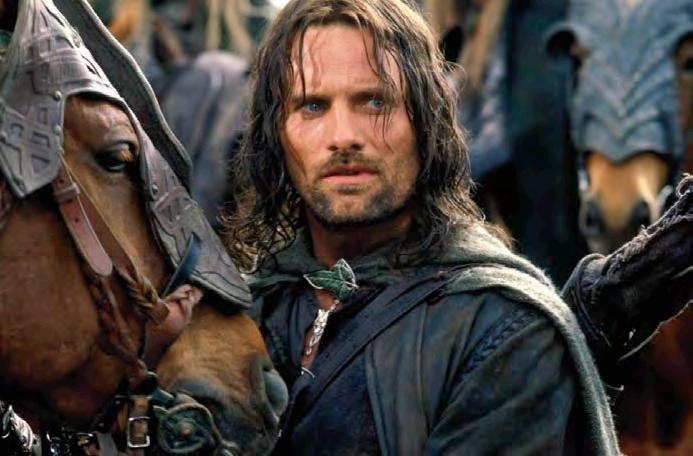
that in every moment, in every place I was, there was some sort of displacement. It’s not necessarily a bad thing. It keeps you open-minded, I think.”
From his past, you can see why Viggo has an interesting relationship with the US—he’s tied to the country by family and work, yet simultaneously stands at one remove from it, a Chester MacFarlane figure who might be one thing, might easily be another.
t he I dea of a mer I cans as both heroes and villains runs right through The Two Faces of January , and it was one of the things that drew Mortensen to the role.
“In post-war America, Americans liked to think of themselves in the John F Kennedy/Jackie O mould—the glamorous, the good people. And I think that’s how Europeans, by and large, looked at them too. There was still that
afterglow of them having been the nice guys in the Second World War. That changed once people started shooting politicians…Martin Luther King… Robert Kennedy, and certainly the corrupt presidents like Richard Nixon. It’s different now; it’s a different world.”
As you might expect from a polyglot poet, Mortensen prefers subtlety to brash, bold statements—he’s softly spoken, scrupulously polite, thoughtful and serious. He likes the fact that The Two Faces of January doesn’t shout too loud.
“Even though we were in iconic locations, one of the things I enjoyed is that they didn’t try to make a big deal of it. The Talented Mr Ripley [Anthony Minghella’s Highsmith adaptation] had sort of the opposite approach. There was good acting and storytelling, but it was like, ‘Let’s make it clear that we’re in these well-known places.’ ”
| 06•2014 28
Alter ego: playing Aragorn in The Lord of the Rings
Still, The Two Faces of January doesn’t do too badly for settings. The film opens in the Acropolis, where Chester and his wife later meet Rydal, and it’s among the crumbling columns of the Parthenon itself that we first catch sight of Mortensen and Dunst. Remarkably, says Viggo, first-time director Hossein Amini was allowed to set up his camera right in among one of the most important sites of antiquity. The only snag? They weren’t allowed to stop other visitors from wandering into the background.
“When we had to shoot, we had to work quickly. Some people were nice; others not so much. They’d say, ‘I’m not moving! I’m here on my holiday!’ ”
himself in the thick of anti-government protests, a result of the parlous current state of Greece’s finances.
“I was in both Turkey and Greece for this film, and at that point Turkey was doing better than almost anywhere else in Europe, so the contrast between the countries was stark.”
He’s unequivocal about who’s to blame for the recent economic chaos in the world.


Viggo gives an eyebrow raise that, if I’d been that reluctant tourist, would have sent me running for the hills. Evidently they hadn’t seen him kill a man in a sauna with his bare hands, in the nude, in David Cronenberg’s Eastern Promises.
t he tour I sts weren’t the only ones staging a demonstration in Athens at the time: Mortensen also found
“It’s largely due to corruption, and corruption of politicians and bankers. Wall Street—that’s what started this whole mess. We’ve found ourselves here because of the impunity that people in places of power have: people who are thieves.”
It’s tough talk and once again it reflects his ambivalence towards the US. Viggo may be a part of the Hollywood film industry, but you sense he likes to keep it at a safe distance. He says that critics—“maybe north American critics”—might not think The Two Faces of January is “flashy enough”. And he has barely concealed disdain for the blockbusters churned out by big studios.
“It’s obligatory to have big fight
06•2014 | 29 r eader’s d iges t
…and a criminal alongside Vincent Cassel in Eastern Promises
PETER MOUNTAIN/f OCUS f EA TURES ; M A CALL P OLA y/D IMENSION fILMS
As a devoted father in The Road …
sequences, elaborate special-effects sequences, chases and loud actiondriven sequences that may or may not move the story forward, or may go on a bit too long, but they’re cool. It gives you great material to make trailers from and to sell to certain age groups. You don’t see that many classy, subtle, classically shot movies: films that really respect the audience’s intelligence and let them find things in there.”
The Two Faces of January is, he’s suggesting, precisely that kind of movie.
“A film like this is packed with literary, mythological and film references, yet doesn’t underline that. You see them or you don’t, but it’s not essential. They’re there if you want to enjoy them on repeated viewings. The studios claim that people want blockbusters, but I think people go to the multiplex and watch what’s available.”
that m I ght seem a l I ttl e r I ch coming from the man who starred in possibly the biggest fantasy movie franchise of them all, The Lord of the Rings , complete with big fights and elaborate special effects. But then, looking at his upcoming schedule, you
could never accuse Viggo Mortensen of taking the easy money.
Alongside The Two Faces of January he has a French film Far From Men, set in Algeria, for which he had to learn Arabic. That’s followed by an as-yetuntitled film he made in Argentina that he says has “literally almost no budget”.
“I don’t shy away from big-budget movies. I’m just looking for good stories. But once I’ve committed to a project or a director, I stay loyal. Some people, a big-budget offer comes along and they go, ‘Well, sorry, guys. I’m gone.’ I like to pick someone and stick with them.”
Except, of course, when it comes to football, and which World Cup team he’s going to follow.
“…Uruguay, I think are great. If it’s Uruguay and Brazil in the final, I’d love to see Uruguay do it again, like in 1950. I mean, I’d like to see anybody beat Brazil. That’s because I was raised in Argentina, and if Argentina isn’t in it, I’d like to see Spain have a rematch with Brazil from last year, and…”
The Two Faces of January is in cinemas now.
How did t H at get H ere?
Recently, as i was wandering around a local market town, i saw an advertisement in a shop window that said: “electric chair, five years old, in very good condition. £50 or near offer.”
capital punishment is clearly no longer practised in this town.
many tHanks to joHn ward of york for sending tHis in
| 06•2014 30
glob A l citizen










Irvine Welsh
“I Remember”
…saturday-morning matinees. I was born in Leith, but we moved to the prefabs in West Pilton in Edinburgh when I was three or four—which is my first, big, pre-school memory! From there, we went to a housingscheme maisonette in Muirhouse, and that’s basically where I grew up.

Even though it seemed exciting to move to the “big city”, I still saw Leith as my town. All my aunties and uncles lived there and, of course, there was the State Cinema. I loved going to the Saturday-morning shows—a couple of cartoons, a Western or, if you were really lucky, a Bond film. That was a perfect weekend for me; getting fed by my relatives, then watching Dr No.
…going to my first hibs game. They were playing Motherwell, it was 1968 and I think Hibs won 2–1. Two
weeks after that, I went to see them against Kilmarnock; a 3–3 draw that blew my tenyear-old mind. It was endto-end stuff, with Colin Stein scoring a hat-trick for Hibs.
Everybody wants their local team to play well, but, sadly, Hibs don’t always live up to my expectations. The thing about football, though, is…well, have you heard that saying about pizza and sex? Even when it’s not that good, it’s still brilliant. For me, watching Hibs is like that. It’s more than winning and losing. It’s a chance to head back over to Leith and see my mates; to rub shoulders with all these different people who only come together because of football.
…getting up to all sorts of nonsense at school. My main school was Ainslie Park High in Pilton. I enjoyed the actual act of being

entertainment | 06•2014
32
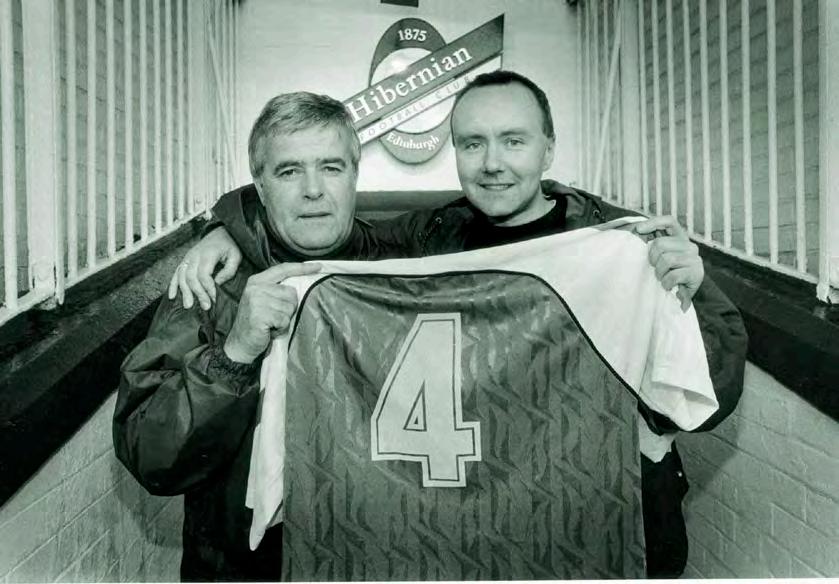
there—hanging out with all my pals— but I wasn’t much use once I got inside the classroom. I just didn’t have the attention span. My mind was always off somewhere else.
In a strange way, though, it was having a laugh with my pals that probably sowed the seeds of me being a writer. Joining in with the older kids and getting up to all sorts of stuff, listening to them tell their stories. I grew up with people who were way better
storytellers than I’ll ever be, but they’d never think of putting pen to paper. Instead, I just watched these theatrical performances behind the bike sheds and they eventually became the fuel that drove my own stories.
… calling my self W or K ing cl ass . Some people have had a go at me for becoming part of a so-called middle-class industry like writing, but
06•2014 | 33
Football crazy: Irvine Welsh meets ex-Hibs hero Pat Stanton (left) at Easter Road in 1997
Stan Hunter/t S pl/writer picture S
my dad was a docker and I’m proud of my roots. The area I grew up in was full of people like him who worked for other people, worked hard and put their feet up at the weekend. When those jobs were destroyed in the 1970s and 1980s, places like Muirhouse went from being working-class areas to being perceived as ghettos. And that’s when you started getting all the problems with HIV and heroin.
I enjoyed growing up in Muirhouse and I still think it’s a good place to live. Some of my oldest friends are still there. Yes, there are problems, but you’ve only got to look at what happened during the search for that poor lad Mikaeel Kular [who also lived on an Edinburgh estate] to see the tremendous sense of community that’s always existed on those workingclass estates.
…trying t o re pair tel e V isions . I left school at 16 and took a course in TV repair. God knows what I was thinking! I was way too much of a space cadet to do anything technical. I stuck at it for a while, but we all went down to the pub one lunchtime and I foolishly started trying to do a few tests on a TV in the afternoon. I had my test meter in there, poking around and…suddenly, I got zapped! My pal had to knock the TV off the bench to stop me being electro-
cuted. I was taken to hospital and my left arm didn’t work properly for ages. Would you really want me coming to your house to repair your TV? Ha ha!
…becoming a junKie. As a young man, I was the kind of guy who was up for anything, and when it came to drugs I just wanted to get off my head. I started with alcohol and ticked every box until I got to heroin. I thought I was having a fantastic time, but I didn’t understand just how addictive and destructive it was.
Most of the junkies I knew back then had serious problems from their childhood, but my addiction was born out of sheer stupidity. Actually, that’s not true. I also lost my father in my mid-20s and I just didn’t have the emotional tools to deal with that. So I became a junkie.
Bob Dole actually referred to trainspotting during the 1996 US presidential campaign
The pain of that loss did eventually subside, but coming off heroin wasn’t easy. There’s a real, physical addiction that requires a strong reason for you to stay off the stuff. Young people still ask me for advice about heroin, but there’s not really much you can say. You can give all the speeches, but it’s very difficult to impart the idea of danger to a young person because they have no sense of their own mortality, no sense that they’re gambling with their life.
34
i remember
| 06•2014
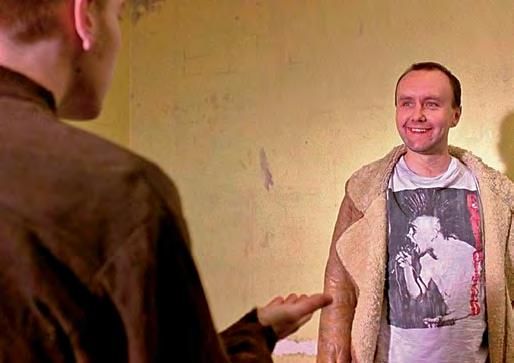
Irvine in a cameo role as a drugs dealer in trainspotting, alongside Ewan McGregor
knew me in London, so I could write songs or go to the theatre or a museum without anybody taking the p***. I felt like I was spring-cleaning my persona.

…mo V ing d o W n to london. I’d been going there since I was a kid—I had relatives down south —but in 1978 I finally made the move. I suppose it was punk that convinced me to do it. I was listening to the Pistols, the Clash, the Damned, plus the newer bands like 999 and Chelsea. We used to go and watch bands at the Vortex in Soho; I even played in a few bands and for a while I was convinced that was how I was going to make my mark on the world.
I was still getting into bother in London for petty, silly stuff, but the weird thing was that I was also finding a bit of calm. I got a job [at Hackney Council] and sorted myself out. I suppose I was reinventing myself. To some extent, I think we all do that whenever we move to somewhere new. Nobody
…Writing trainS p otting . At the end of the 1980s, I went back to Edinburgh and I also went back to college. I’d never thought of myself as a writer because, culturally, I’d never received what I’d call a writerly education. You just didn’t sit around at the dinner table discussing Shakespeare in your maisonette in Muirhouse. But my songs became short stories and they became longer stories and one of them became Trainspotting .
I thought it might do well locally, but I couldn’t see it selling outside of Scotland ’cos it was written in the vernacular. I was wrong! After the film came out, my life just went a bit hysterical. Bob Dole actually referred to Trainspotting during the 1996 US presidential campaign. Can you believe that? As a piece of PR, I couldn’t have asked for better. Suddenly, every kid in America wanted to read it.
r eader’s d iges t 35
06•2014 |
…falling in lo V e W i th my W ife . I met Beth in a bar in Chicago in…I think it was 2001. She’s much younger than me, much better looking, a horse-trainer and an American. It seemed like we had absolutely nothing in common. But somehow we hit it off.
When you fall in love with someone from a different country you nearly always end up having to get married, so we did—11 years ago. She’s still into horses and we’ve actually bought a couple. Yeah, I own horses. I wonder what Begbie would make of that!
When you fall in love with someone from a different country you nearly always end up having to get married
On top of all that, I think there are already too many people in this world. I don’t really want to add to that number.
… realising edinbur gh W il l a lWay s b e home . I’ve lived in some really amazing places — Dublin, London, Chicago, Miami… I spend a lot of time in LA. I’ve lived in America for about six years now and I feel like I’ve got my feet under the table—but, emotionally, Edinburgh is the place where my heart belongs.
… deciding i did n ’ t Wan t to haV e chil dren . You don’t wake up and think, “OK, I won’t have kids”. It’s just something that happens. I think I’m too old. I’ve got lots of friends around my age who are becoming parents for the first time—they’ve done everything else in life—but I’ve never felt like that. I’m not unhappy about that decision. I enjoy today. I enjoy who I am right now. I enjoy what I’ve got.
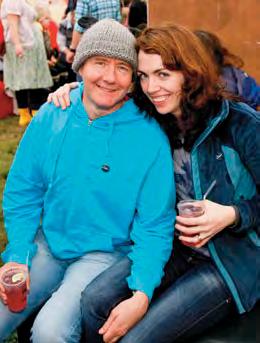
Obviously, it’s a big year for Scotland and I’m pro-independence. I think that Scotland needs to go its own way and I think that it’s just as important for England to go its own way too. England is trying to find its own post-imperial, multicultural identity and it feels as though all this stuff about Scotland and Ireland is a bit of an irrelevance for it.
Don’t ask me which way the referendum will go, but whichever way it does go, this issue won’t go away.
36
i remember
| 06•2014
With wife Beth in 2011
Kieran Harnett
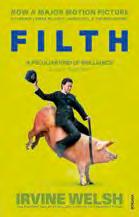
On set with James McAvoy in Edinburgh during the filming of filth
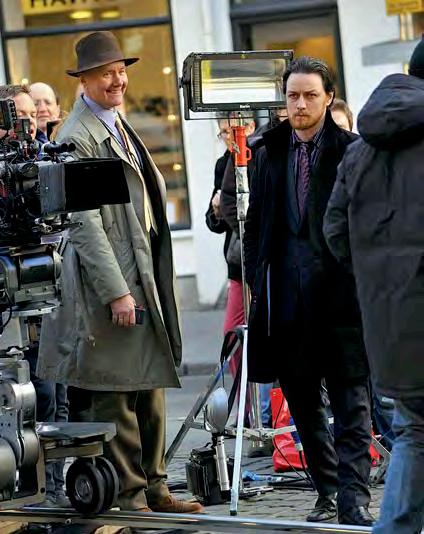
…W atching j ames m c a V oy morph in to a 4 0-year - ol d , bi tter alcohol ic man . About three years ago, I went for a meeting with James about him playing the lead
in a film version of my novel Filth . He was all fresh-faced, smiling and looking about 18. I thought, How can he play a bent, middle-aged, alcoholic copper? In a heartbeat, he just morphed right in front of my eyes. He literally became [the character] Bruce Robertson.
Making a good film of an Irvine Welsh novel is all about the acting. If you just play it for laughs, it won’t work. You need people who can stand outside of reality. People who can find the real darkness in my stories. Let me assure you, James McAvoy found the darkness. As told to Danny Scott
start as you mean to go on
Nowadays there’s a prize for everything—even “composing the opening sentence to the worst of all possible novels”, which is part of the Bulwer-Lytton Fiction Contest. Here’s last year’s runner-up in the adventure section—it shows promise...
“as the sun dropped below the horizon, the safari guide confirmed the approaching cape buffaloes were herbivores, which calmed everyone in the group—except for Herb, of course.”

r eader’s d iges t 37
06•2014 |
for more go to readersdigest.co.uk/entertainment
Filth is out now on dVd and Blu-ray.


Philips’ Complete Road Atlas – Britain and Ireland 2014

Voted Britain’s clearest and most detailed road atlas in a consumer survey, the 2014 edition of Philips’s Complete Road Atlas Britain and Ireland contains 160 pages of road maps, clearly marking service areas, roundabouts and multi-level junctions. Also includes 10 largescale city approach maps and 64 extra-detailed town and city plans.
B10132 Paperback
The Wipers Times
The Wipers Times , the famed trench newspaper of the First World War, is a unique record of life on the Front Line. With an extraordinary mix of black humour, spoof ads and its longrunning cartoon pun (Are We Being Offensive
Enough?), this complete facsimile edition enables you to sample the spirit of the trenches from the safety of your armchair.
248 pages
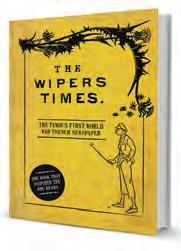
B10120 Hardback
338 Pages
Full range of Books, DVD, CDs available at shop.readersdigest.co.uk
Mary Berry Cooks
The nation’s best-loved home cook invites you to share the secrets of her favourite dishes. Mary Berry Cooks features an all-new collection of 100 mouth-watering, simple recipes for any occasion. From delicious dinners such as SlowRoast Shoulder of Lamb or Cottage Pie with Dauphinoise Potato Topping to special summer lunches such as Fiery Red Rice Salad and Summer Pudding, this is the perfect no-nonsense, no-fuss kitchen companion.

B10062 Hardback
320 pages
Inspector Montalbano
The first three novels
Andrea Camilleri
Set against the backdrop of Sicily’s dark underworld, Inspector Salvo Montalbano investigates complex crimes in this compulsive, pageturning compilation of the first three novels of the series.

B10086 Paperback 912 Pages £9.99 £7.99
£14.99 £9.99
£9.99 £7.99
£20.00 £16.99
Bradford’s Crossword Solver’s Dictionary

Anne Bradford has been compiling her Crossword Solver’s Dictionary since 1957, so this latest edition is based on over 50 years of crossword solving! Every word in this dictionary has appeared as a solution to a real crossword clue. With easy-to-read clear text design, this is an invaluable reference for both cryptic and quick crosswords.
B10134 Paperback 896 pages £12.99 £9.99
Computing for Seniors
This leading computer guide explains in easy steps how to use the internet, email, Skype and online shopping, plus how to manage your computer settings safely and securely. Updated for Windows 8 and for Office 2013, it also sets out to demystify Tablet PCs, touchscreens and apps, to give you confidence in your computing skills.
B10133






Paperback 240
Pages £10.99 £9.99
ORDER NOW! 0844 332 8080 Open: 8am-8pm Mon-Fri and 9am-5pm Sat-Sun ORDER by Phone, Online or Post your order to: Reader’s Digest, FREEPOST RTHR-LLRY-ZHYS, Ringwood BH24 1HD Signature: Mr/Mrs/Ms: Initial(s): Surname: Address: Postcode: Email: # I enclose my cheque / PO for £............................. made payable to: Reader’s Digest Reader’s Digest may pass your details on to other associated companies. If you’d prefer NOT to receive information from 3rd parties tick the box. Tick here to receive our free catalogue PLEASE USE BLOCK LETTERS Card No. Start Date / Expiry Date / Issue No. Security No. CARD PAYMENT DETAILS Total P&P Grand Total FREE Code Title Qty Price RDP002 QuoteDELIVERY!FREE RDP002 For our complete range of products visit shop.readersdigest.co.uk Quote RDP002 for your FREE delivery

Nicotine hit: there are an estimated 2.1 million e-cigarette users in the UK

Burning Questions
How safe are e-cigarettes—and are they introducing a new generation to nicotine addiction?
By susannah hickling
Just a minute’s walk from the school in the bustling centre of La Seyne-sur-Mer in southern France, a brightly lit electronic-cigarette shop is pulling in customers. A neon sign promotes special offers alongside colourful displays of bejewelled e-cigarette paraphernalia. And there’s a wide selection of cigarette flavours on offer—including fresh strawberry, blueberry cobbler, cherry limeade and bubblegum.
The notices stuck on the shop’s windows are reassuring: a report of a survey showing that e-cigarettes helped people give up smoking, testimonies from those who have done so and even the claim that an anti-tobacco group has given its blessing to this new alternative to real cigarettes.
06•2014 | 41 alamy
h ealth
This is one of five similar shops that have recently opened in this town of 60,000 inhabitants, reflecting the soaring popularity of e-cigarettes not just in France, but also in the UK and across Europe, where there are thought to be a total of seven million regular users. Last year the e-cigarette industry in the UK was estimated to be worth £193m and the Electronic Cigarette Industry Trade Association claims that the global industry is increasing by 20–30 per cent a month.
An e-cigarette is a device designed to mimic smoking. The very first e-cigarettes were dubbed “cigalikes” because they resembled conventional tobacco cigarettes—and for this reason, they remain popular.
The cigalikes were followed by a second generation of mid-size e-cigs, such as the eGo range. These sometimes resemble colourful pens, are more cost-effective, and allow the smoker to mix flavours and adjust nicotine strength. The most recent luxury models—known as advanced personal vaporisers (APVs)—come in many shapes and sizes, with additional features and settings.
Every e-cigarette has three basic components: a battery, an atomiser and an e-liquid cartridge. This contains propylene glycol (used in products as diverse as medicines and aircraft de-icer) or sometimes glycerine, as well as a flavouring and, in most cases, nicotine, the chemical that makes cigarettes addictive.
An e-cig might have an LED light at its tip and it can work manually or automatically. Some are disposable; the majority now are refillable. When you inhale, the atomiser heats up the e-liquid and emits a vapour that you feel on the back of the throat, giving a similar “hit” to smoking. It’s called vaping.
Originally marketed as an aid to giving up normal cigarettes, e-cigs have become a lifestyle choice. A subculture has developed and internet forums are devoted to what’s seen by many as a hobby. Members discuss the best equipment to use and where to buy it, and even how to make DIY e-liquids using propylene glycol bought from pharmacies.
the JuRy is Out on the safety of e-cigarettes. They’re certainly better for you than real cigarettes, which contain hundreds of toxic substances, and they’re a boon for those wanting to give up tobacco.
“It certainly worked for me,” says one customer, reviewing his e-cig experience online. “I bought my original eGo with a strong Marlboroflavour liquid. It gives you the same kick in the throat that strong tobacco gives you, without all the poisons.”
But there are good reasons to worry about this runaway craze. A study of short-term use by the University of Athens and exchanges in vaping chat rooms are already flagging up health fears, such as breathing problems and
| 06•2014 42 Burning questions
mouth and throat irritation. Nicotine is known to cause anxiety and raise blood pressure. Evidence is emerging that it damages blood vessels and cells in the heart, increasing the risk of heart attacks and stroke.
No one knows just how harmful vaping could be. Most e-cigs and eliquid ingredients are made in China, but as yet there are no mandatory quality controls. The safety of many toxicants formed when the e-liquid is heated has yet to be investigated.
Research Centre for Prevention and Health at Glostrup Hospital near Copenhagen. “Smokers of normal cigarettes also mostly experience no or few adverse events for years— health damage accumulates and disease occurs decades later.”
MOst distuRBing is the fact that e-cigarettes are marketed in a way that appeals to young people. Advertisements depict users as cool, sexy and healthy, just as early
a secOnd-geneRatiOn e-cigaRette
Battery
e-liquid cartridge
LeD light Atomiser inhaler
“E-cigarette emissions are not purely water vapour,” says Dr Phillip Gardiner, a nicotine expert at the University of California. “They are a new source of volatile organic compounds, nicotine and heavy metals. The health hazards associated with this level of exposure have yet to be determined.”
“As with conventional cigarettes, we need a follow-up of many thousands of users over decades before we can state whether e-cigarettes are safe or not,” explains Dr Charlotta Pisinger, a public-health expert from the
cigarette ads did before science proved that cigarettes are responsible for killing half of those who use them.
Celebrities such as Johnny Depp and Leonardo DiCaprio and singer Katy Perry have been pictured puffing on e-cigs. The E-Lites brand managed to secure a product-placement deal in Lily Allen’s “Hard Out Here” video.
Add exciting flavours targeting teenagers and there’s a real danger that e-cigarettes will create a new generation of nicotine addicts.
Even young kids may be attracted to e-cigarettes. Elizabeth Baker from
06•2014 | 43 i llustration by anna-kaisa J ormanainen Reade R ’s d iges t
Cardigan in Wales has been using them to quit smoking, but she was horrified when her two children, aged 11 and 14, started to show an interest in her e-cigs. “They’ve always been anti-smoking and know how difficult I’ve found it to give up, but there they were asking if they could try my e-cigarettes.”
Deterred from smoking tobacco, young people could instead be unwittingly setting themselves up for future health problems triggered by e-cigarettes. Or they may turn to tobacco cigarettes, once hooked on the nicotine in the electronic variety.
“Nicotine is uniquely addictive— about as addictive as heroin,” points out Home Counties-based publichealth doctor Peter English.
sOMe health eXPeRts worry that tobacco companies, which have been buying and developing e-cigarette brands, are using them as proxy marketing and creating a gateway product to tobacco.
“With e-cigarettes they can get images that look exactly like smoking into pop videos for kids, into movies; you saw people at the Golden Globes smoking—vaping—with e-cigarettes and that’s renormalising the imagery,” says Martin McKee, professor of public health at the London School of Hygiene and Tropical Medicine.
Professor Gerard Hastings of the Centre for Tobacco Control Research at the University of Stirling agrees.
“We did an audit last year of all the UK marketing for e-cigarettes,” he says. “It’s a flashback to the 1960s when tobacco advertising was still very free and easily available: the same sorts of pictures for lifestyle claims, trendiness, coolness, sports sponsorship, celebrity endorsement, pop videos. All these things that the tobacco industry in the past jumped on as fast as it could are now being used for e-cigarettes.”
“Electronic cigarettes are a good product to help smokers give up,” says Bertrand Dautzenberg, professor of chest medicine at the Pitié-Salpêtrière Hospital in Paris and chair of the French Office for the Prevention of Smoking. “But they’re bad for nonsmokers and especially young people, who begin smoking a product called a ‘cigarette’, which produces ‘smoke’ and contains nicotine.”
What makes them likely to try e-cigs? “Young people are curious,” says Dr Charlotta Pisinger. “They’re the trendsetters and early adopters. They’re attracted to new products and they like to experiment.”
Surveys demonstrate that this is what young people are doing. A Polish poll of 20,000 students at high schools and universities showed that one in five had tried them. A French survey of more than 3,000 young Parisians found that two in three of the 12- to 14-year-olds who had tried e-cigarettes hadn’t smoked tobacco, confirming that they

| 06•2014 44 Burning questions
offer a route into nicotine addiction.
Reader’s Digest conducted its own poll of Swedish students aged 16–18. Two in five of the sample had tried an e-cigarette. Five per cent regularly used e-cigarettes with nicotine. Their reasons? They liked the taste and the fact that they could smoke in places where tobacco smoking was banned.
Carl, 16, for instance, doesn’t light up in front of his parents, who don't know he smokes. But the Stock-holm student still gets his nicotine fix at home by puffing on e-cigs.

to cigarettes—for example, in places with a smoking ban,” says Dr Pisinger.
Signs are also emerging that e-cigs can turn non-smokers on to tobacco.
At the age of 28, David Rous from Prague had never smoked in his life. Then his girlfriend persuaded him to try one of her e-cigs. A week later, David had abandoned them—for regular cigarettes.
Now aged 30, the business manager smokes between ten and 15 a day and is hooked. Does he rue the day he ever touched an e-cig? “I can’t say
“Smokers start to use e-cigarettes in order to quit, but they end up as a supplement to cigarettes”
“It’s really practical,” he says. “It doesn’t smell, it tastes good and you can smoke indoors.” This means that his nicotine intake has increased. “I smoke e-cigarettes indoors and then go outside for a cigarette!”
Carl’s experience chimes with other research. Data from a survey of nearly 76,000 South Korean teens showed that four out of five e-cigarette users also smoked tobacco. Those who had attempted to pack in smoking were more likely to vape—but less likely to have given up tobacco cigarettes.
Those who vaped tended to smoke tobacco heavily. “So smokers start to use e-cigarettes in order to quit, but e-cigarettes end up as a supplement
I regret it, because I’m enjoying the taste of tobacco and look forward to the next cigarette,” he says.
the eu wants tO control the e-cig revolution, and recently approved a new tobacco directive that was extended to cover e-cigarettes. The directive, which member states must introduce by May 2016, imposes health warnings on e-cig packs and outlaws some advertising. It limits the maximum concentration of nicotine in e-cigs to 20mg per ml of liquid, the maximum size of single use cartridges to 2ml, and the maximum volume of re-fillable containers to 10ml. It also offers scope for an EU-wide ban of
06•2014 | 45 Photogra P h by
Reade R ’s d iges t
James clarke
specific e-cigs or refill containers if three member countries withdraw a product from the market for justified safety reasons.
Member states remain free to regulate e-cigs as medicinal products. Some countries such as Austria already do this, while others such as Norway simply ban the sale of refills containing nicotine. Belgium, on the other hand, has banned vaping in public places, including restaurants.
Officials in England are calling for a ban on the sale of e-cigs to under-18s.

trains, while the mayor of St Lô in France has put a stop to vaping in all public buildings in the town.
few suPPORt tOtal PROhiBitiOn, which would prevent smokers from accessing a convenient and popular way of quitting. And banning the sale to under-18s could prove counterproductive by giving e-cigarettes the allure of “forbidden fruit”.
Nonetheless, some experts want strict regulation. Charlotta Pisinger believes punitive pricing, bans on
Banning the sale to under-18s could prove counter-productive by giving cigs the allure of “forbidden fruit”
But a loophole in the British advertising code, which since 1965 has banned TV ads that promote cigarettes, has allowed British American Tobacco to promote its Vype electronic cigarettes on TV and online.
Some local authority and corporate bans have been announced. Various rail companies forbid their use on
selling e-cigs to minors and vaping in public places, as well as regulation as a medicinal product with sales limited to pharmacies, are all measures that are likely to be effective.
Such steps are seen as crucial. As Professor Bertrand Dautzenberg puts it, “E-cigarettes are toxic, addictive and not for young people.”
dazed and c O nfused
From notalwaysright.com, home of odd customer transactions: customer: (Putting a bag of dog food on the counter)
“i’d like to return this, please.”
Me: “Certainly. Was there anything wrong with it?” customer: “no. i’m pregnant and i’m losing my mind.
i have a cat.”
| 06•2014 46 Burning questions




CONTAINS IBUPROFEN. ALWAYS READ THE LABEL.











FAST, TARGETED RELIEF FROM JOINT, MUSCLE AND BACK PAIN. 3.00pm 3.02pm 3.01pm 3.03pm
WWW.IBULEVE.COM I DO BELIEVE SHE NEEDS IBULEVE
The diagnosis: rabies.
Chances of surviving: nil. How Precious Reynolds made medical history
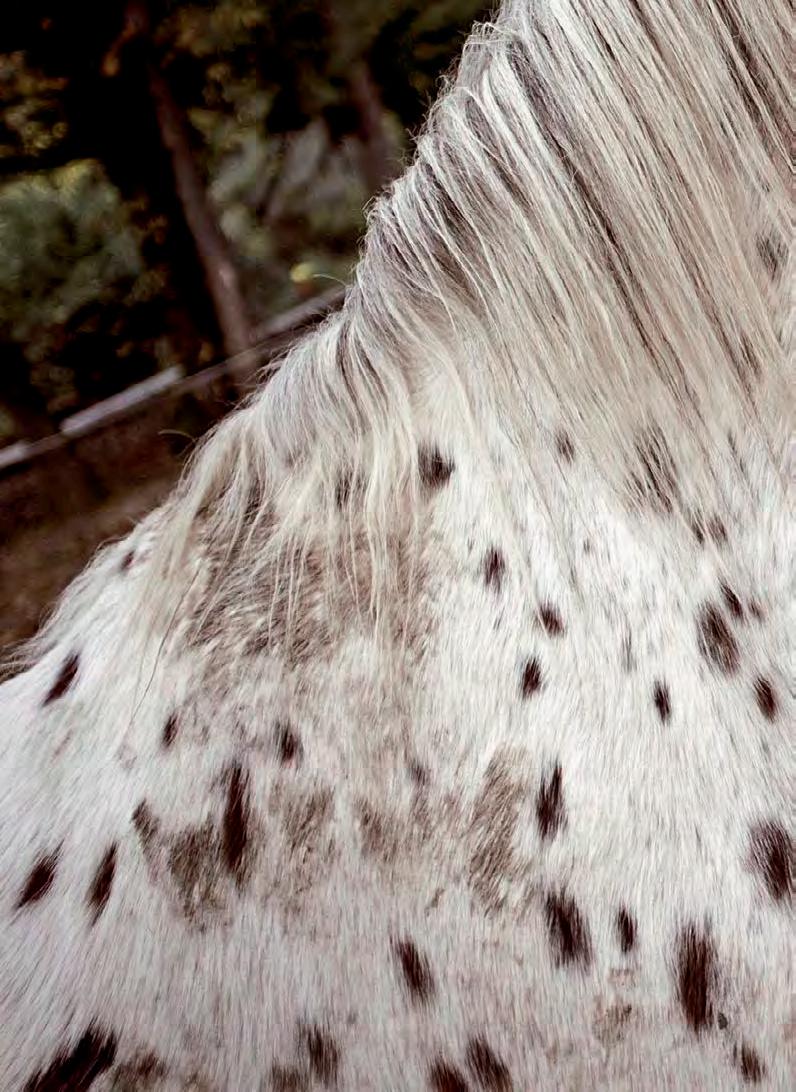
Miracle Willow Creek
at
48
d
a N d CH a RLE s o MM a NNE y (p H o tos) H E a Lt H
By HELEN BÖMELBURG (wo R
s)
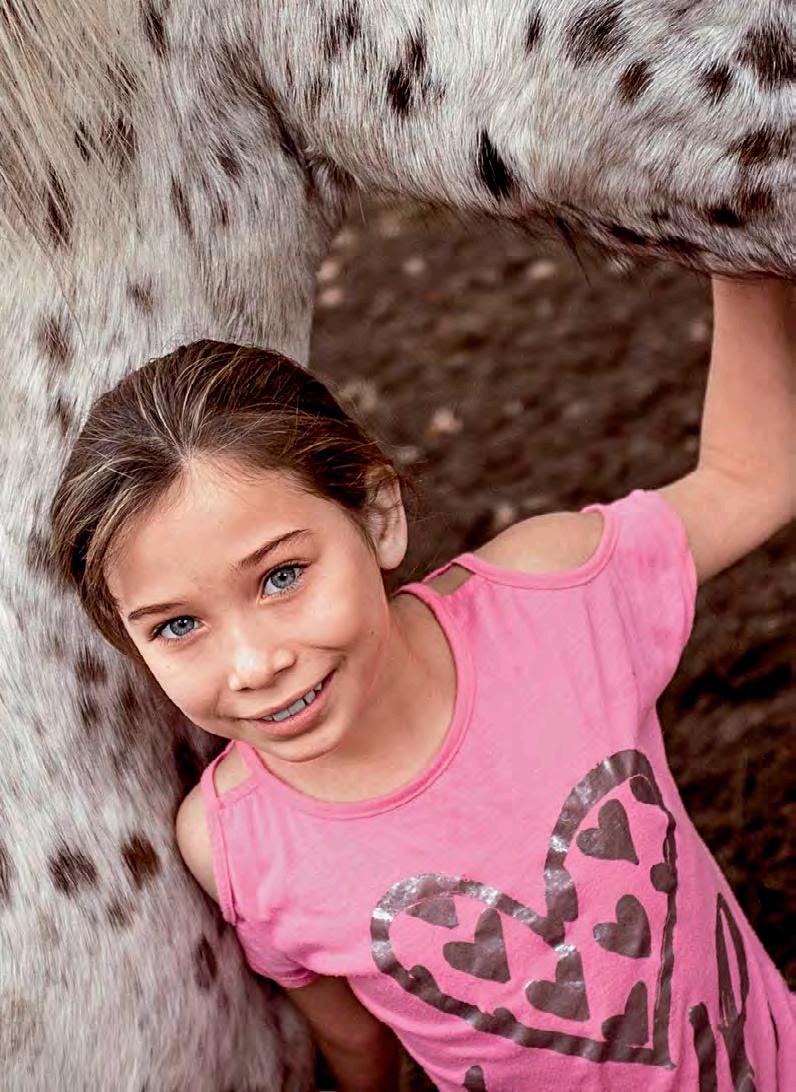
Winding country roads lead up into the mountains and forests of northern California. Willow Creek, population 2,000, is located there, in Humboldt County. At the back of Willow Creek, there is a valley. At the bottom of it, a river runs, and half a mile away a wooden house painted blue and with a white picket fence stands alone. Four dogs erupt from within, barking angrily.
A wiry girl with shiny black hair and almond-shaped eyes runs behind them. “Leave them alone! Be quiet! Behave!” she scolds as she opens the front gate.
She is Precious Reynolds. She and her three siblings and a cousin live here with their grandparents Jack and Shirlee Roby. Her grandmother is descended from Wiyot Native Americans. Jack, 76, runs the household, while Shirlee, 61, earns a crust as a road worker on California’s highways. The children’s parents are absent from their lives for one reason or another. The family’s poverty stares out at you from every corner, making Precious’s name all the more poignant.
It was April 2011 when Precious, then eight years old, decided to take a closer look at a grey feral cat that was scurrying across the yard of her primary school in Willow Creek. As she stuck her hand out to stroke it, the cat nipped her with its bared teeth. Although it drew blood, it was really little more than a scratch on her
left middle finger. Her teacher sent her to the office, where a secretary stuck a plaster on her finger.
tHis is How aLL RaBiEs stoRiEs BEG i N . With an animal that bites someone for no apparent reason, draws blood and transmits a horrific infection to them through its saliva that will soon spread to the rest of their body. The rabies virus is shaped

A coloured micrograph of the bullet-shaped rabies virus
| 06•2014 50
mi R a C le a T will ow CR eek
Opening spread: Charles Ommanney/ g et ty i ma ges
Battling against poverty: Precious (front row, centre) and her family

like a bullet. The cylindrical projectiles made from glycoprotein and lipids carry a deadly payload of genetic material. Unlike most other viruses, it does not spread via the bloodstream but instead creeps through the nervous system at a rate of about two to ten centimetres a day until it reaches the brain. Once there it induces an inflammation for which there is no cure.
There is a vaccine for people infected with the virus. But a nightmare of agony and terror awaits them if they miss the window of opportunity of a few short days after being bitten. When it comes, death almost seems like a release.
Precious’s nightmare began three weeks after her run-in with the cat. At
bedtime, the youngest child told Jack and Shirlee that Precious had vomited. The next day, she was still sick so Jack took her to the doctor, who suspected appendicitis and said to take her to the nearest hospital, a 40-minute drive away. The staff there said it was probably a bout of flu so Jack took her home. Forty-eight hours later, in the middle of the night, Precious went to her grandparents’ bedside with headache, neck and back pains. Jack took her to hospital again, where they gave her pain medication and sent her home. By that evening, she couldn’t even hold her head up.
“She lay in my arms like a rag doll,” recounts Shirlee in her clear, deep voice. The tiniest drop of water was
Reade R ’s d iges t 06•2014 | 51
enough to make her cough and retch and push away her glass, even though she was incredibly thirsty. Hydrophobia, or fear of water, is a unique symptom of rabies.
Shirlee bundled Precious into her pick-up and drove her straight back to hospital.
“This ain’t no damn flu!” she told the doctors and demanded that they take another look at her granddaughter. What they found was a little girl whose condition was getting worse by the hour. She was whisked by ambulance to the airport, then flown 200 miles to Sacramento.
In the paediatric intensive care unit at the University of California Davis
Children’s Hospital, a team of paediatricians and intensive care doctors began working against the clock to try to pin down what was slowly killing Precious. Epstein-Barr virus, hepatitis B and C, typhoid, polio, Lyme disease and typhus were all ruled out.
Lead infectious-disease doctor Jean Wiedeman phoned up experts and scanned through reams of specialist publications. Eventually, she spoke to an expert from the US health authorities who worked as both a medical doctor and vet. It was she who finally solved the mystery. Paralysis plus hydrophobia plus a rural location—test her for rabies! Five days after Precious had been admitted to intensive care,



mi R a C le a T will ow CR eek
they finally had a diagnosis. As for the treatment, all that a modern clinic could offer her was “comfort care”, a death without suffering.
i t was i N t HE s UMMER of 1885 that a means of preventing rabies was finally discovered. Louis Pasteur managed to produce a vaccine using the desiccated spinal cord of an infected rabbit which he used to save the life of a nineyear-old boy shortly after he’d been bitten 14 times by a rabid dog. It marked a breakthrough for the science of microbiology.
Since then, though, little progress

has been made in the treatment of rabies. The doctors had heard of a high-risk experimental treatment
Precious was put into a coma and kept alive on a ventilator, although she seemed more dead than alive
first attempted in 2004 by Rodney Willoughby, Jr, a paediatrician in Milwaukee. Fifteen-year-old Jeanna Giese, who had caught the infection


R E ad ER ’s d i GE s t
Fighting spirit: Precious and her grandmother Shirlee

from a tiny scratch by a bat, was the first rabies patient her doctor had ever encountered. Working completely on his own, it took him less than a day to come up with the hypothesis that the human immune system would be perfectly capable of fighting off the rabies virus if only it had more time to do so. His patient was therefore put into an artificially induced coma to prevent her brain from causing fatal damage to her nervous system while her body’s natural defences fought the virus.
His idea worked. After seven days, Jeanna had large numbers of antibodies in her bloodstream. She was
subsequently revived, but it was two years before she was substantially back to normal. Since then, the “Milwaukee protocol” has been used on 50 occasions. Five other people’s lives have been saved, although most suffered neurological damage.
JaC k a N d sH i RLEE H ad G iv EN
tHEiR CoNsENt to attempt the Milwaukee protocol on the day Precious was diagnosed. She was put into a coma and kept alive on a ventilator, although she seemed more dead than alive, barely visible under a pile of tubes and cables in her hospital bed. Shirlee stayed by Precious’s bedside
mi R a C le a T will ow CR eek | 06•2014 54
m i C hael m a CO r / s an Fran C is C O Chr O ni C le /C O rbis
during the day, and William Reynolds, Precious’s father, was there every night.
On day 14, the doctors started trying to prepare Shirlee for the worst. But Shirlee drew herself up and planted herself squarely in front of every doctor or nurse who dared to voice their doubts. “If you can’t have a positive attitude, we don’t want you here.” Shirlee brought a Native American medicine bag into the hospital and put it round Precious’s neck.
From day 16, Precious’s immune system started to fight back. After 53 days in hospital, she was able to walk outside on her own two feet.
Precious is only the sixth person in the world to have survived rabies and has made the quickest recovery. Shirlee swears that it’s all down to the medicine bag.
BaC k at w i LLow C REE k, everything has returned to normal—well, almost. Precious is back at school and last summer she took part in a sheep rodeo and threw a ram on its back in less than a minute. The family and their animals have been given
precautionary rabies vaccinations. Jack and Shirlee now find themselves in debt. The emergency flight alone cost £32,000. The insurance company covered most of it and some was
In the intensive care unit a team of doctors worked against the clock to pin down what was slowly killing Precious
paid for by the clinic and a handful of donors. Shirlee is paying off the rest in instalments by working overtime.
Jack and Shirlee stand on the veranda as Precious roars around outside on her mini bike. There used to be logging round here, says Jack, there were dairy farms and fisheries. There’s nothing here now, he says. No jobs.
Precious, now 11, wants to live in a nice house with central heating and says she will never take drugs. She wants to go to college and be a nurse, or a vet. She hasn’t got a hope in hell… has she?
06•2014 | 55
F r O m Stern (January 31, 2013) R E ad ER ’s d i GE s t
a N EUR oti C ’s f avo UR it E w o R ds… “Cheque enclosed.” d o R ot H y p a R k ER
benign.” w oody aLLEN
told you so.” Go RE v ida L
“it’s
“i
Life In a Hospital Can Be Difficult— for Everyone
By max pem B erton

Max is a hospital doctor and author. He’s also the resident doctor on ITV’s this Morning

Mrs Kerrigan can’t sleep. It’s a shame that it’s taken her until 3am to realise this, and even more of a shame that it’s me that the nurses have decided to disturb in order to prescribe her a sleeping pill. The nurses suspect she just wants a chat. I go and see Mrs Kerrigan, who’s sitting bolt upright in bed, reading yesterday’s paper. “I don’t usually have problems sleeping, although I did once when we were moving house, which was very stressful. Have you ever had to move house?”
Mrs Kerrigan is obviously very lonely, she goes on to tell me that her husband died 12 years ago after 40 years of marriage, and they’d never had children, and it isn’t easy cooking for one. I sit down on the side of her bed. This is the first time I’ve had time to sit down since my shift began, and my feet ache terribly.
My pager goes off and jolts M e bac K int o the real world. I think I’ve just dosed off in front of Mrs Kerrigan. She doesn’t appear to have noticed and is still talking verbosely about meals for one. I answer my pager. The nurse on the other end of the phone sounds worried. She thinks a patient on her ward has just gone into kidney failure as he hasn’t passed any urine all night.
| 06•2014 56
Healt H

run in the vague direction of the ward where the patient in kidney failure is. Just as I arrive on the ward, my pager goes off again. It’s a patient on the other side of the hospital who’s got a high potassium level. It’s another emergency so I hotfoot it off to this patient. I run to and fro between patients, getting very little done, until, getting more and more exhausted and seeing that the patients don’t appear to be getting any worse, I start to become suspicious.
A nurse has just got back from her break: “Oh, no, sorry, he’s not in kidney failure—his urine output is quite good. I just forgot to write it down this evening in his notes.” She laughs as I stand there panting with a pile of notes slipping out of my hands, my tie half undone and my shirt untucked. And then my pager goes off again: “Sorry, it’s Ward 6 here, just to let you know that the potassium levels were actually old ones that had been misfiled in the notes. The levels were taken yesterday and they were normal. Sorry about that.” So all that for a couple of clerical errors.
y way bac K t o bed
I remember Mrs Kerrigan. Poor thing. I walk onto the ward where she is. “Don’t worry about her, Max,” one of the nurses says. “She fell asleep almost as soon as you left.” I peer over to her bed, and in the dark I can just make out the outline of Mrs Kerrigan, sitting bolt upright, but with head slouched to one side, snoring. I walk out into the dawn and make my way to the doctors’ mess. There’s only an hour or so before I’m due to start my ward round, so there’s no point in sleeping now. Instead, I sit on my own and eat a microwave meal for one.
06•2014 | 57 OJO Images Ltd/aL amy
medical mytHS—BuSted!
If You Don’t Shut Your Eyes When You Sneeze Your Eyeballs will Pop Out
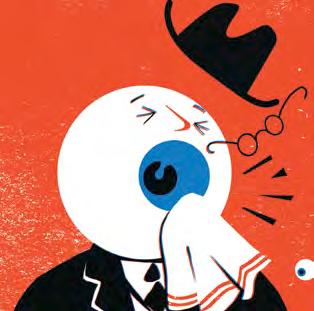
WHat’S tHe trutH? It is actually possible for the eyeballs to come out of their socket. They are held in place by a number of incredibly strong muscles though, so these muscles would have to be severely damaged or very lax in order for the eyeball to leave the socket even slightly. While sneezing can be forceful, it’s not enough to push the eye out and there are no cases in medical literature of this happening.
WHere did tHe mytH come from?
In 1882 the New York Times reported that a woman in Indianapolis had sneezed while on a tram and her eyeball had exploded. There seem to be no more details than this, and from a medical perspective, there must have been more to the story than was reported, but it’s possible that this is where the myth started.
So tHere’S notHing to Worry aBout? There are no documented cases of people’s eyeballs popping out after sneezing, but there are a few cases of it happening when people have vomited very hard and very frequently. This is, thankfully, incredibly rare. Certain types of trauma can make the eyeball come out. Eyeballs can also spontaneously pop out, but again this is rare. If this happens the person concerned would usually have been born with an unusual configuration of eye muscles.
| 06•2014 58
I LL ustrat IO n b y dav I dhumphr I es. c O m
Healt H
THERE’S NO WAY SOMEONE LIKE YOU COULD POSSIBLY HAVE DIABETES. IS THERE?
Type 2 diabetes is the UK’s fastest growing health risk. Three people are diagnosed every 10 minutes – and no one is immune. Once you have diabetes, you have it for life. It can lead to blindness, limb loss and kidney failure. It can even kill you. Still think there’s no way you could be at risk?
TEXT KNOW TO 70707 TO GET YOUR FREE DIABETES GUIDE AND PEDOMETER





























This is a charity service for Diabetes UK. Texts cost your standard network rate. We may contact you again in future. If you would prefer we didn’t call you, text NOCALL DUK to 70060. To stop receiving SMS messages from us, text NOSMS DUK to 70060. A charity registered in England and Wales (no. 215199) and in Scotland (no. SC039136).
YOUR FREE GUIDE TO DIABETES
By susanna H H ickling
Heart of the Matter

Susannah is twice winner of the Guild of Health Writers
Best Consumer Magazine
Health Feature

One in eight w O me n in the UK dies from heart disease every year and their chances of getting it are the same as men’s from age 50 onwards. But it’s often said that while men have chest pain, women have different heart attack symptoms. Is that true?
The answer is yes—but this mainly applies to older women. Women under 55 are more likely than not to have chest pain and almost as prone to this number one symptom of a coronary as men. A recent Canadian study of 1,015 men and women under 55 found that 13.7 per cent of men didn’t suffer
QAre women more likely to die of breast cancer or heart disease?
a Heart disease. Three times more likely, in fact. So don’t ignore high blood pressure or Quack Q
uestion
cholesterol, and make sure you drink moderately, eat healthily and get plenty of exercise. Still smoking? Knock it on the head once and for all—it’s a risk factor for both heart disease and, according to new research, breast cancer.
Rui Santo S / a lamy | 06•2014 60
Healt H

chest pain, compared with 19 per cent of women.
Previous research has revealed that women under 55 have a higher chance of having their heart attack and angina symptoms misdiagnosed in A&E and of dying. But could this be because doctors assume that women in this age group couldn’t possibly be at risk of a heart attack?
What if you suspect you’re having one but doctors poohpooh your symptoms? Ask to be tested. Two screening tests used to diagnose a heart attack are an ECG and a blood test that looks for enzymes that are a tell-tale sign of damage to your heart.
Symptoms other than chest pain include cold sweats, pain in the left arm or shoulder, feeling sick, uncharacteristic fatigue, shortness of breath and feeling hot.

see next month’s issue for more on women and heart disease.

keeping your Feet sWeet men’s HealtH
Feet have more sweat glands than any other part of the body and the moist conditions inside your shoes and socks are the perfect environment for bacteria. these break down the droplets of sweat and make your plates pong. Being on your feet all day, stress, certain types of shoes and socks and— ahem—inadequate personal hygiene all have a part to play. So to freshen up your feet: Wash them. Every day. use mild soap and dry properly, especially between the toes. use deodorant on your feet. Surprisingly, it works on your soles as well as on your armpits and is less pricey than a special foot product. change your socks at least once a day. Choose soft socks made of natural fibres or sports socks designed to absorb moisture. Wear leather or canvas shoes and preferably sandals in summer. avoid synthetics and anything tight-fitting. Vary your footwear. alternate between shoes, leaving 24 hours for shoes to dry out.
06•2014 | 61 DCPhoto/ a lamy
A Cure for Diabetes in Our Lifetime?
First the bad news: there’s been a sharp rise in diabetes in the last year and 3.2 million are now living with the disease in the UK. But there’s good news too: doctors—always a cautious breed— are increasingly talking about the possibility of eradicating, reversing or preventing it entirely. One expert claimed recently that there would be a cure within 25 years. Here are some of the most promising developments:

Cambridge researchers for people with Type 1. The implantable device monitors blood glucose from minute to minute and delivers just the right amount of insulin. This gets round the problem of insulin needs fluctuating throughout the day.
■ Vaccine. About 300,000 people with diabetes have Type 1, an autoimmune disease in which the body doesn’t produce insulin. In a bid to allow people with diabetes to go for longer before having to start injecting insulin, scientists are working on a vaccine to modify the immune system. The eventual aim is that children and young people (most people develop Type 1 before 40) never develop diabetes in the first place.
■ Artificial pancreas. There’s a lot of excitement about an “artificial pancreas” being developed by

■ Very low-calorie diet. Researchers in Newcastle and Glasgow are testing a low-cal liquid diet as a possible way of reversing Type 2 diabetes (the type that’s linked to an unhealthy lifestyle). After between eight and 20 weeks of drinking nutritionally balanced shakes containing only 800 calories a day to lose weight, the guinea pigs go onto a personalised support programme to help keep the pounds off. They will then be monitored for two years to see whether their diabetes goes into long-term remission.
A previous small study found that eight weeks on the liquid diet worked for all 11 participants.
| 06•2014 62 h E alth BS i P S a / a lamy

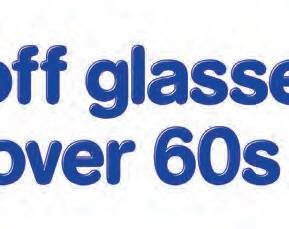

















3 Reasons to Get Cycling
1. It offers an excellent lower-body workout. Cycling builds strength in your quadriceps and hamstrings, and—oh joy, girls—firms your buttocks. You develop muscles without bulk, plus you tone and strengthen your core muscles because you’re working on staying balanced and upright. Bike-riding is also a lowimpact sport, so it’s easy on the joints.
2. Pedalling is good for your heart. It offers varied intensity—working at a moderate pace on flat stretches, pushing harder
on uphill climbs, not to mention cycling into the wind. All great exercise for building a strong cardiovascular system.

3. Biking banishes stress and anxiety—official. Research published in the British Journal of Sports Medicine found that people with depression and anxiety who cycled for 20 minutes felt less anxious afterwards. Cyclists who picked the level of intensity they wanted to ride at reported improved well-being. A bike—what’s not to like?


Which country’s getting a good night’s sleep? Not ours, it seems! Good Sleep bad Sleep
| 06•2014 64
Japan Mexico US Canada UK Germany 54% 48% 44% 43% 42% 40% 16% 12% 25% 23% 27% 15%
Insomniac Nation
US Natio N al Sleep Fo UN datio N , 2013 for M ore G o to reader S di G e St.Co.UK /health health

There are no quick fixes when your partner dies. But you can emerge a positive and even better person, say those who’ve been through it
After You’ve
Gone
The early days
Nicola Campbell, 38, from Edinburgh. Her husband Colin died two years ago, also aged 38. She is a freelance writer and mum to Evie, three, and Isla, two. “Colin died totally unexpectedly of sudden adult death syndrome. It couldn’t have been more shocking. They tell you not to make any big decisions for the first year: but on the very day he died I decided we were going back to Edinburgh, where I’m from. I knew it would be too painful to stay in our very
| 06•2014 66
illustrated by martin o’neill
inspiration
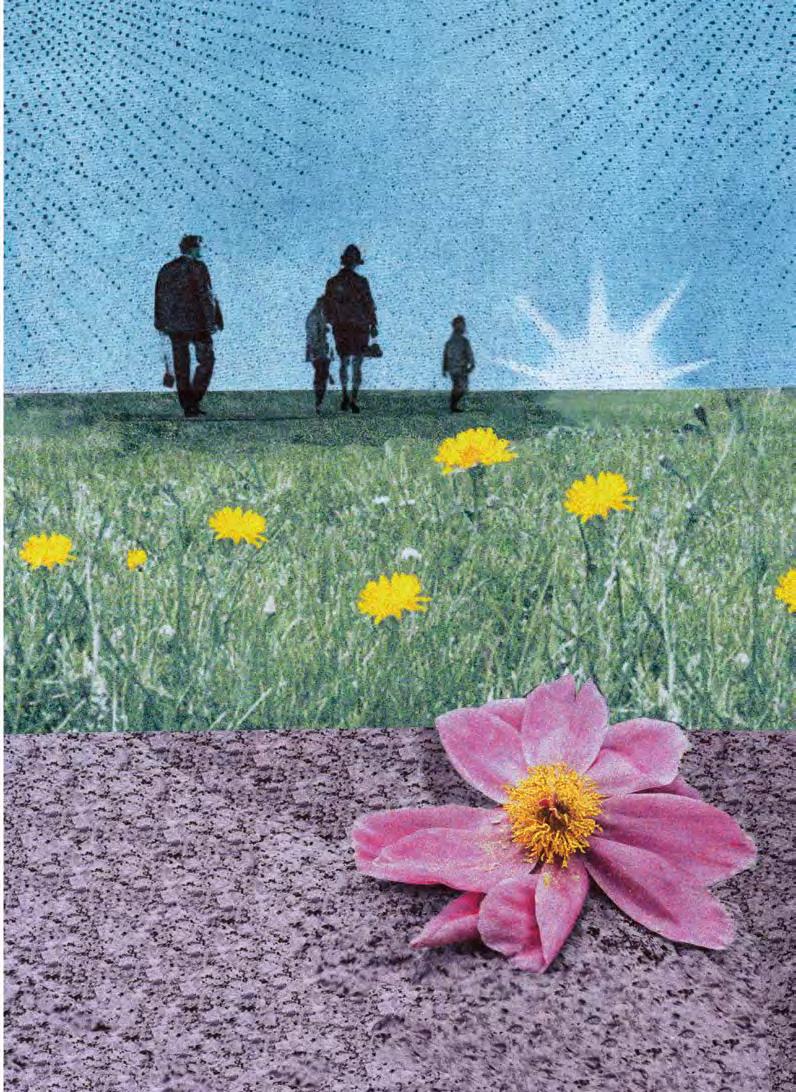
family-orientated corner of London, seeing all the daddies with their children when my daughters didn’t have that any more.”
Louise Smith, 43, runs an IT business from her home near Banbury. She lost her husband Richard to cancer in April 2011. She has two daughters: India, six, and Jasmine, three.
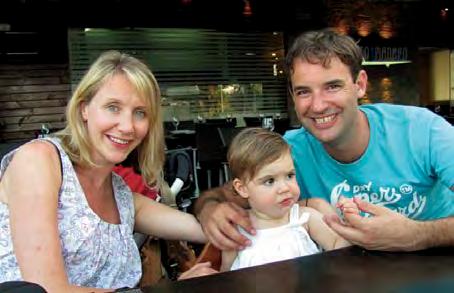
“On the day of his funeral, I had to look my very best. I wore a cornflower blue dress with chiffon sleeves and a hat and high heels. I had my hair done and my make-up was done professionally. I looked at myself in the mirror and thought: Richard would have approved, big time. That was so important to me.”

Laurence Warner, 44, is from Darlington. Her husband Mick died of cancer in 2007, aged 60.
“It’s a tough road and you have to give yourself treats along the way. A bath with your favourite bath oil; a bar of really good chocolate; a new dress. I saved up for a weekend away in a Welsh hotel suite. It was exactly the sort of place I’d have gone with Mick. I was lonely, but I didn’t mind. It meant a lot to me.”
Maureen Greaves’s 68-year-old husband Alan was murdered in a random attack on his way to a Christmas Eve service in 2012. She’s 64 and from Sheffield.
“Alan and I loved to go on walks together and after he died I carried on doing them alone. It brought back the memory of us walking together, and I liked that. But it was also a place where I could cry.”
| 06•2014 68
courtesy of nicola campbell and louise smith
af T er you’ve gone
Louise Smith with daughters Jasmine and India
Nicola Campbell with husband Colin and daughter Evie
Coping with the people around you
Louise Smith: “You find out who your friends are—and it can be a surprise. People you expect to be there for you melt away and do nothing to help at all. Others you hardly knew are invaluable. A woman I’d have called my friend said she couldn’t look after my children so I could go to Richard in the hospice; I hardly talk to her now.
Another woman, who I would only say ‘hello’ to before, came over with a shepherd’s pie on the day he died; she was brilliant. It’s not about the relationship you had with someone before, it’s about how empathetic they are now.”
“People you expect to be there for you melt away. Others you hardly know are invaluable”
work (actually, I was back at work a week after Vicky’s funeral) and people think you’re moving on. But you’re not even off the starting blocks. The first year was a total blur for me; I barely remember anything about it. I was numb with grief; too numb to begin to learn how to live again, and too numb to feel the pain. So the second anniversaries were far harder, and that was hard for the people around me to grasp.”
Stuart McKay, 40, lost his 35-yearold wife Vicky to cancer almost three years ago. Stuart is a computer analyst and lives in Northampton.
“People assume the first year will be the worst—that you’ll struggle to get through all the ‘first’ anniversaries. The first birthdays without her; the first wedding anniversary; the first Christmas… So you get through that year, you look OK, you’re back at
Maureen Greaves: “Part of my journey of healing has been realising I’m not the only person who’s grieving—others are too. Maybe their feelings aren’t as obvious, maybe they aren’t as great, but maybe they are—or were. After Alan died, a woman stopped her car in the street, got out of it and came to hug me. She said she’d lost her husband, and that ‘You’re the one person I wanted to talk to.’ Your grief can be a bond, not something isolating.”
Family life after loss
Stuart McKay: “In a sense, the biggest grief isn’t about losing Vicky, it’s grief for the family we never had. I’m 40
r eader’s d iges t 06•2014 | 69
years old and I think to myself: in another universe she and I would have a couple of children by now. Instead, I live on my own with three cats: sometimes I think that’s the only patter of tiny feet I’ll ever hear.”

you’ve been close to death and because your children will be orphans now if anything happens to you. There’s no back-up person any more, and you know your children need you, they need at least one parent.”
Michael Adams, 35, lives in Trowbridge in Wiltshire and is an IT manager. His wife Helen died in March 2013 of cancer. He has two children, five-year-old Olivia and four-year-old Marley. “You’re suddenly very aware of your own mortality, both because
In the longer term
Stuart McKay: “It’s been years, but I’m still Stuart who’s half of ‘Vicky and Stuart’, I’m not just Stuart yet. I continue to wear my wedding ring, even though I’m in a new relationship. I honestly don’t know
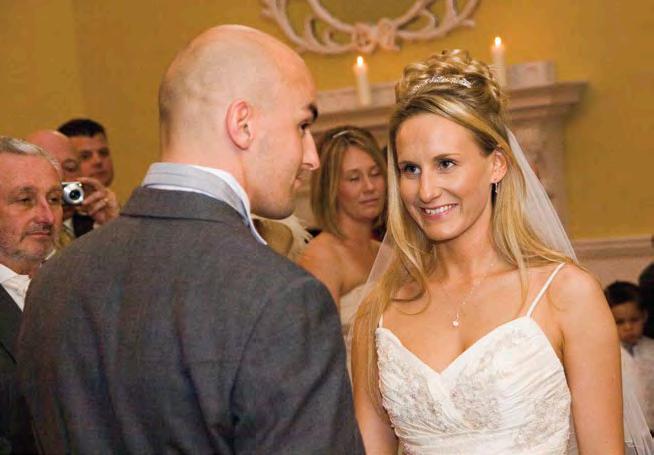
| 06•2014
70
courtesy of stuart mcKay and michael adams
af T er you’ve gone
Michael Adams with wife Helen
Stuart McKay and Vicky
when, or even whether, I’ll take it off or do as many widows and widowers do and move it to my right hand. All I can tell you is my left hand is still where my wedding ring belongs.”
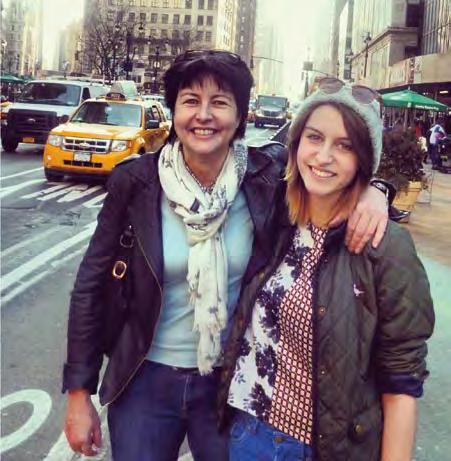
Kate Boydell and daughter Alice
Kate Boydell, 49, lives in Plymouth. Her husband Charlie died of heart problems 14 years ago. She runs a TV post-production company, and wrote a book, Death and How to Survive It, on losing a spouse. “You and your partner were like two Jenga towers that had been built together. They were so interrelated it was impossible to know where one tower started and the other stopped. When your partner died, his tower collapsed—taking yours down with it. You have to reassemble yourself from scratch. But the important thing to know is that you can never be the same person again. Your new tower will be different;
it has to be because some of the blocks are gone.”
“I’ve become a stronger, better person. Losing Colin made me realise what really matters in life”
Nicola Campbell: “My doctor said, ‘you’ll never be fixed’ and I felt like punching him. I desperately wanted to be fixed. But I know now he was right. I can learn from it, though: I’ve become a stronger, better person. Losing Colin made me realise what really matters in life. I used to think it was the kind of house we had, the kind of neighbourhood it was in. Now I know it’s about the time you
r eader’s d iges t 06•2014 | 71
courtesy of K ate bo
ydell
spend with the people you love, about laying down memories and living in the moment.”
Laurence Warner: “When you lose your partner it’s as though you enter a tunnel. It’s a long, dark tunnel and you sometimes have no idea whether you’ll ever see daylight again. But you have to keep walking, putting one foot in front of another, because eventually you will see the first tiny shard of light, I promise.”

Heading in a new direction
Louise Smith: “In the months after Richard died, I made all sorts of wild, emotional purchases I’d never have made before. I bought dresses I knew he’d have liked; I bought the eternity ring he’d promised me but had been too ill to get. And then I even bought a Range Rover, Richard’s aspirational car. I didn’t keep it; I think I needed that buzz of instant gratification, reassurance that I could feel excited again. It was like getting a glimpse of happiness, a foundation I could build on so I knew I could one day be happy once more.”
Laurence Warner: “There’s a phenomenon called ‘widow’s brain’ and it really does exist: your shortterm memory is shot to pieces. So I couldn’t do my old job as an event coordinator any more. Instead, I decided to make a new life for myself volunteering as a singer in old people’s homes. I’ve learned all the old Vera Lynn songs, I wear a 40s-style outfit, and the residents love it!”
Michael Adams: “A year ago I’d never have believed I’d be telling you this, but next week I’ll be performing on stage in a musical. A few months after Helen died I joined a local theatre group, having never done anything like it before, and I’m about to make my debut. I knew that despite my life being so full
af T er you’ve gone | 06•2014 72
courtesy of laurence warner
Laurence Warner with husband Mick
with a job and two young children, I had to do something for me.”
Finding love again
Kate Boydell: “Finding someone else has been more difficult than I thought. I’ve had other relationships, but I’ve never found that synchronicity of wit and outlook on life that I had with Charlie—it’s what makes someone your soulmate. Maybe I never will. The truth is that my life since he died has been about our daughters [Rosie, 19, and Alice, 17], and about raising them to be happy. That’s what they deserve; that’s what Charlie would have wanted me to do. And if that means not having a relationship, then I’m happy with that.”
“I’ve never found that synchronicity of wit and outlook on life that I had with Charlie—it’s what makes someone your soulmate”
Stuart McKay: “My new partner is a widow whose husband died a month before Vicky. It’s a doubleedged sword. We certainly understand what the other one is going through. But there’s a lot of grief in our hearts and in our relationship; and if we’re both having a bad day, it can be really hard.”
Laurence Warner: “I’m remarried now, but I’ll always be Mick’s wife as well as my new husband Phil’s. He too is a widower, so he understands. Ever heard of a ménage à trois? Phil, Mick, Phil’s late wife Helen and I are in a ménage a quatre. I’ve got two husbands, and Phil has got two wives: one on earth, and one in heaven.”
All interviews by Joanna Moorhead p illow t alk
The amount of sleep required by the average person is five minutes more. anonymous
I feel sorry for people who don’t drink. When they wake up in the morning, that’s as good as they’re going to feel all day.
Frank s inatra
Laugh, and the world laughs with you; snore, and you sleep alone. a nthony Burgess
r eader’s d iges t 06•2014 | 73

inspiration


It’s All Kicking Off



twelve cities, twelve stadiums, 32 teams, one aim: to win the World Cup. inside and outside the stadiums— football is pure passion
 BY CornELia KUMFErt
BY CornELia KUMFErt
75 BUDA MENDES/FIFA VIA GETTY IMAGES



HITTING THE HIGHS
Even for experienced players and managers, a World Cup is always an emotional rollercoaster. The joy of the Belgian team knew no bounds when in 2013, after an absence of 12 years, they qualified for the World Cup (below). Argentina’s then manager Maradona (below left) had less cause to celebrate in 2010. His team was knocked out of the tournament after losing 0–4 to Germany. And even though Demel (above left) from the Ivory Coast did see red after his confrontation with Portuguese superstar Cristiano Ronaldo, he only got a yellow card.

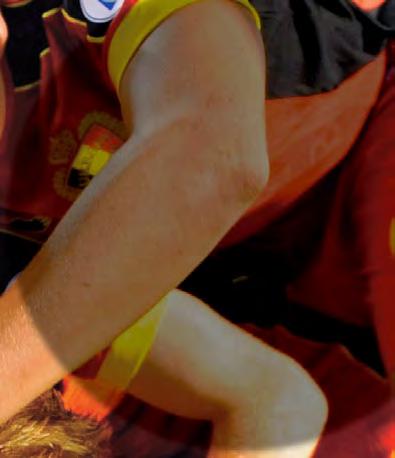

77
PHOTOS: GETTY IMAGES


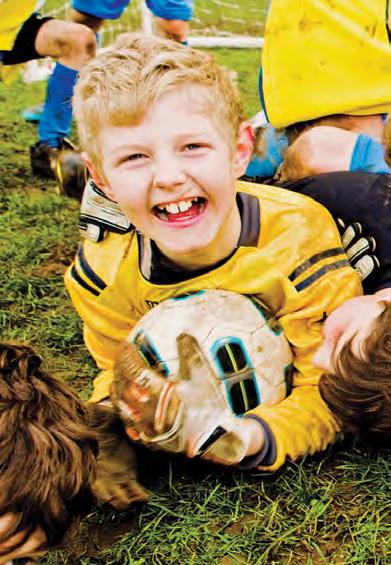
 PHOTOS: GETTY IMAGES; (LEFT) SIMON ZO/REUTERS
PHOTOS: GETTY IMAGES; (LEFT) SIMON ZO/REUTERS

THE STARS OF TOMORROW


Nobody knows who they are yet, but the future belongs to them. Whether it’s on the streets of Rio de Janeiro (above left), on the dusty soils of Africa (this page), on British pitches (below right) or in the highlands of Tibet (below left)—more and more girls and boys around the world love playing football and emulating their great idols. After all, Messi, Ronaldo and football heroine Marta Vieira da Silva and co started off small too.





79
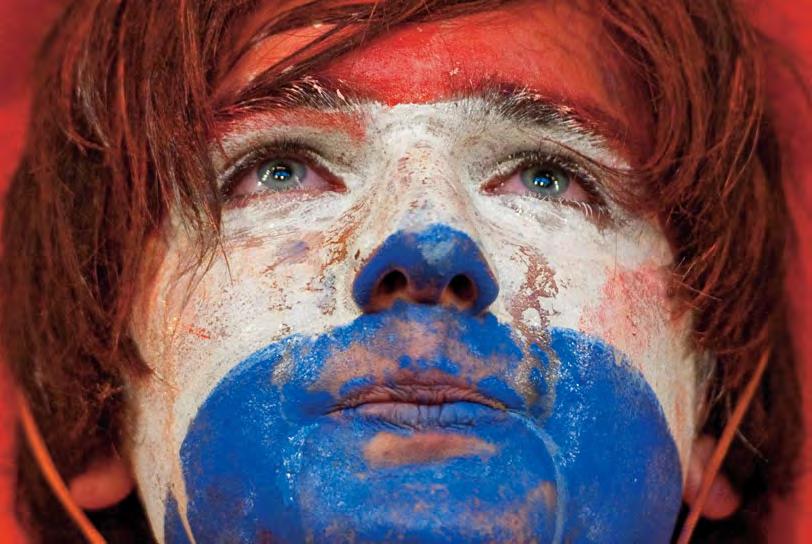

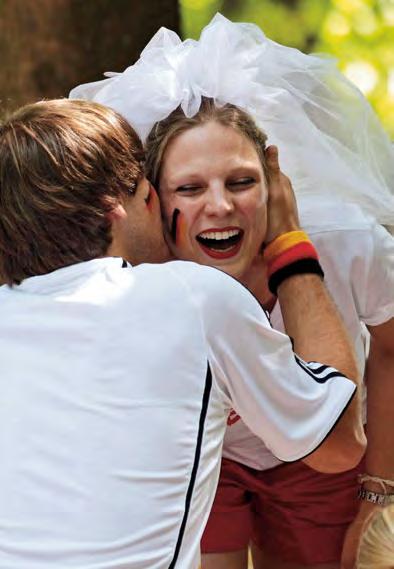



THE TWELFTH MAN

The fans. They cheer, laugh, celebrate and suffer with their team. Virtually every game in a World Cup is a sell-out. And those who don’t make it into the stadium support their team at home on TV, the radio or at a big screen event. In 2010, over 700 million people watched the final between the Netherlands and Spain—a new record in viewing figures.




 PHOTOS: (THIS PAGE) ALLSTAR PICTURE LIBRARY/ALAMY; OPPOSITE (RIGHT) PICTURE ALLIANCE/DPA (BELOW) © GETTY IMAGES
PHOTOS: (THIS PAGE) ALLSTAR PICTURE LIBRARY/ALAMY; OPPOSITE (RIGHT) PICTURE ALLIANCE/DPA (BELOW) © GETTY IMAGES
Actor stephen mangan is best known for his appearances in Green Wing, Dirk Gently and the Bafta-nominated series Episodes
If I Ruled the World Stephen Mangan
No one with clacky mouth would be allowed on the radio. You know that irritating sound when someone’s tongue and roof of their mouth stick together and they really need a drink to sort it out? It’s the second cousin to that white goo people sometimes get in the corner of their mouth. I’d issue a warning first—“Get this water down you”—but any persistence would result in being shot. Or a visit to the doctor.
I wouldn’t allow any silly jargon. My worst is “End of”, as in “That’s my final word. End of”. There are about 40 ridiculous expressions that I’d happily bring in martial law to eradicate. “Just saying” is another. I mean, has there ever been a more passive-aggressive phrase in the history of the planet? I’m not having it.
I’d give everyone a bicycle. The bikes would perfectly suit their needs—fast racers or luxurious push-bikes and some with trailers for the wife or kids. We spend our lives going from one little box to another; from our front room to the office, sitting in a car, bus or train


inspiration
illustrated by sam falconer
| 06•2014 82
and then back again. But it’s joyful to be on a bike in the fresh air and I’d love our cities to be car-free. I’d throw in a helmet, of course.
I’d remind motorists to stay to the left on motorways… There’s nothing more annoying than someone cruising at 60mph in the outside lane with a three-mile tailback. The French are tremendously adept at getting others to move over; they come right behind you, flash their lights and practically get in your car beside you. But that’s not the way of us Brits so we need to be more aware of how we affect others. I’ve often driven cars that couldn’t pull the skin off a rice pudding so it’s not like I’m a speed freak. I do have an old classic opentop car, but I don’t get to drive it often because I can’t fit the two kids in— they’re really cramping my style.
…And people to have their chats on the side of the pavement. Have your chat, we all want you to chat, but just notice that, if you’re standing in the middle of the pavement, you’re creating a bit of havoc around you. Maybe I’m too aware of how my behaviour affects others, but I find it incredible that so many people live their lives with the blinkers on.
I’d deal with the rampant wealth inequality. I’d bring in some sort of radical hard-core socialist agenda and take some money off the stupidly rich
and give it to help the poor. It worries me that we are allowing this situation to grow; the other day I learned that there are 85 people in the world who, between them, own as much as the poorest half of the population. That’s ridiculous—85 people out of 7 billion? How did we come to that?
Goats would be set free. And only their milk could be used—I think goat’s cheese is faintly satanic. As soon as goat’s milk is turned into anything else it becomes goaty and having goaty food doesn’t suggest culinary delights. You might as well go up to a goat and lick it. It’s wrong and unnatural.
I’d sort out city canals. They have a reputation for being slightly menacing—where people get murdered, shopping trollies go to die and there’s drippy weirdness from the underside of bridges. I live near Regent’s Canal in London and I like the fact that just a few steps down from the street you enter a different world. The towpath is nice and flat to run on and there’s all that great history that goes with them. Let’s zhuzh up our canals, lavish them with love and affection and make them magical places where you can escape the city—particularly within a two mile radius of where I live. As told to Caroline Hutton
stephen voices the title role in Postman Pat: The Movie.
06•2014 | 83
Meet Mr Tiffany (Mr T, for short): pen thief, beer drinker and all-round lovable rodent
LoveRat
By Alex A ndr A h A rney
When W e found him, he was blind and soaking, slumped in an alley, clearly close to death. He struggled to stand, then listed to one side and collapsed again. We watched him for a moment, horrified. And then, because we couldn’t just leave him there to die, we picked him up and brought him inside.
We laid him gently on the white expanse of our kitchen counter. After the blurry dark of the monsoon outside, the kitchen felt as bright and quiet as an operating theatre. My fiancé Colin placed him inside an eggshell-blue Tiffany box.

| 06•2014 84 colin beere
inspir Ati on
 Saved by a whisker: the alley rat that changed a young couple’s life
Saved by a whisker: the alley rat that changed a young couple’s life
We called him Tiffany, and then later Mr Tiffany—but most often, we called him Mr T.
That night, while I lay in our be droom, hiding from the creature’s inevitable death, Colin nursed him once an hour with eye-droppers of milk and energy drinks.
He was a street rat, no more than a few days old. His life had begun in the grimy alley beside our flat in Hong Kong, and to most people he would have embodied filth and dise ase. But we saw instead a fragile, unknowable life—and in the three years that followed, we came to see him as no average soul.
m r T en T e red our W orl d during a T ime of T r ansi T ion . Our wedding was three months away, and I was working seven days a week, often
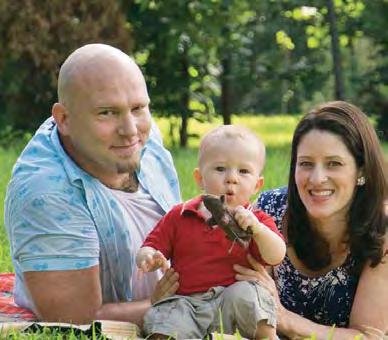
“Mr T pawed his way into our hearts.”
Alexandra with Colin and baby Louis T
long into the night. My job as a foreign correspondent kept me in constant motion and took me around the world; even owning furniture seemed like a big commitment.
I tried not to think about what that would mean for the future. Colin and I planned to have children some day, though some nights we could barely find time to have dinner. Taking in a half-dead rat that needed sustained attention just to survive hadn’t been on my agenda.
Which was why, when Colin and I found that Mr T was miraculously still breathing the next morning, we vowed to set him free as soon as he’d recovered fully. He’d survived, but he was a wild animal who deserved to live among his own kind. Not to mention that we had both read up on the extensive roster of virulent diseases rodents carry.
Unwilling to get attached, I avoided him like, well, the plague.
Still, as he gained strength over the following weeks, we couldn’t help celebrating Mr T’s tiny milestones: the moment a week after we found him when he opened his eyes in Colin’s palm, the night he lost his fear of our shiny floor tiles, the day he turned a bicycle into a jungle gym, his black shrimp’s eyes flashing in excitement as he clambered over its pedals.
Mr T began to make himself at home, confiscating post, pens and whole pizza slices and dragging them under the sofa, then chewing a crawl space
| 06•2014 86
love ra T

inside the sofa itself. It was clear he intended to settle in for the long haul. But could we really keep this animal? On the other hand, was it even feasible for Mr T to re-enter the wild?
We called a professor at Oxford University who specialised in rat be haviour. He told us that domesticated rats set free in the forest begin acting like wild rats within a few hours. There was nothing stopping us from bidding Mr T adieu and moving on with our lives.
Nothing except the fact that we
couldn’t resist his charms. Already, he’d begun to train us in his care.
By knocking over his dinner dishes or leaving them untouched, he made it clear that most vegetables—carrots, green beans, peppers—were inedible unless drenched in butter. He would eat peas, but only when shelled; the tops, but never the stalks, of broccoli; blueberries, but only if cut in half. His favourite foods were mushroom pâté, sushi and scrambled eggs. A few drops of beer were always appreciated. We prepared him two hot meals a day, which he ate with surgical precision, extracting the fattiest morsels first. He was too cute to let go.
Colin builT m r T a five-s T orey d W e lling from wood and chicken wire, which we furnished with the cushions of the sofa he’d destroyed. Mr T comp ulsively redesigned his home, shredding the cushions and shoving bits of stuffing into the gaps in the chicken wire. Sometimes he would snuggle under my palm, pushing his nose into the V between my thumb and forefinger. If I tried to move away, he would grip my fingers with powder-pink, gummy-palmed paws.
I began to see Hong Kong as a place teeming with more than just human life: the giant hoary moth wrapped round the corner of an office building, the bird squatting on the pavement outside a watch shop, the feral dogs that patrolled the area be hind our block. One afternoon, after noticing
06•2014 | 87 r e A der’s d iges t
Mr T chewed his way into the sofa and settled in
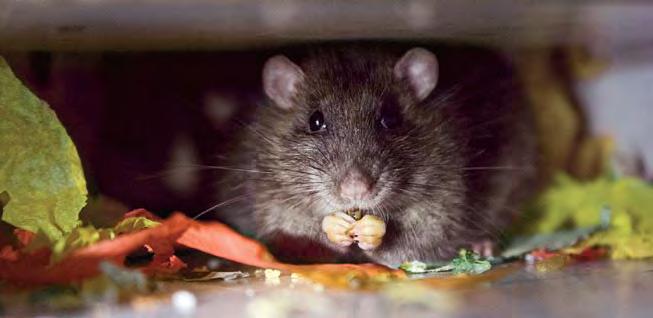
one of Mr T’s grubbier cousins in the same alley where we’d found him, I re alised the line we draw bet ween animals that are socially acceptable and those we find rep ugnant can be awfully arbitrary.
As Mr T steadily pawed his way into our hearts, Colin and I identified, for the first time in our lives, as pa rents. My husband was a rational and generous father. I was a neurotic, fussy mum.
Colin tried to see the world through Mr T’s eyes, adding a solid wooden door to Mr T’s home when he realised how much he liked his privacy, or adhesive sandpaper when he saw Mr T slip on his ramps. Meanwhile, I obsessed over Mr T’s health, fearing that every nap or failed attempt to mount the coffee table si gnalled terminal illness.
I felt our world conforming to Mr T’s needs—and I loved it. Colin and I stopped going out to dinner as often and instead spent evenings in
our living room, beaming proudly as Mr T dragged apples and socks into his house with great seriousness. Some nights, we stayed up on the sofa until two, three, four in the morning, waiting for the nocturnal Mr T to rouse himself and pad downstairs.
We stopped travelling together so one of us could always be home to keep him company, and when that was impossible, we enlisted house sitters and left an instruction manual nearly an inch thick. At parties we matched our friends’ tales of their children with news of Mr T’s latest tricks and his most recent fascinations: wooden knives and forks, starchy restaurant napkins, salmon sashimi.
I posted photos on Facebook of Mr T eating green beans, his paws covered in tomato sauce, or Mr T in repose, his whiskers a halo around his face.
And all the while, we grappled with the fact that Mr T didn’t have much time. On the streets, most rats die
| 06•2014 88
love ra T
before their first birthday. In captivity, many die by the age of three.
n o T long af T e r he T urned T W o, Mr T’s once rapid pace slowed to a jog, then a waddle, and he slept more solidly through the days. But he was determined to keep going. When, as I’d often worried he might, he developed a tumour—it was as large as his head—we found a microsurgeon who removed it, and Mr T sprinted across our living room the same day.
beside a picture of him in our living room, and tried to adjust to the sad fact that we didn’t get to be Mr T’s mum and dad any more. But shortly after his passing, Colin and I became parents to a son, whom we named Louis T.
A few years earlier, we’d struggled to find even a spare hour —but Mr T taught us to make room in our lives for the future we wanted, to be more empathetic, more patient. He taught us to love unconditionally.
“Mr T TaughT us To Make rooM in our lives for The fuTure we wanTed”
When a spinal condition paralysed his back legs, he adapted by pulling himself up and down the ramps with his front paws. One night Mr T began to struggle to breathe. This time the surgeon couldn’t save him. Mr T died in Colin’s hands.
We had him cremated and held a small ceremony in which we scattered some of his ashes in the park behind our block of flats so he could rest near his family. We put the remainder of his ashes in an urn, which we placed
We’d found Mr T in one of life’s interstices, between dating and marriage, coupledom and parenthood. If it had been a dog or a cat slumped in our alley that night, there’d be no story to tell. We’d have taken the animal to a shelter. Knowing that nobody would do that for Mr T made us bring him into our home, and doing so made all the difference.
Some of our friends and family didn’t get Mr T. They never understood how we could love a rat. We never understood how, if you had the pleasure of meeting him, it was possible not to.
fingers on B uzzers
anne robinson: “of which hot drink is ‘eat’ an anagram?”
Contestant: “Hot chocolate?”
An extrAct from the weakest link (BBc entertAinment)

06•2014 | 89 r e A der’s d iges t
THE
OCTOBER 2012 ).
2012
m for more go to re A dersdigest.co.uk/inspir Ation
O,
OPRAH MAGAZINE (
©
ALEXANDRA HARNEY. www. ALEXANDRAHARNEY CO
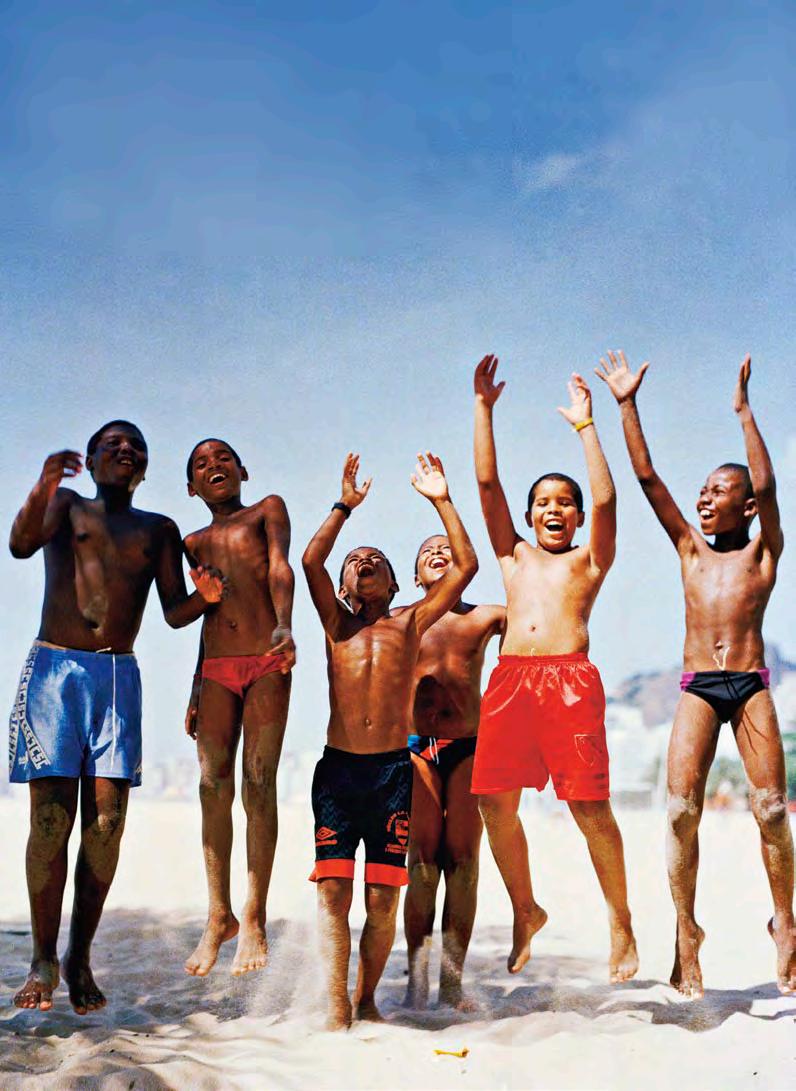
The People’s
90
travel & adventure
Beach
no one cares if you’re rich or poor (or interested in the World Cup) on rio’s Copacabana
By r o B ert kiener

On Sundays many of Rio de Janeiro’s 6.5 million residents head for Copacabana
9191
It’s my f I rst day on world-famous Copa C abana bea C h, two miles of shimmering sands, super-fit bronzed bodies and itsy-bitsy swimming costumes. And I’m already feeling like a fish out of water.
“You’re not wearing those, are you?” my Brazilian friend Renata asks me as she points to my baggy shorts.
“Why not?” I ask her as I butter my pale skin with a thick coating of SPF 100 sunscreen lotion.
She doesn’t answer. But I get her point as I look at the mostly tanned, fit cariocas (Portuguese for people born in Rio) who are enjoying what, for many of them, is their local beach.
Almost all of the women wear Brazilian bikinis, which, as Renata has explained to me, are much smaller than the bikinis their French sisters wear. And some wear tiny, barely there thongs, which cariocas refer to as “dental floss” tangas.
CopaC abana Is a pICture postC ard Come to lIfe; a crescent of fine white sand backed by an arc of high-rise buildings. To the north is the 1,299-foot high Sugar Loaf Mountain and to the south the majestic Christ the Redeemer statue. And like all the beaches in Rio, it’s enjoyed by everyone.
The beach is Brazil’s most democratic space.
Everyone is welcome
While some of the men wear surfer shorts, many more—of all ages —sport tight sungas, Brazilian trunks that are somewhat larger than Speedos but much smaller than the shorts I’m wearing; the ones that unmistakably mark me as a “gringo”.
Because I’ve come to Rio for a week to explore Copacabana beach and the fascinating role it plays in the life of Rio’s cariocas, I make a mental note: “Work on my tan, lose the baggy shorts and buy a sunga.”
“The most important thing you have to understand about Copacabana beach, and our other beaches, is that they’re one of the few places in Brazil where there are no class distinctions,” renowned Brazilian anthropologist and author Roberto DaMatta tells me as I visit him in his home just outside Rio.
“The poor residents of the favelas, the business executives and the students are all equals on the beach,” he explains. “Because everyone is nearly naked, there’s little to tell the classes apart, and because all the beaches are public places, everyone is welcome. The beach is Brazil’s most democratic space.”
It doesn’t take me long to discover
| 06•2014 92 Opening spread: si M e /e s t O ck p h O t O ; tra velst O ck44 / a la M y ; right: J O n s p aull/ d esign p ics/ cO rbis
the pe O ple’s beach
Something for everyone:
Copacabana and Sugar Loaf Mountain

that on Copacabana, as Michael Palin has noted, “the gap between the favela and the favored almost disappears”. Among the throngs of beachgoers who are jogging, playing volleyball, frescoball, exercising, swimming, surfing, sunbathing, and just plain people-watching, I bump
into Magno, a tall, lean resident of one of the nearby favelas.
“This is the people’s beach,” he tells me before he dives into the water for a long-distance swim across the bay with a group of fitness fanatics. “No one cares whether you’re rich or poor here; it’s the beach that matters.”
Close by, journalist Fernando Moraes is in an outdoor capoeira class (a mixture of dance, sport and martial art popular throughout Brazil) and explains that the beach also owes its eclectic nature to the densely populated high-rise neighbourhood itself.
“It‘s just a very interesting area. Today we have a 24-hour nightlife with all sorts of people from different parts of Brazil—rich and poor. You can find everyone here.”
Rio’s police regularly patrol the beach and have helped cut down the “sweeps”, where large groups of young men reportedly from the favelas swarm to rob locals and tourists alike. Nevertheless, beachgoers are constantly warned to take as little as possible to the beach and to watch for suspicious activity,
r eader’s d iges t 06•2014 | 93
Small wooden fishing boats are reminders of Copacabana’s fishing village

and more recently riots. Some of the high-rise hotels even have security guards on their roofs with walkietalkies, watching their guests at the beach through binoculars. The historic Copacabana Palace Hotel has a staff of 32 highly trained guards.
I learned the hard way during my first day on the beach that it pays to be watchful.
“Shoeshine, mister?” asked the under-five-foot youth with a wooden shoeshine kit slung over his shoulder. He then pointed to my shoes, which now somehow sported a large glob of yellow mustard. Before I could refuse, he was on his knees brushing away.
He finished and, pointing to a sign on the side of his shoeshine kit, said,
“That will be 50 dollars!” Suddenly I realised he, or an accomplice, must have snuck up behind me a few minutes ago and squirted my shoes with mustard—an age-old scam. I was somewhat amused with his brazenness but his manner changed when I refused to pay him more than a few dollars. He grabbed the money and slunk away, cursing me in Portuguese. I learned later that I was lucky; he’d attacked other tourists for not ponying up the money.
CopaC abana’s role as “the people’s beaCh” is most evident at weekends and during large public events. When Pope Francis, the first Latin American pope in history,
| 06•2014 94
the pe O ple’s beach
Fernando Quevedo de o liveira/ a lamy
visited Brazil last year he celebrated a papal mass on the beach. More than three million flag-waving people poured on to the beach to greet him. Many of them slept on the sand in a massive night-long slumber party.
Rod Stewart reportedly outdrew the Pope; more than 3.5 million turned up for his beach concert in 1994. The Rolling Stones drew 1.5 million in 2006. The beach is also home to the world’s biggest New Year’s celebrations when more than two million revellers gather for a fireworks extravaganza and the chance to honour Iemanjá, the Afro-Brazilian goddess of the sea.
On Sundays so many of Rio’s 6.5 million residents head for Copacabana that town officials close Avenida Atlântica, the majestic beachfront promenade, and turn it into a pedestrian, bike, skateboard and rollerblade zone. Here, cariocas leaving the beach call out to acquaintances just arriving Boa praia! (“Enjoy the beach!”)
believe it or not, timeshares. As a Brazilian friend said, “Just sit still and whatever you need will eventually come by.”
After baking under Rio’s blistering sun, I find the 20C water is surprisingly cool as I wade in and then take a brief swim. The sea is calm, but that’s not always the case; sometimes large waves and riptides make swimming a challenge. And the sea is not crowded; many people seem content with merely wading or just staying on the beach.
“Pay attention to the cariocas,” Roberto DaMatta had told me.
More than three million flagwaving people poured on to the beach last year to see the Pope
This Sunday the beach is packed— it’s almost impossible to see any free sand between the throngs and the thongs. As I walk along the curving shoreline, I see an army of hawkers weaving between the sun lovers, peddling everything from bikinis to cold drinks to hats to footballs to,
“No one is reading. Instead, they’re peoplewatching. It’s one of our national pastimes.”
He’s right. Seeing and being seen is what Brazil’s beaches are about. I ask a beautiful woman who’s just emerged from the sea if she minds the hundreds of people, men and women, that seem to be watching her. “Not at all,” she says. “We consider it a compliment when people look at us. Latin people appreciate beautiful bodies. Don’t you?”
How could I disagree?
aCCordIng to some beaCh afICIonados, Copacabana may be past its prime. Admittedly, it’s lost a lot of its lustre compared with the
r eader’s d iges t 06•2014 | 95
days when Brigitte Bardot, Cary Grant and a host of jet-setters visited its now-closed casinos and swanky hotels. “Flying down to Rio” was long celebrated in films and songs. And the in-place was Copacabana beach.
Many claim the nearby beaches of Ipanema or Leblon have eclipsed Copacabana but don’t tell that to any of its locals.
“Ipanema? It’s snobby,” says local resident and realtor Lirian Rodrigues as she raises a finger aside her nose to reinforce the point. “Copacabana is more real. It’s more Brazil!”
Further proof that Copacabana is unique among Rio’s 70 beaches lies at its southern tip, just beneath the 100-year-old Forte de Copacabana. Shoehorned into this palm-treestudded corner is a fleet of small wooden fishing boats owned and manned by a colony of fishermen, proud reminders of the area’s history as a small fishing village.
Each morning at around 5.30am, before sunrise and long before the beach fills with visitors, these hearty, weathered fishermen help one another pull their boats from the sand to fish the waters off Copacabana.
“We’re proud we’re maintaining this way of life,” José Manuel Pereira
Rebouças, vice-president of the fishermen’s colony and president of a nearby favela, tells me. “Most people come to the beach to play. We come to work.” On a good day Rebouças and his fellow fishermen can each haul in 200lbs of fish, which they sell in their local shop.
after a few days explorIng CopaC abana, I’ve learned a lot about what makes it one of the world’s most famous beaches. I’ve also come a long way from my first day here when my pale skin and baggy shorts screamed gringo.
Well, my skin is not exactly nutty brown, but even if I don’t look like one, I’ve learned to come to the beach like a true carioca; carrying just a few Brazilian real; enough to rent an umbrella and a beach chair and pay for a few caipirinhas, Brazil’s potent traditional drink.
And about those baggy shorts. I ditched them and bought a green and yellow—the colours of Brazil’s flag— sunga, which I started wearing to the beach. Admittedly, it was XL but I didn’t care if anyone stared at me. After all, as the beautiful woman told me, “It’s a compliment when people look at us.” Boa praia!
that morning-after feeling
“i have six new people in my phone that i don’t remember adding. One of them is ‘bourbon yeah’. successful evening?”
from textsfromlastnight. C om
|
the pe O ple’s beach
06
2014 96
•





Micronutrients with iron, zinc & iodine, which contribute to normal cognitive function
Neurozan® is an advanced, comprehensive formula to help safeguard your daily intake of essential vitamins and minerals.
Including iron, zinc and iodine which help to maintain normal cognitive function and pantothenic acid which supports normal mental performance.
Neurozan® Original contains a specially developed combination of nutrients and is certified by Food For The Brain.
Neurozan® Plus dual pack provides even greater nutritional support with high purity Omega-3 from Norway. DHA helps to maintain normal brain function.
So if you’re looking for a supplement that’s different, keep Neurozan® in mind.










Neurozan® is certified by pioneering charity FOOD FOR THE BRAIN. www.foodforthebrain.org
From , chemists, Waitrose, Holland & Barrett, health stores & www.neurozan.com

People who eat nutritionally inadequate meals may especially benefit from vitamin and mineral supplementation.
capacity
but as a product inventor
former
value data. 52 w/e 2 Nov 13).
† Professor Beckett is not cited in the
of a health professional,
and
Chairman of Vitabiotics. *(IRI
ORIGINAL DUAL PACK WITH DHA ADNEUCONP 31-01-14E
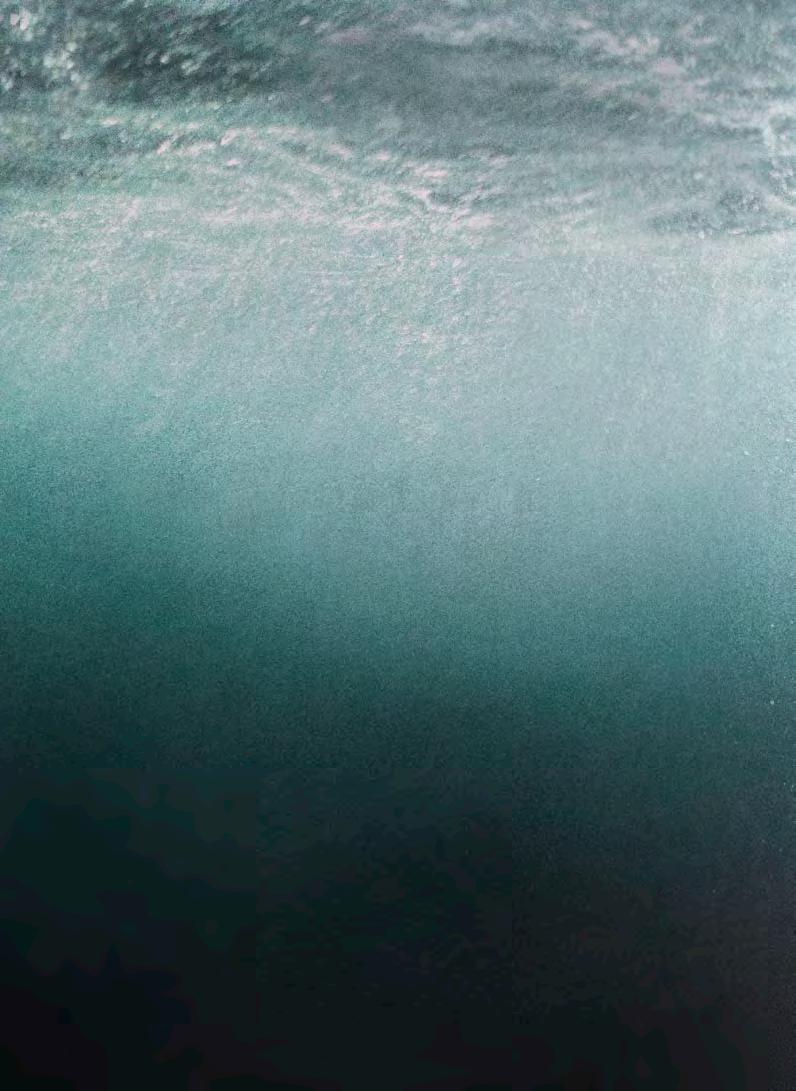
Danger in the D eep blue sea
A 40-ton grey whale lunges onto the deck, and Max Young seems sunk. What follows is the fight of his life
By Kenneth miller
98 travel & adventure

A dozen yeArs After he set out to sAil Around the world, MAx young wAs entering the hoMe strAight—an 850-mile haul from cabo san lucas, Mexico, to san Diego, then a 500-mile hop to san Francisco. on a moonless night in June 2012, his 50-foot cutter Reflections cruised northwards, propelled by a steady breeze, its rudder guided by autopilot. Young, 67, sat in the wheelhouse, gazing out at a magnificent display of stars. the retired schoolteacher wished that his wife, who had skipped this leg of the trip, were there to share the beauty of it all.
ayawn escaped him. Usually, Young slept all day when he was sailing solo so as to be fully alert to meet the challenges of night-time navigation. Today, however, he’d only catnapped: the ocean had been full of whales—greys, he guessed, migrating towards Alaska. He’d seen dozens, more than he’d ever observed at any one time. Lolling and showing off their flukes, they were wonderful to watch, but he was relieved when he’d got past them. Now he stretched and glanced at the autopilot gauges. The chronometer read 10.12pm.
Suddenly, Young heard a tremendous whoosh from beneath the hull. His adrenalin surged. An instant later, a whale easily as long as the boat rocketed out of the water in a cascade of silver spray, just off the stern. It seemed suspended upright above Reflections , the barnacles on the underside of its head glimmering in the vessel’s running light. Next
came a cacophony of crumpling metal and cracking fibreglass as the head and upper body of the 40-ton animal slammed onto the rear deck. The bow tilted skywards. For a moment, the sailor and the whale made eye contact. Young toppled forward into a pile of bags. As the creature struggled to free itself, the boat turned sharply to the left. When Young looked up, the beast was gone.
The tower that held his wind generator and radio antenna—ten feet tall, made of two-inch steel tubing— swayed, then collapsed into the sea. The stern railing was mangled, but the craft was still afloat. Young presumed that its inch-and-a-half-thick hull had survived the event.
h is first concern was to get B a c K on c ourse. He was now headed southwest, toward Polynesia. Young figured the collision had thrown the autopilot out of adjustment, so he tried to reset it. But the boat continued on its wayward path.
Perhaps the problem was with
| 06•2014 100 D A nger in the D eep bl ue se A previous spre AD : t ui De r o Y /c orbis
the steering. Young went below to check the lines, but they seemed to be normal. In the stern cabin, he noticed the floor and mattress were wet. Then, on his way back up the steps, he heard an ominous sloshing. Lifting a hatch beneath the small stairway, he was shocked to discover three feet of water in the bilge, an area between the floorboards and the hull. Some accumulation was normal, but a set of pumps usually kept it to a few inches.
Young began checking the likely sources of a leak: the pipes that ran from the galley and two bathrooms through the hull and the spot where the bilge pumps emptied into the ocean. Everything was sound. When he checked the bilge again, the water was still rising. Returning to the top deck, he tried steering the boat by hand, but the wheel would turn only a few inches.
Now Young was fighting panic. He quickly set off two emergency beacons. For good measure, he flipped the switch on his pocketsized beacon, which had a much smaller range but a signal that could provide rescuers with more precise information about his location. Only US Coast Guard facilities could pick up the
beacons’ frequencies, and the nearest base was in San Diego, 450 miles to the northeast. He wasn’t sure if the alert would make it that far, and, if it did, whether Reflections would still be afloat by the time help arrived.
To breed, grey whales migrate to the waters along Baja California, where Young’s accident occurred

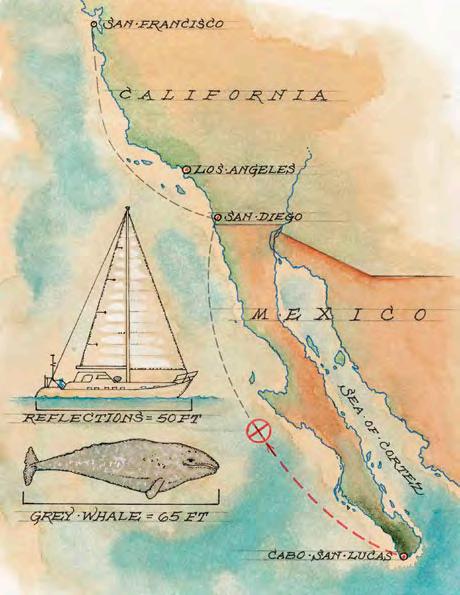
r eader’s d iges t 06•2014 | 101 MA p illustr A tion b Y Mike r e A g A n; MA x Y oung picture c ourtes Y o F e rin Michele c hil D s
Hoping to summon assistance from nearby, he grabbed a portable twoway radio—able to transmit over just a few miles—and shouted, “Mayday! Mayday!” There was no response.
Young sat down and took a deep breath. It’s been a good life, God, he prayed. I’m not a young guy. But my 23rd wedding anniversary is in two weeks, and my granddaughter’s third birthday is the same day. She’s got leukaemia, God. I’d really like to make it home.
He grabbed a twoway radio and sHouted “Mayday! Mayday!” tHere was no response. He took a breatH. It’s been a good lIfe, god, He prayed
getting married and studying for a master’s degree in industrial design, he financed his passion by teaching design and science at a high school. In 1987, when he was 43 and divorced, he bought Reflections —the big, sleek boat that matched his childhood dreams. He broke it in on jaunts along the California coast with his second wife Debbie and their kids. And then, in 2000, he retired and began his globe-circling odyssey.
max young grew up in northern c alifornia, one of seven children of a highway road worker and a waitress. His father moonlighted as a commercial fisherman, and Young often accompanied him on his expeditions. On board their small trawler, Young’s dad would describe his exploits as a B-24 pilot during the Second World War, when he flew bombing runs across the South Pacific. Aged 12, Young announced that he was going to sail to all the places his father talked about.
He spent the next five decades preparing for the voyage, honing his seamanship on boats of increasing size and complexity. After
To start off, Young followed the route his father had taken during the war: San Francisco to Australia, by way of Hawaii, French Polynesia, Samoa and Fiji. He and Debbie, a financial adviser, spent two years in Australia before returning to Sacramento to work and replenish their funds. From then on, whenever time and money allowed, Young would fly to the last place he’d left the boat and pilot it a few thousand miles further around the world—sometimes with his wife or a volunteer crew, and at other times alone.
There had been joy along the way— breathtaking sights, rewarding friendships—but also trouble. Huddled now in the pitching wheelhouse, Young
| 06•2014 102 D A nger in the D eep bl ue se A
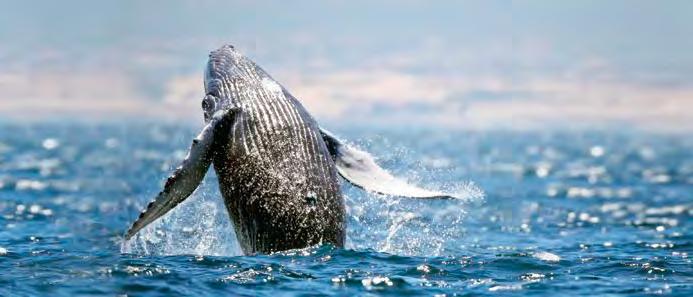
Grey whales breach the water to knock off barnacles on their skin. It’s also one of the ways they communicate
remembered terrifying storms. He recalled the time the wind failed off New Caledonia, and he had spent days disassembling the engine and putting it back together before it would start. He remembered the pirates off Malaysia who had threatened to ram his boat. None of those situations, however, was as dire as this one: his steering gone, his boat filling with water, and help out of reach.
at 1.30am, young wa s praying again when a plane circled overhead. His radio crackled to life. “This is Lieutenant Amy Kefarl, United States Coast Guard,” said a voice through the static. “Do you read me?”
Young’s heart was hammering as he answered: “Thank you, Coast Guard. I thought this was the end.” As he later learned, the signal from his
emergency beacon, carrying his approximate location as well as contact information for his wife, had reached a base near San Francisco. An officer had called Debbie, who confirmed that Young was four days’ sail north out of Cabo San Lucas. The cargo plane had then headed to sea, homing in on a blip on the radar from one of Young’s emergency beacons.
“We’ve found a container ship to pick you up,” Kefarl told him, after Young had briefed her on his encounter. But his elation vanished when she added, “The vessel is 45 miles out. It should reach you in about five and a half hours.”
“I don’t have that long,” he protested. “I’m taking on water fast.”
“Have you checked to make sure all the bilge pumps are working?” Kerfarl asked.
He hadn’t. With the boat listing, he’d feared it might capsize at any moment, trapping him below. But now he realised he had no choice but
r eader’s d iges t 06•2014 | 103 M A rcos Delg AD o/gett Y i MA ges
to risk it. When he opened the hatch, he saw that the pumps were covered with a mass of pipes and wires that had floated out of two storage bins. Only one of the devices was working; the others must have turned off when the debris settled on their switches.
fixing tHe bilge puMps Had bougHt soMe tiMe, but tHe water beneatH tHe floorboards was still slowly rising
He cleared away the junk and was pleased to hear the disabled pumps hum back into action. T hen he began snatching mementoes from the walls and stuffing them into a garbage bag—drawings by the kids, framed photos from his wanderings. He also grabbed a bag full of souvenirs for his family and hauled both sacks with him up the stairs.
w hen he got B ac K int o the wheelhouse, the voice on the radio had more instructions. “Mr Young, I’d like you to get your life raft into the water now. That way, it’ll be ready if you need to jump into it.”
Stepping onto the deck, Young noticed pieces of whale flesh lying near the stern. They were black on one side and glistening with bloodstained blubber on the other, and they ranged in size from banana to bread loaf. That must have hurt, Young thought. In spite of everything, he felt
a rush of pity for the beast and hoped it hadn’t been badly injured. He lifted the smallest chunk; it felt like rubberised leather. Then he pulled the life raft out of its storage case, and dropped it over the side. He tugged on its tether to inflate it. But it remained stubbornly flat.
Reflections also carried an inflatable dinghy, normally used for trips to shore, and Kefarl suggested that he try launching that. Young tossed in the bag of souvenirs before lowering the semi-flaccid vessel. To his chagrin, the bag toppled out and vanished beneath the waves. Worse, Young couldn’t find the pump to inflate the dinghy.
Suddenly, Young’s chances seemed much slimmer. He was wearing a flotation suit, designed to provide buoyancy if he were separated from his vessel, but it couldn’t protect him from sharks or hypothermia. If Reflections went down before the rescue ship arrived, he realised, he would be likely to perish with it.
Fixing the bilge pumps had bought Young some time, but the water beneath the floorboards was still slowly rising. As the hours crawled by, the vessel’s rocking grew more violent. In the wheelhouse, Young clung to a safety line and distracted himself
| 06•2014 104 D A nger in the D eep bl ue se A
by replaying his life. He recalled his first fishing trip with his father. He saw himself learning to sail a boat; he remembered his first car. He relived his children’s first steps and his first kiss with Debbie. And then came the great journey: he revisited Turkey and Thailand. He glided through the Persian Gulf to the Mediterranean and across the Atlantic. He sunned himself in the Bahamas, hiked through a Costa Rican rainforest. He was sailing through a pod of whales off Baja California. Night fell, and he was gazing again at the stars.
t hen young yawned, ru BB ed his eyes and watched the sun rise from the pearly sea. The boat was foundering now, waves washing over the gunwales. But something massive was looming on the horizon: a merchant ship. Young willed the vessel forward. Finally, the huge carrier drew alongside, with a rope ladder draped down its rusty flank.
Young handed the bag of drawings
and photos to a tall sailor. Then he followed the man up the ladder and collapsed, exhausted, onto the deck.
Recovering from his ordeal on the freighter, Young learned what had crippled his boat: crew members from the freighter had seen a crack in the stern and severe damage to the propeller and rudder.
After eight days, the ship reached Panama. Young made it home in time for his anniversary and his granddaughter’s birthday. The whale may not have been so lucky: two weeks after Young’s return, a 65-foot grey whale washed up on a beach in Baja, its head gouged with prop marks.
“It could have been a coincidence, but I doubt it,” he says. “I feel bad that such a beautiful creature had to die.”
Young also mourns the loss of Reflections . He hopes to replace her some day and to decorate the new craft’s cabin with the family artwork he salvaged. And despite his losses, he’s thankful for his memories. “Those,” he observes, “we can keep for ever.”
Better t han “ y ous g uys”
real (and weirdly accurate) names for groups of professionals:
• A group of accountants is called a balance
• A group of librarians is called a shush
• A group of bowlers is called a keg
• A group of dermatologists is called a rash
• A group of creditors is called a curse
from A Compendium of ColleCtive nouns By woop studios (chronicle BooKs)
r eader’s d iges t 06•2014 | 105
By kate pettifer
My Great Escape: Northern Highlights


Reader Mandy Huggins from West Yorkshire reveals a soft spot for Northumberland

Kate has driven huskies in the Arctic, sailed the Atlantic and swum with penguins in Devon.
Tell us about your favourite holiday (send a photo too) and if we include it on this page we’ll pay you £50. Go to readersdigest. co.uk/contact-us
Our favO urite part O f the english c Oastline is Northumberland, and my partner Mark and I go back year after year. The Northumberland Coast Walk is hard to beat, as the dramatic landscape is scattered with castles, coves and cliffs, and punctuated by tiny seaside villages and uninhabited islands.
Alnmouth makes a good base—we stayed in the centre of the village in a cottage called The Watchtower, which was once a coastguard’s lookout. It’s tucked away in the grounds of a large house and has its own secluded terrace and open views over the estuary from the upstairs living room. There’s a good choice of pubs, shops and restaurants. We spent a lot of time in The Red Lion (right)— a coaching inn full of character, serving local beers and great food.
I recommend the crab sandwiches for a bar lunch, and in the evening

travel & adventure | 06•2014 106
Mandy Huggins and the remains of a boat at Bamburgh Castle
we dined in the restaurant and enjoyed the Northumberland venison sausage and Craster kipper pâté.
On our walks, we discovered the puffin and tern colonies on Coquet Island and the mudflats at Lindisfarne. We warmed up with a cup of tea after a stroll around the magnificent gardens at Howick Hall, erstwhile home of Earl Grey, and stocked up with delicious Craster kippers before walking to the impressive remains of Dunstanburgh Castle.
At the Ship Inn in Low Newton they brew their own beers, with wonderful names such as Sandcastles at Dawn and Red Herring. They do a mean crab sandwich as well. The sunsets in this part of the world are beautiful—dusk at Bamburgh Castle takes some beating.
A few miles inland from Alnmouth is Alnwick, where you can visit the castle and its fabulous gardens (where Harry Potter was filmed), or spend hours in the secondhand book shop Barter Books. It’s worth taking a bag of unwanted books with you—they then credit you with a value to spend in the shop. But I warn you, it’s difficult to come away with fewer books than you went in with!
northumBria Cottages (01665 830 783, northumbria-cottages. co.uk) has three-night stays at The Watchtower in Alnmouth (sleeps two) from £221. Single rail fares from London to Alnmouth start at £16 (03457 225 225, eastcoast.co.uk).
postcard from… the north cape

On the island of Magerøya in Norway, a cliff 1,000 feet high juts into the sea. It’s not the northernmost tip of Europe, but it’s the most northerly accessible tip—with an imposing globe sculpture signposting where the Arctic and Atlantic oceans meet. Only the island of Svalbard separates you from the North Pole.
Visit in summer for unbroken views of the midnight sun. A landscape of parks, fjords and forest, Lapland at this time of year is yours to enjoy— snow-free. For a few months, it’s a playground for outdoor pursuits such as cycling, fishing and canoeing, with no shortage of daylight hours during which to enjoy its charms.
disCover the world has a 14night self-drive trip through Finland’s lakes and forests to northern Norway and the North Cape. Above the Arctic Circle starts at £1,630pp, including flights, 14 nights’ b&b and car hire (01737 214 291, discover-the-world.co.uk).
06•2014 | 107
Magerøya, the extreme north of Europe
Things to Do This Month
Go n ow
YOu d On’t need tO head tO

sc andinavia for beautiful fjord scenery. Sherpa’s new self-guided walking tour of the Austrian Lake District launches this month. Don your walking boots and prepare for gentle lakeside hikes and panoramic yomps into the peaks—backdrop courtesy of the green and pleasant Hoher Dachstein range. Stay at different hotels along the way with a choice of routes each day. From £660 (020 8577 2717, sherpa-walking-holidays.co.uk).
stay n ow
t he team
behind lOnd On cO cktail Week launches London
Wine Week from June 2–8. Buy a £10 wristband to qualify for a pocketsized guidebook and discounted tipples around the capital. Alongside an impressive roll-call of participating restaurants, wine merchants will be organising events such as masterclasses and meet-the-maker sessions, plus offering discounts to wristband wearers (londonwineweek.com).

book n ow
f rO m the

end O f this m O n th, there will be direct flights from the UK to the Colombian capital Bogotá —Avianca will fly four times a week from Heathrow. Tour operators include Chameleon Worldwide, which has nine itineraries to choose from. Its Highlights tour takes in the capital, the seaside city of Cartagena and the coastline around Tayrona. From £2,220pp including flights (01962 737 647, chameleonworldwide.co.uk).
website of the month
theh O telguru.c O m Founded by journalist Fiona Duncan and hotel-guide series editor Leonie Glass, this site can help you find a hotel by destination or by type (spa, ski, family-friendly, etc), covers the UK, Europe, North Africa and more. There are inspiring round-ups for UK cities and an offers page, pooling seasonal deals. For tailored advice, use their Ask the Guru service: the team will transform your getaway wishlist into a personalised hotel shortlist.

t R avel & adve N tu R e | 06•2014 108
for more go to readersdigest.Co.uk/travel-adventure
Hallstatt in the Austrian Lake District

Where history lives



Jersey brims with unforgettable places waiting to be explored. Tranquil places like Elizabeth Castle, perched on a rocky islet in St Aubin’s Bay, the island’s defence for over 400 years. Magnificently preserved places like Mont Orgueil Castle and mysterious places like Neolithic La Hougue Bie, one of Europe’s finest ‘passage graves’. Thought-provoking places such as the award-winning Jersey War Tunnels, which tells the story of the five-year German Occupation and the ever-present remains of coastal fortifications built by Hitler as part of his ‘Atlantic Wall’. Add a mild climate, easy travel by air or sea from the UK and great-value o ers, and you’ve discovered Jersey.
jersey.com









*Return price per person, including taxes, with easyJet from Gatwick. Price correct at time of print
*
Flights £ from 62rtn
Small Pension Pots: What You Can Do With Your Cash
Still wondering what to do with your pension after the Budget? Here are the rules for this year
By jasmine B irtles

Jasmine is a personal finance writer and the founder of moneymagpie. com
pension pots under £10,000. If you’re over 60 and you have some pension pots that are each worth less than £10,000, you can take the money out as a cash lump sum. It doesn’t matter how much you’ve got overall in pension savings, if you’ve got a few pensions with a few thousand pounds in them, you can empty them and put the money into something more sensible.
The Government is also increasing the number of personal pension pots you can access—to three, plus one occupational pension. So in total the most you can take out is £40,000 in one year.
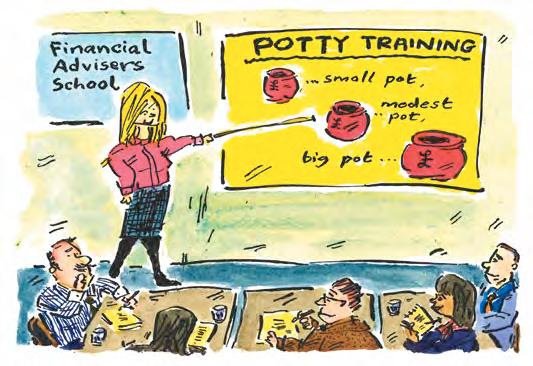
| 06•2014 110 money
cartoon by steve way
if you have a pension pot under £30,000. If you’re under 60 and have a pension pot under £30,000, or if you’re over 60 and your TOTAL pension savings are worth less than £30,000— whether that’s in one pension or lots of smaller ones—you can now take ALL of that out as a lump sum.
A quarter of it will be tax-free, but the rest will be taxed (probably at 20%, but it depends how much other cash you’ve made in that tax year).
To do that you must contact your various pension administrators and fill in an application to withdraw your savings, which will include a disclaimer that states your total pension wealth is below £30,000 (apart from the £40,000 in little pots). You need to be very careful that you don’t have pensions elsewhere that you’ve forgotten about or that may be worth more than you think. If you say your pensions are worth less than £30,000 and it turns out they’re worth more, your money will be treated as an “unauthorised payment” by HMRC and you’ll get a 55% charge.
If you’re in any way unsure, speak to an independent financial adviser (one that you pay) to find out what the situation is.
if you want to do a “capped drawdown”. This is where you take lumps of cash out of your pension each year on top of, or instead of, actual pension payments. If this idea appeals, you’ll be able to take more out under
the new rules. Instead of only being allowed to take out 120% of the Government rate, it’s now 150%.
Usually drawdown is only available to those who have pots of at least £50,000, but already companies are starting to change their rules to allow people to dip into their pension cash using capped drawdown.
To do this, talk to your pension providers and a financial adviser.
if you want a “flexiBle drawdown”. You’ll only need £12,000 of secured pension income from other sources (such as your state pension or an annuity from elsewhere) to make unlimited withdrawals through what’s called “flexible drawdown”.
what will happen in april next year? Anyone over 55 will be able to take the whole of their pension out if they want (although remember that there are tax implications if you take a lot of cash out in one go).
So this means that if you have a £100,000 pension you could take £25,000 tax-free and then withdraw the other £75,000 to do what you like with it (after paying tax on it).
But you will be able to take the money in bits over a few years so that you pay less tax. You will still be able to buy an annuity if you want. In fact, it might be a good idea to consider one later in life, say, when you’re over 80, as an annuity can be useful then.
06•2014 | 111
Get a Home for Free money
Although the housing market’s under pressure, you can still get jobs that come with somewhere to live.
charity fundraiser The charity Wesser provides all its fundraisers with shared accommodation, a commission-based paypacket and incentives throughout the year. The homes are usually fully furnished in safe areas. You can expect to earn about £1,500 a month. Visit wesser.co.uk.
hotel joBs Large and small hotels offer accommodation with certain jobs, particularly in management. A range of agencies specialise in hotel work. Take a look at caterer.com to see jobs in hotels and b&bs with accommodation.
carer Some caring positions are live-in. You can often expect a bedroom with bedding and food provided. The average salary of a carer is around £16,600. Try carehome.co.uk.
nanny Live-in nannies earn an average of £20,500 a year and for some this is in addition to a gym membership and a car for personal use. Try an agency such as topnotchnannies.co.uk to find a job with good accommodation.
house sitting As a house sitter you live, short-term, in an empty home and benefit from a low rent of around £250 a month. Utility bills are usually covered. Two good house sitting sites are Ad Hoc and Mind My House.

Make Money from Fashion
The recent interest in vintage clothing —even Hollywood actresses are wearing vintage on the red carpet— means you can cash in by collecting vintage clothes, shoes and jewellery:
Think strategically
Most people start by collecting clothes from a favourite designer or decade. (Anything between the 1920s and 1980s qualifies as vintage.) You can either gather what’s already vintage or try to get new pieces that will become vintage. Items produced in limited quantities that are in good condition will hold or increase their value. Historical context will also add value. Dig around in fashion archives
| 06•2014 112
and read up on fashion history to see what trends were popular. Be discerning when buying, however. Mypoupette.com can offer advice if you believe your item may be a fake.
Start small
Sample sales are a brilliant way to pick up discounted stock. A sample sale is when a fashion house or designer has unwanted stock from a previous season that needs to be shifted. Try designersales.co.uk.
Accessories
These are increasing in value. Vintage handbags are valuable because of the leather used. Names to look out for are Vuitton, Chanel and Hermès. Six out of the top ten most expensive fashion-related items sold on eBay in 2010 were Hermès Birkin bags. Designer silk scarves are big bucks too, although they are harder to find. You can also even make money from couture and fashion memorabilia if it’s classy enough.
Selling your collection
It’s a good idea to get your stuff valued if you want to sell it. Valuations are free with Kerry Taylor Auctions in London although they’re by appointment only. Auction bidders will be serious collectors with deep pockets who compete with each other, and museums with large budgets also look for good-quality clothes at auctions.

the one thing you must do this month
…is get into swapping surplus food, seeds and cuttings. Lots of people with gardens and orchards will already have some fresh produce they can’t eat themselves—maybe you do too—so if you don’t already sell, give or swap with your neighbours, start something in your area so that you can all benefit. Also, join an organisation like localfoodnetwork.org.uk, which keeps food producers in touch to swap and share excess produce and holds courses on how to pick food for free in the hedgerows!
jargon Buster
investment bank: These banks specialise in large and complex financial transactions such as underwriting, helping investors buy shares, overseeing mergers and acting as a broker and/or financial adviser for big companies that invest.
this month’s
do you love cheese or know someone who does?
Pongcheese.co.uk is offering you 10% off any of their delicious cheese selections with the code PonGSAVe10. The offer runs until December 31 and the code has one use per customer.

06•2014 | 113 r eader’s d iges t
for more go to readersdigest.co.uk/money
Easy recipes you can cook in thirty minutes
Wild rice and fennel salad
the temperature's rising, so it's time to pack your picnic basket and head outdoors for an alfresco feast. This easy-to-make salad works brilliantly on its own or with chicken or game, so it will make a perfect addition to your spread. Prepare it in advance to let the sweet flavours of the grape, orange and raisins mingle with the earthiness of the rice
serVes 4–6
175g American easy-cook wild rice and long grain mixture • Salt • 250g cucumber • 250g Florence fennel • 6 spring onions • 125g seedless ruby grapes • 50g skinned hazelnuts • 25g raisins • 1 orange
For the dressing:
3 sprigs chervil
• 2 sprigs each of tarragon and parsley
• 6tbs hazelnut or walnut oil
• 1tbs white wine vinegar
• Salt and black pepper • 4–6 sprigs tarragon (to garnish)

1. Bring 425ml of water to the boil, add the rice and a little salt, cover and simmer for 18–20 minutes, or until the rice is cooked and all the water is absorbed.
2. Meanwhile, rinse and dry the cucumber, fennel, spring onions and grapes. Finely dice the cucumber; trim and thinly slice the fennel and spring onions and halve the grapes. Place in a salad bowl. Chop the hazelnuts and add along with the raisins.
3. Wash any wax from the orange and grate the rind into the salad.
4. To make the herb dressing, squeeze 3tbs of juice from the orange and pour into a small bowl. Rinse, dry and finely chop the herbs and add to the juice with the oil and vinegar. Whisk together, then season to taste.
5. Drain the cooked rice and rinse it briefly under a cold tap. Drain well, mix into the salad vegetables and pour the dressing over. Garnish with sprigs of tarragon.
for more go to readersdigest.co.uk/food-drink
| 06•2014 114 food & drink
photographed by fabfoodpix

Off with their heads!
QA friend of mine was criticising the number of dead flowers in my garden the other day. I often don’t have time for “deadheading”, so is it that important?
AYes it is! Promptly snipping off fading or dead flowers does two things: it gets rid of insipid colours that detract from the overall display, and it ensures that plants channel their energy into creating more beautiful flowers instead of developing seed heads.
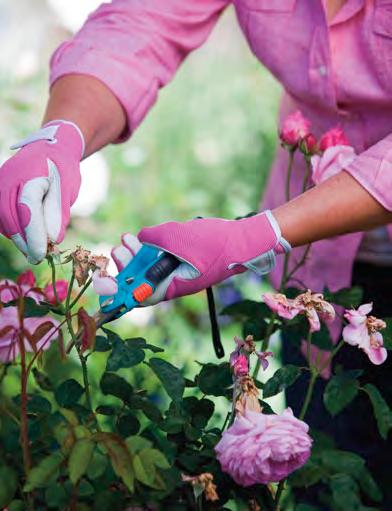
After cutting growth back, give the plants a thorough watering and a light application of plant food, such as a dilute liquid feed. This will stimulate new growth and plenty of flowers.
Q
I need to give my hedge a trim, but the range of tools in my shed is rather limited. What’s the best equipment to use?
A The choice of equipment depends on the size of hedge and the amount of energy you have.
Garden shears for hand trimming come in lightweight and heavy-duty models. Choose light ones for a softstemmed hedge, but use a heavier model for thicker growth. Shears with telescopic handles give extra long reach for tall hedges.
Hedge trimmers come in a range of sizes and are powered by petrol or electricity. For safety, use a circuit breaker, or residual current device (RCD), when operating an electric hedge trimmer from the mains. Wear protective clothing and don’t work in wet conditions. Rechargeable battery-powered trimmers are safer.
| 06•2014 116 burke’s backyard/alamy
home & diy
gArdening
QIs this is a good time to tackle bindweed? If so, how should I go about it?
A
It’s always best to tackle this and other tenacious perennial weeds before they flower and seed. The weedkiller glyphosate is the most effective, but since it kills any growth it touches, start by training the bindweed away from the host climber by sticking bamboo canes into the ground up which the weed can grow. Then slip the growth off the canes and apply the glyphosate within a polythene bag to prevent it from coming into contact with other plants.
QMy garden isn’t exactly a sun trap, so how can I ensure that my bulbs thrive in the shade?
A
Although most bulbs prefer to grow in full sun, some kinds are unaffected by, and even appreciate, the shade cast by deciduous trees and hedges. Other bulbs grow happily anywhere, but their flowers often last longer out of bright sunshine.
Before planting, enrich the top few centimetres of soil with moistureretentive organic material such as garden compost or leaf mould. To relieve dense shade, thin branches unobtrusively to admit extra light and rain. And check your varieties— not all bulbs will perform well in shady or woodland conditions.
Submit your gardening questions at readersdigest.co.uk/contact-us

June CheCKliSt
Keep a look out for pests and diseases, including slugs and snails, aphids, vine weevil grubs— which attack the roots of containergrown plants—and fungal problems such as mildew.
Clear exhausted spring bedding. Weed and lightly fork the soil, and rake in a dressing of fertiliser. the bed is then ready for planting.
Sow bluebells, and other bulbs that grow well from seed, in trays in a nursery bed.
reAder’S tip
these small plastic mint boxes, which come in a couple of different sizes, are very handy containers for storing and dispensing seeds. many thanks to Fay amstutz of Hertfordshire for sending this in.

Send us your gardening tips—with photos, if possible. go to readers digest.co.uk/contact-us. We’ll pay £50 if we use them on this page.
06•2014 | | 117 nigel cattlin/alamy
GADGETS
BY OLLY MANN

Olly is a technology expert, BBC5 Live presenter and Answer Me
This! podcaster
SAMSUNG GALAXY
CAMERA 2, £399.95


It’s easy to be beguiled by this beauty. There’s the 21x optical zoom lens, capable of taking detailed photos. Then there’s the touchscreen operating system, enabling you to edit your images and post them to social media, upload them to a cloud or email them to a contact—all without wires or fuss. But, as so often with smart devices, the stumbling block is the battery life: do you really want to be charging your camera on a daily basis when on holiday?
HTC ONE M8, £529.95
OR FREE WITH CONTRACT




I’ve tested a lot of Android smartphones, but the M8 is the first I’ve actually traded in my iPhone for. The software isn’t as intuitive, but the hardware design is superb, from the aluminium cladding to the in-built speakers. The double-lensed camera takes superb snaps in low light, and allows you to adjust the focus even after photos are taken. The MicroSD card slot gives up to an additional 128GB storage, and HTC’s BlinkFeed app collates all your social and news feeds into one destination. Beat that, Apple! and
SUSHI BAZOOKA, £19.99
I suspect authentic Japanese chefs will view this gadget with the same disgust as Italians view stuffed-crust pizza, but can you think of a more fun way to make sushi than with a giant gun?

| 06•2014 118 HOME & DIY
FOR MORE GO TO READERSDIGEST.COM/HOME & DIY


And that’s just for starters…
In the coming months we’ll be adding many more products and services, so you can shop for what you want, when you want.
You can browse our full range of DVDs, CDs, books and accessories via our website: shop.readersdigest.co.uk
Please let us know if you wish to receive the Reader’s Digest Shop catalogue in the future and be kept informed of new products, services and exclusive offers.
Call and register your details with us on 0844 332 8080 and we’ll add you to our mailing list.


Shopping just got easier!
We’re opening our doors for business with the very best in entertainment, bringing you a wide selection of DVDs, CDs and Books.
To welcome our subscribers on board, we’re giving you an exclusive 10% off your first order (plus free postage). To claim your discount simply quote RDS001 and your unique customer number when placing your order online or by phone.
Take a look inside your mailing pack for the introductory offer which also highlights some of the DVDs and CDs available. For a selection of books, take a look at pages 38 and 39.

shop.readersdigest.co.uk
Introducing… Exclusive Subscriber Offer 10% OFF! PLUSFREE P&P
Four friends who refuse to grow old gracefully and a new take on the classic revenge novel
June fiction
By James Walton

James writes and presents the BBC Radio
4 literary quiz
The Write Stuff
The Time of Their Lives
by Maeve Haran (Pan, £7.99; ebook, £5.99)
Claudia, Ella, Sal and Laura have been friends and drinking buddies since university. These days— rather to their surprise—they all find themselves in their early sixties. Occasionally, they feel a bit shamefaced about their possibly dated tastes (“The height of fashion in 1969, cheese plants were as quaint as aspidistras now”), but one thing they don’t feel is old—and certainly not in the way of the sixtysomethings they remember from their youth.
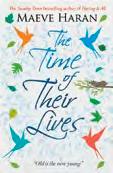
In 1991, Maeve Haran scored a bestseller with Having It All, one of the first novels to acknowledge the problems of juggling a career and motherhood. Here, she seems likely to strike a similar chord with the over-60s. Between them, the four leads face most of the issues of their generation, such as widowhood, unexpected divorce, ill parents and annoying sons-in-law. Yet Haran is far too skilful a story-teller for the book to read like an exercise in box-ticking. The characters’ own liveliness is reflected in a warm and often funny page-turner that strikes just the right balance between melancholy and defiance.
name t H e aU t H o R
(Answer on p124)
Can you guess the writer from these clues (and, of course, the fewer you need the better)?
1. In 1907, he was Britain’s first winner
of the Nobel Prize for Literature.
2. One of his poems, containing the phrase “those two impostors”, is regularly voted the nation’s favourite.
3. The film The Jungle Book is based on one of his children’s books.
| 06•2014 120
B ooks
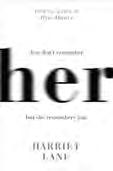
Her by Harriet Lane (Weidenfeld & Nicolson, £12.99; ebook, £6.99)
Harriet Lane’s first novel
Alys, Always was widely praised for combining sharply observed everyday life with something a lot more sinister. Her second now pulls off the same trick with equal aplomb.
The joint narrators, taking alternate chapters, are two women at different stages of parenthood. Emma, who used to work in TV, is hunkered down with two kids under five, and trying hard not to resent the narrowness of her life. Nina is married to a wealthy architect, doing well as an artist but with a 17-year-old daughter who’s drifting away from her. When the two meet by chance, Emma soon finds Nina remarkably helpful.
But what Emma doesn’t realise is they met as teenagers—when she spent a holiday in Nina’s Kent village and her glamour and self-assurance had an impact that she didn’t even notice, but that Nina has neither forgotten nor forgiven. And so, in a neat twist on the usual novels of revenge, it’s the more outwardly successful character who wants to get even, and poor Emma who has no idea how dangerous her new friendship is. The result is a novel that becomes increasingly—and at times excruciatingly—tense as it approaches its devastating final chapter.
PaPeRBacks oUt noW
The Ways of the World
by Robert Goddard (corgi, £7.99) The latest from one of the best thriller writers around. Set in Paris just after the First World War—and as full of jawdropping twists as you’d expect.
I Am Malala by malala
yousafzai and christina lamb (Phoenix, £7.99) The heroic teenager shot by the Taliban for championing girls’ education in Pakistan tells her story.
Queen Victoria by matthew Dennison (William collins, £8.99) Sharp, entertaining and pleasingly short biography of Britain’s longest reigning monarch (for now).
All the Birds, Singing by evie Wyld (Vintage, £8.99) A woman now living on a remote British island has flashbacks to her former life in Australia. Strong literary novel by a very highly regarded young writer.
The Outsider by Jimmy connors (corgi, £8.99)
As Wimbledon approaches, a candid memoir from the tennis great who, as it turns out, has definitely not mellowed with age.

06•2014 | 121
The penalty shoot-out is every England football fan’s nightmare. But how do you score from 12 yards? RD’s RecommenDeD ReaD
Dissecting the Penalty Kick
Most football fans probably have a love-hate relationship with penalty shoot-outs. On the one hand, they’re undeniably thrilling (and your team might win); on the other, they still feel like an unsatisfactory way to decide a big game (and your team might lose). They’ve also become such a crucial part of every World Cup that, with the next one starting in Brazil this month, the publication of Twelve Yards is particularly well timed. In theory, the book is about penalties in general—but, inevitably, it’s the big shoot-outs that dominate.
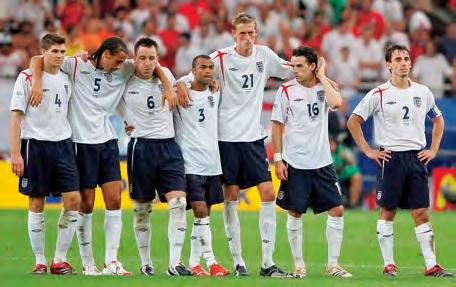
The England team endure yet another shoot-out, against Portugal at the 2006 World Cup
As Ben Lyttleton puts it, his aim is “to solve a simple question: how
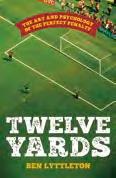
Twelve Yards: the Art and Psychology of the Perfect Penalty by Ben Lyttleton is published by Bantam Press at £12.99; ebook, £8.98
do you score—or save—from 12 yards?” Yet the longer the book goes on, the less simple this question feels. Penalties are a test of nerve as well as technique—and Lyttleton explores both from every conceivable angle: historical, anecdotal, scientific, psychological and statistical. Twelve Yards sifts through a vast amount of research into all aspects of kicking a football from the penalty spot to the goal. We learn, for example, that 78 per cent of all penalties are successful; that the most stressful part of taking a penalty in a shoot-out is waiting in the centre circle beforehand; and
Offside s p O rts p h O t O graphy / a lamy | 06•2014 122 BOOKS
even that if a player celebrates properly when he scores in a shootout, his team is “82 per cent more likely to win”.
But what really makes this such a vivid read is that Lyttleton appears to have spoken to everybody who’s ever taken part in a penalty shoot-out of any significance. As a result, he serves up an almost endless series of terrific set-pieces—even if some of them will appeal only to the more masochistic of England fans.
Take this passage, where Lyttleton talks to the man he reckons “has contributed most to England having the worst record from penalty shootouts of any country in international football”. Ricardo was Portugal’s goalkeeper in two of England’s many shoot-out defeats: the first in the 2004 European Championships; the second in the quarter-finals of the 2006 World Cup…
‘I knew l aMpard would be fIrst,’ said Ricardo. ‘I said to the guys, “If I save their first kick, we’ve won.” Because I knew if they see Lampard miss a penalty, they will never recover.’
Lampard shot to his natural side, to the right of the goalkeeper, and Ricardo dived to punch it away. The TV cameras focused on the England players, and you can see Gerrard looking up to the heavens, almost in tears. As Lampard trudged back to the halfway line, Ricardo saw the
RD exclUsiVe: Ben lyttleton’s cHoice of footBall Books
Brilliant Orange: the Neurotic Genius of Dutch Football by David Winner
A provocative examination of the ideals that make Dutch football so unique. The story of one player asking his dog whether he should move to Marseille still makes me smile (the dog said no, so he didn’t move).
The Miracle of Castel di Sangro by Joe mcGinniss McGinniss spent the 1996–97 season with the Italian village side Castel di Sangro against the backdrop of players falling out and boardroom scandal.
Futebol: the Brazilian Way of Life by alex Bellos An often amusing exploration into how World Cup host nation Brazil is shaped by its football obsession. Football Against the Enemy by simon kuper The author travelled to 22 countries to learn how football creates national identities, rather than the other way round.
I Am Zlatan Ibrahimović A footballer’s autobiography that’s rare not just for the story it tells about modern-day immigration, but also for its honesty.
06•2014 | 123 Rea D e R ’s Di G es t
‘‘
same reaction. ‘I saw Ferdinand and Gerrard and they went, Pfffff… Their heads went down, and I knew we had the advantage. I saw them deflate.’
Whenever it was Portugal’s turn to kick, Ricardo would look away from goal and directly at the crowd. ‘I could see one or two Portuguese fans, but everywhere else was English, all in white shirts. The whole crowd were nervous. I could see they were thinking, Not again. That was another advantage for me: it may be a little thing, but these little things can make a big difference’…
him walk towards me, man, I could see his face. He didn’t want to look at me! I saw that face, all their faces, when they came towards me. They look at me like they’re saying, ‘Oh my God, oh my God!’
“I saw all their faces when they came towards me. They look at me like they’re saying, ‘Oh my God!’ ”
Gerrard struck his penalty hard, but nowhere near enough to the post. ‘That one was my best save,’ said Ricardo…
[After two kicks each, it was oneall and] Hugo Viana, up next for Portugal, hit the outside of the post. Gerrard had the chance to put England ahead. ‘I’m behind my goalline,’ said Ricardo, ‘I’m not rushing. No time-wasting, no talking. I don’t need to go to Gerrard and say, “Hey, you’re going to miss.” If I’m doing that, I wouldn’t be focusing on what I need to do. I watch him, I study him, I read his behaviour. But when I see

an D t H e name of t H e aU t H o R is… Rudyard Kipling. (The poem is “If—”, with Triumph and Disaster as the two impostors.)
[After Portugal scored their next one] Jamie Carragher was next for England. He spotted the ball, turned away and started his run-up. The referee hadn’t blown his whistle, and two steps before Carragher reached the ball he blew twice to signify the kick wouldn’t count. Carragher kept on going and struck an excellent penalty that Ricardo watched go past him.
‘I knew the referee hadn’t blown so I just put my hands out and went, “Wait, wait.” The referee smiled at him and said, “Wait for my whistle.” I looked at Carragher then and the guy’s mind was screwed.’
Would Carragher go the same way? ‘I felt he was going to change his mind,’ said Ricardo. He was right: Carragher switched sides and the goalkeeper pushed the ball onto the crossbar. Portugal were 2–1 up, and only needed to score the next to win.
…Which, of course, they did.
| 06•2014 124 BOOKS
’’
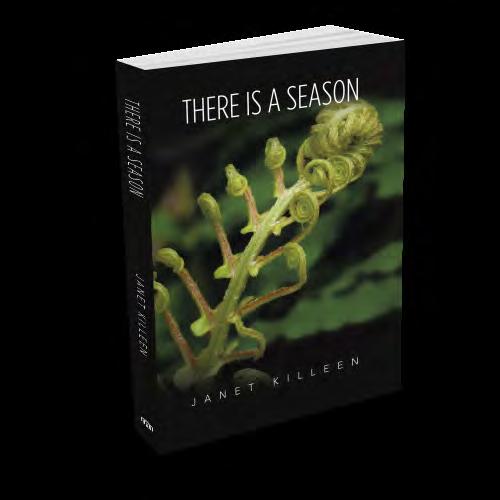
THERE IS A SEASON
Janet Killeen

978-1-4817-9706-1 | Paperback | £9.95
978-1-4817-9706-1 | Hardback | £17.99
978-1-4817-9707-8 | Ebook | £2.55
This collection of stories is deeply rooted in the intersection of moment, person and place. It explores the opportunities given to us to discover ourselves fully. Some explore the impact of abusive relationships and the potential for escape. Others examine the overshadowing of two World Wars and the social dislocation that was, and perhaps still is, their legacy.
Also Available

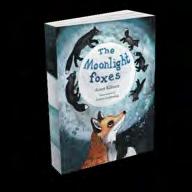
Recognition
978-1-4817-9411-4
Paperback
£9.95

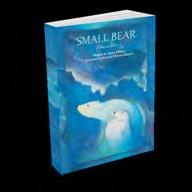
The Moonlight foxes
978-1-4918-7940-5
Paperback
£14.99
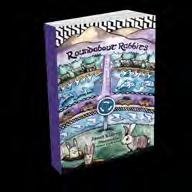
SMALL BEAR
A Dream Tale
978-1-4918-8333-4
Paperback
£13.99
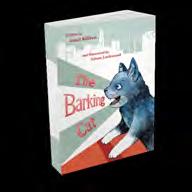
Roundabout Rabbits
978-1-4918-8511-6
Paperback
£8.95
The Barking Cat
978-1-4817-7555-7
Paperback
£13.99
To order, call 0800 1974150 or visit www.authorhouse.co.uk
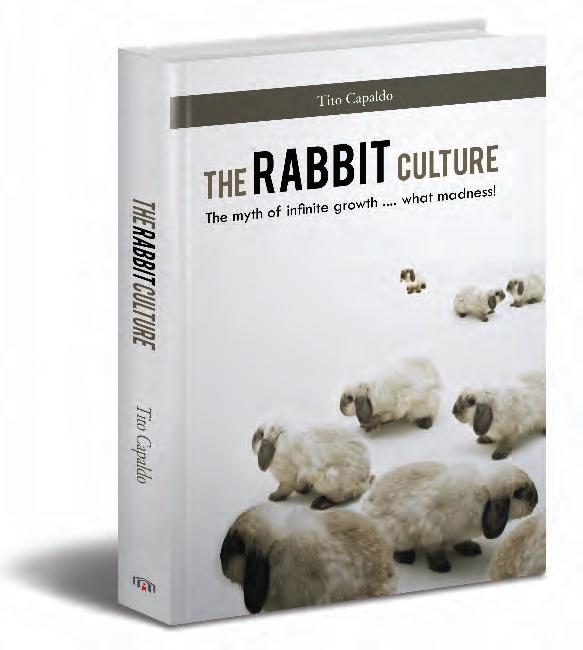
The Rabbit Culture
Tito Capaldo

The Myth Of Infinite Growth .... What Madness!
Paperback | $18.24 | 200 pages
Also available as an e-book and in hardback
Direct and vivid, Tito Capaldo’s novel The Rabbit Culture is based on the reallife tale of a seven-year old boy’s adoption from Romania after the collapse of Communism. It manages to deliver much more: Capaldo is a Layman with a mission, a fiery enemy of intolerance, overpopulation and the machinations of invincible state and clerical machines dramatised in his adoptive son’s traumas. Taught the classical rules of nature and its laws, simple enough to acquire in his home country, Capaldo had not bargained for how far Communism and Religions had nurtured a pesudo-scientific culture which threatened to leach the humanity out of its population.
Available Now!
Toll Free: 888-519-5121 | www.authorhouse.co.uk
Books

Best-selling writer Annabel Karmel is the author of books on cooking and nutrition for babies, children and families. She also appears regularly on TV and radio. Her Family Cookbook is out now.
Memoirs of a Geisha
By Arthur Golden
This is one of the most moving books I’ve ever read. Written in the first person, it tells the fictional story of Chiyo, a geisha working in Kyoto before and after the Second World War. It made me think about relationships, love and Japanese culture. The fact that it’s written by a man is extraordinary because the insight into women’s minds and emotions is profound. I understood how Chiyo and the women who were jealous of her wit and charm felt as clearly as if I were living among them.
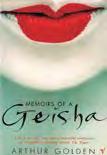
the people around her may not be who they seem so the book is a gripping psychological thriller. What kind of life would we lead if we had to start anew every day? Without memory we’d never judge people— would that be a good or bad thing? Is there a way of really finding out the truth about people? The book raises all sorts of questions that ask us to consider how we live our lives.
Delia Smith’s Complete Illustrated Cookery Course
Before I Go To Sleep
By S J WAtSon
I’ve recommended this book to all my friends. Chrissie develops a form of amnesia that means she can only store memories for 24 hours. She writes a journal every day that is a link to her past. It becomes apparent that

This book inspired me to write my first cookbook. It’s the bible of all cookery. I admire the detail in her instructions, which makes all the difference to the success of a recipe—how close something should be under the grill for example. It leaves little margin for error. She’s the one cook you can really trust. As told to Caroline Hutton

deliaonline.com/ a lbanPix
for more G o to re A der S di G e St.co.uk/ B ookS
THAT c HA nged my life
You Couldn’t Make It Up
Win £50 for your true, funny stories! Go to readersdigest. co.uk/contact-us or facebook.com/readersdigestuk
Before retiring as a teaching assistant, I helped a geography teacher with her class of seven-year-old pupils.
The teacher asked one of them, Daniel, to point out America on a map. He did so, and was praised by the teacher.
The class was then asked who had discovered America. There was a moment of quiet, then a pupil put up his hand and said, “Daniel.” jillian cohen, Leeds
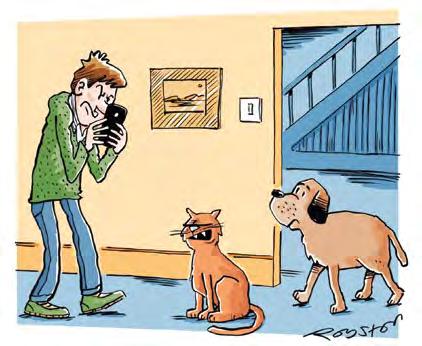
“It’s a battle of wills—I’m refusing to do anything funny for his YouTube page”
following a long illness, I went to a hair salon that had just opened nearby for a muchneeded makeover.
As I went in, I happened to notice a ferocious-looking woman sitting in reception. She had the physique of a wrestler and her short black hair looked like she’d styled it at home without the benefit of expertise or a mirror.
As the hairdresser hovered over
my head, she asked me how I’d like it to look. I whispered conspiratorially, “Well, not like her over there, that’s for sure!”
I laughed out loud at my hilarious little joke. A long and stony silence followed, after which the hairdresser said, “That’s my mother.”
I looked for a large hole to swallow me up. I was grateful to leave with any hair at all after that!
maria Berndt, London
| 06•2014 128 fun & games
a few years ago, a friend of mine was pulling out of a parking space while another car was waiting for him. As he passed, he noticed the other driver was making a rude hand gesture. He slammed on the brakes and got out of the car.
The other driver wound down the window and calmly listened as abuse was hurled at him. Then he said, “I’m an off-duty police officer— I was trying to signal that you didn’t have your seat belt on.”
lucy Pesaro, London
my Parents got my daughter a goldfish. We were discussing a possible name for the fish when my daughter said it already had a name: Sparingly. We were puzzled until she showed us the fish-food carton, which read, “Feed sparingly twice a day.”
joni cooPer, London
after Being Persuaded By my family, I finally agreed to phone my great-aunt to sing her “Happy Birthday”. It was only after I’d finished that the voice at the other end told me that it was the wrong number.
“Oh, I’m sorry,” I said, embarrassed.
“It’s OK,” the voice replied. “You obviously need the practice.”
leona henman, Denbighshire
emerging from the changing rooms in a clothes shop, I stopped to look at myself in the large mirror at the entrance. As I adjusted my top
button, a lady who was sitting in a chair waiting for her friend trying on a dress said, “Oh no, dear, I wouldn’t buy that. Not your colour at all.”
This would have been helpful— except for the fact that I was actually wearing my own clothes.
ruth ferguson, Essex
my grandfather is a PhotograPher and loves his joB— he often takes his pictures with him to show them off. When he visited friends, his host remarked on how fabulous they were and how he must have a really good camera.
Annoyed by the suggestion that his talent came from his equipment, he congratulated her at the end of the meal on the wonderful food, then added, “You must have great pans.”
alana jacoBs, Cheshire
i invited my neighBour susan around for tea. Dusk approached as we sat in the lounge overlooking the back garden. We were amazed to see my husband John returning from work, taking off his coat and performing a frantic dance. Eventually he noticed he was being watched, turned red and scurried upstairs.
When I later questioned him, he replied, “Oh, I was trying to turn on the security light so I could see to feed the chickens.”
I don’t think the new neighbours look at him the same way now!
margaret smart, Bristol
06•2014 | | 129










*Welcome Bonus for first deposit only. Minimum £10 deposit required. You must enter the promo code when joining and accept the Welcome Bonus when depositing. Sign-up offer ends 30 June 2014. Offer is correct at time of going to press. Operator reserves the right to cease or change Welcome Bonus or any promotions. We do not accept member registrations from countries in which real money online gambling is prohibited by law. Subject to terms and conditions of the Operator, available at www.readersdigestbingo. com We do not accept member registrations from countries in which real money online gambling is prohibited by law. For 24-hour support, freephone 0800 458 0770. This website is restricted to over-18s. Please play responsibly. For more information, visit www.gambleaware.co.uk Deposit £10 and get £25 free!




with code RDJune and get £25 free to play!
with £35 1 2 3 www.readersdigestbingo.com ADVERTISEMENT
* Sign up at www.readersdigestbingo.com Register
Play
Word Power
Current events often dictate which words are looked up in online dictionaries. Here are some terms that people have frequently searched for within the past year. See the next page for answers.
1. wonk (‘wonk) n—
By Emily Cox & H E nry r at H von
A: nerdy expert. B: abject failure.
C: double agent.
2. furlough (‘fur-loh) n—
A: temporary leave of absence.
B: long-distance trek. C: a type of militia.
3. acerbic (a-’ser-bik) adj—
A: top secret. B: growing in a desert. C: sarcastic.
4. clemency (‘kle-men-see) n—
A: petty crime. B: leniency.
C: election of a pope.
5. vacuous (‘va-kyoo-us) adj—
A: in recess. B: empty-headed.
C: irresistible.
6. austerity (aw-’ster-ih-tee) n—
A: heat wave. B: strict economising.
C: bitter disagreement.
7. cornucopia (kor-nuh-’kohpee-uh) n—A: trite comedy.
B: abundance. C: fantastic dream.
8. bellicose (‘be-lih-kohse) adj—
A: melodic. B: potbellied.
C: warlike.
9. moniker (‘moh-nih-ker) n—
A: milestone. B: nickname.
C: stand-up comic.
10. curmudgeon (ker-’muh-jen)
n.—A: dog breeder. B: grouch.
C: knockout punch.
11. reconcile (‘re-kon-siyl) v—
A: restore to harmony. B: banish.
C: put to extended use.
12. filibuster (‘fi-lih-bus-ter) v—
A: meddle. B: round up allies.
C: use tactics to delay or prevent an action.
13. capricious (ka-’prih-shus) adj—A: fickle. B: wearing a hat. C: forming an island.
14. ignominious (ig-no-’mi-nee-us) adj—A: disgraceful. B: lacking knowledge. C: using a false name.
15. indemnify (in-’dem-nih-fiy)
v—A: curse. B: imprison. C: pay for damages.
Play Word Power online by going to readersdigest.co.uk/wordpower
06•2014 | | 131
fun & gam E s
answers
1. wonk [A] nerdy expert. “A known computer wonk, John was recruited by a venerable tech company.”
2. furlough [A] temporary leave of absence, especially from the military. “The colonel gave his troops a furlough of two weeks.”
3. acerbic [C] sarcastic. “On most news shows, there’s more acerbic chitchat than insightful analysis.”
4. clemency [B] leniency. “Bobby’s lawyer asked the judge for clemency even though her client had been convicted of stealing billions.”
5. vacuous [B] empty-headed. “As Joy gave her report on cryptozoology, she noticed a lot of vacuous stares.”
6. austerity [B] strict economising. “After she lost her well-paid job, Ann was forced to practise austerity.”
7. cornucopia [B] abundance. “The ship’s stores were a cornucopia sufficient to last the voyage.”
8. bellicose [C] warlike. “Despite his bellicose demeanour, Jim is really a softie.”
9. moniker [B] nickname. “Tell me,
Matthew, how did you get the moniker Mr Excitement?”
10. curmudgeon [B] grouch. “In 12 years, that curmudgeon down the hall has never said hello.”
11. reconcile [A] restore to harmony. “The Hatfields and Smiths decided to end their bitter feud and reconcile.”
12. filibuster [C] use tactics to delay or prevent an action. “To block the passage of the Bill, the MP was prepared to filibuster for hours.”
13. capricious [A] fickle. “Nothing is more capricious than the weather in this country.”
14. ignominious [A] disgraceful. “This year, Manchester United have struggled with a number of ignominious losses.”
CHECk your pridE
People often look up hubris, which means “overbearing pride”. In ancient Greece, it conveyed an audacious attitude towards the gods. We see hubris in the story of the Titanic—built with excessive grandeur and lost on her maiden voyage— and in dr Frankenstein, who presumed to create life. Hubris is foolish pride that leads to a fall.
15. indemnify— [C] pay for damages.
“ ‘Somebody has to indemnify me for this broken window,’ the teacher told Dennis the Menace.”
voCaBulary ratings
9 & below:
Trending upward
10–12: Newsworthy
13–15: Headlining
Word Po W er | 06•2014 132

Have you seen our invisible hearing aid yet? No?








Our fantastic invisible hearing aid is small. Really small. And, because it fits slightly deeper in the ear canal than your average hearing aid, it’s virtually invisible when worn. That means you get all the benefits of hearing better without anyone understanding how you do it.
Whilst it can’t be seen the difference can be heard.
Just because this hearing aid is small doesn’t mean it’s less effective. We’ve made sure this tiny device has the high speed processors and clarity enhancing features of the very latest hearing aids. These are the things that make sure you get to enjoy all the great things life has to offer like conversations with friends and family, an evening out in your favourite restaurant or a cosy night in front of the TV. And you can enjoy all this with the confidence that whilst people might notice the difference in your hearing they definitely won’t notice your hearing aid.
If you like what you (don’t) see, call 0845 203 7662 and book a free appointment in store to find out more about this amazing little hearing aid.
“I hear normally, it’s as if I don’t have a loss and, because you can’t see them, no one else knows I do!”

Free hearing check
To book your hearing check simply call 0845 203 7662
Terms: Only one hearing check per year. Free hearing check for over 18s only. Subject to availability and eligibility. By appointment only. Call 0845 203 7662 (local rate, calls may be recorded for training purposes) between 8.30am and 6.00pm (Mon-Thurs), or 8.30am and 5.30pm (Fri) and 9.00am and 5.30pm (Sat). Valid until 8 July 2014.

For more information please visit Bootshearingcare.com
Not at all? Exactly.
Brain Teasers
Challenge yourself by solving these puzzles and mind stretchers, then check your answers on page xxx.




Cubing
When the shape on the left is folded to form a cube, which one is the only one of the following that cannot be produced?


spotting
There’s something wrong with one of these dice. Can you spot which one?
| 06•2014 134
A b A C D C D b fun & g A mes
holiday postcards

holıday postcards

holiDAy postCArDs
Can you find the seven differences between these two pictures? Circle them in the drawing immediately above.

symbols
Which of the boxed symbols completes the set?

06•2014 | | 135
A b C D
?
Complete this crossword and use the letters in the shaded squares to find the name of a wellknown actor.
| 06•2014 136 brain teasers 1 2 3 4 5 7 8 6 9 16 11 17 18 15 12 10 14 13 ConCise CrossworD
ACross 1 Head cook (4) 3 Walkway (4) 5 Scoundrel (5) 6 Compass point (4) 8 Prohibit (6) 10 Juic y (9) 13 Recognition (6) 15 Finished with (4) 16 Frighten (5) 17 Excursion (4) 18 Puddle (4) Answers :crossA 1 Chef 3 Path 5 oguer 6 aste 8 Forbid 10 ucculents 13 Credit 15 Done 16 larma 17 ourt 18 Pool :ownD 1 Camel 2 Fret 3 Peer 4 Handy 7 auces 8 Fault 9 anjob 11 cents 12 Legal 14 Dear 15 Dump het actor is eans eanb Down 1 Desert animal (5) 2 Wor ry (4) 3 Gaze (4) 4 Convenient (5) 7 Food dressing (5) 8 Flaw (5) 9 Musical instrument (5) 11 Smell (5) 12 Lawful (5) 14 Expensive (4) 15 Rubbish heap (4)
BrainTeasers: Answers
Cubing
Cube A. spotting
C is different because the visible spots on two adjacent sides add up to 7. On all standard dice, the spots on opposite sides add up to 7.
holiDAy postCArDs

£50 priZe Question
answer published in the July issue
Can you work out how many cherries are needed to balance scale C if scales
A and B balance perfectly?












holıday postcards ?




the first correct answer we pick on June 6 wins £50!* email excerpts@readersdigest.co.uk
Answer to mAy’s priZe Question
symbols
B. Each line contains one circle, one square and one triangle. Each line contains a yellow star, a white star and no star. Each line contains a green symbol, an orange symbol and a purple symbol. The missing symbol must be a purple circle containing a yellow star.
CoCK-A-DooDle-Doo
AnD the £50 goes to…
ray Dunham from Lincoln
06•2014 | | 137
reADer’s Digest
A B C D e D CoCoA l oD o K o
Laugh!
Win £50 for every reader’s joke we publish! Go to readersdigest. co.uk/contact-us or facebook.com/readersdigestuk
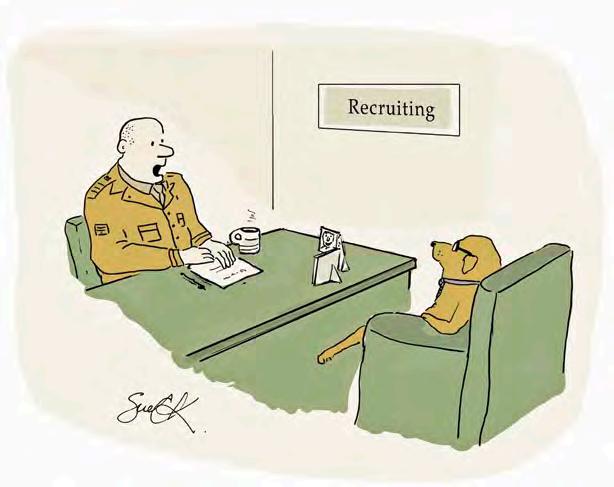
“Never mind your bark—what’s your bite like?”
a law-firm receptionist answered the phone the morning after the firm’s senior partner had passed away unexpectedly.
“Is Mr Smith there?” asked the client on the phone.
“I’m very sorry, but Mr Smith
passed away last night,” the receptionist answered.
“Is Mr Smith there?” repeated the client.
The receptionist was perplexed. “Perhaps you didn’t understand me. Mr Smith passed away last night.”
| 06•2014 138 fun & games
cartoon by susan camilleri konar
“Is Mr Smith there?” asked the client again.
“Madam, do you understand what I’m saying?” said the exasperated receptionist. “Mr Smith is DEAD!”
“I understand you perfectly,” replied the client, sighing happily. “I just can’t hear it often enough.”
seen on the internet
my ears were burning the other day. People were talking about me. In particular, about how I’d forgotten to put sunblock on my ears. comedian dave gorman
there was a zoo worker who was in charge of the exotic parrots. He wouldn’t follow management instruction on their care, preferring instead to do it his way. Eventually, he was banned from working with them.
He’s now known as the rebel without macaws.
ger o’sullivan, Cork, Ireland a group of racehorses are chatting in the stables when one starts to boast of his track record.
“Out of my last 15 races, I’ve won eight!” he says proudly.
“That’s nothing—I’ve won 19 of my last 27,” says another.
“Oh, that’s good,” replies an older horse. “But out of my last 36 races, I’ve won 28!”
At this point, the racehorses notice that a greyhound has been sitting
accidental partridge
Twitter account @AccidentalP tracks the silly utterances of broadcasters and celebrities, and lets you imagine them in the voice of Alan Partridge, Norfolk’s favourite fictional DJ.
@theJeremyvine Today we ask: have you ever walked through a plate-glass window?
@chrischibnall So delighted by this cup of tea and biscuit, I just googled “Who invented the custard cream?”
@rodneymarsh10 Only one word to describe Chelsea v Man City: absolutely mouthwatering.
@oxfordstreetw1 Battle of the beverage chaud. A colleague offers you a drink—do you opt for coffee or tea?
@mrallanmiller Didn’t win World Stone Skimming Championships but my stance was textbook.
@achrisevans Maybe the best ham sandwich I’ve ever had, and I’ve had some absolute corkers.
@leeroden89 Jet from Gladiators. Still got it.
@ed_dawesbbc Coming up on Drive: a parrot that sings “We hate Forest!”
06•2014 | 139
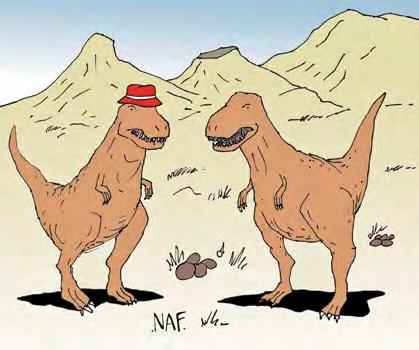
“I love your hat. One question: how did you put it on?”
silently in the corner, listening into the conversation.
“Excuse me, gentlemen, but out of my last 72 races, I’ve won 70 of them,” says the greyhound smugly.
“Oh my God!” exclaims one of the horses. “A talking dog!”
seen at reddit.com
i’ve Just read george orwell’s Nineteen Eighty-Four. It’s nothing like I remember it. No mention of Torvill and Dean winning gold or the Bucks Fizz coach crash. Disappointing.
comedian Jack dee
i was stealing things in the supermarket today while balanced on the shoulders of a couple of vampires. I was eventually charged with shoplifting on two counts.
sion thomas, Denbighshire
“sarcasm will get you nowhere in life,” my boss told me.
“Well, it got me to the International Sarcasm finals in Santiago, Chile, in 2009,” I informed him.
“Really?” he asked.
“No,” I replied.
seen at 9gag.com
i’m going to get a park bench dedicated to me when I die. But before I do, I’m going to change my name to Wet Paint.
comedian dave green
i walked into a fish ’n’ chip shop today.
“I don’t have any fish already cooked, and I’m out of cod, plaice, haddock and scampi,” said the bloke behind the counter.
“Better get your skates on then,” I replied.
seen at 9gag.com
what do you call ten rabbits
marching backwards?
A receding hare line.
vanessa smith, Mold, Flintshire
my wife says she’s divorcing me because of my obsession with television dramas.
But will she really leave me?
Find out next week!
seen on the internet
| 06•2014 140
cartoon by naf
l A u G h!
It’s official: the worst jokes ever
We’ve all groaned at unfunny gags, but rinkworks.com has compiled an archive of the really bad:
What did the fisherman say to the card magician? Pick a cod, any cod!
What caused the airline to go bankrupt? Runway inflation.
What’s the difference between bird flu and swine flu? If you have bird flu, you need tweetment. If you have swine flu, you need oink-ment.
What’s a frog’s favourite drink? Croaka Cola.
What does a wicked chicken lay? Devilled eggs.
She was only a whiskey-maker, but he loved her still.
Did you hear about the fire at the circus? It was in tents.
What bone will a dog never eat? A trombone.
What did the green grape say to the purple grape? “Breathe, you idiot! BREATHE!”
not-so-classic album covers (as seen at stevecarter.com)



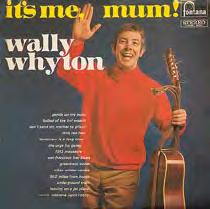

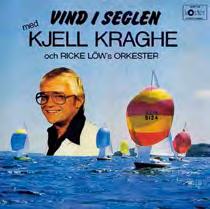

06•2014 | 141 r eader’s d iges t
for more go to readersdigest.co.uk/fun-games
AUTHORS
synopsis and sample chapters welcome, please send to:

CGC - 33 - 01, 25 Canada Square, Canary Wharf, London, E14 5LQ
0207 0388212
editors@austinmacauley.com www.austinmacauley.com
All genres welcome



DUCHY OF CORNWALL
HOLIDAY COTTAGES
Cottages in beautiful locations throughout our estates including Cornwall, Wales and the Isles of Scilly. All our graded cottages are 5 star and are refurbished, furnished and equipped to respect the style and age of the individual building.
Tel 01579 346 473
duchyofcornwallholidaycottages.co.uk

142
DIRECTORY
Nick
To advertise on these pages please contact
Page
BUY HOUSES FOR CASH FREE VALUATION 100% CASH OFFER NO FEES TO PAY COMPLETE WITHIN 7-28 DAYS
WE
Low Energy, Poor Skin? Try the Matol® Km formula of 13 organic herbs. Google ‘Matol UK’ today Matoluk.com Exclusive to ‘Reader’s Digest’. Ask about our special offer. Matol UK, 35 Felbrigg Cresent, Cardiff CF23 8SE Tel: 02920 733324 I spent £100s trying to ease my suffering and it is suffering in many ways. Now thanks to Matol Km I am happy again. Thank you Matol Km for giving me back my life as it was. Mrs. C.A. Miller, Lancashire It (Matol Km) is a truly remarkable product and I have no hesitation in recommending it to anyone. Susan Williams, South Wales










Tel: 07789178802 Email: nick.page@madisonbell.com 143 further5%Receivea of RDIG10614by10thyouritem.EnterJune. Sofa Beds • Sofas • Armchairs • Mattresses 0845 163 1848 A unique romantic gift Need to show someone that you love them? www.50reasonslove.com For the Ultimate Romantic Gift go to: 50Reasns Perfect for Birthdays, anniversaries and that special occasion. MAGIC-Stretch Stretchable bunion insert: flexible, padded, soft Best solution for feet with sensitive bunions Removable Insole may be replaced with a customized insole Call now for a catalogue: 0845 602 2868 Order online: www.meanfeet.co.uk request a catalogue online: info@meanfeet.com C M Y CM MY CY CMY K MF_RDAdvert_74x77mm.pdf 1 29/04/2014 15:17
Beat the Cartoonist!
win £100 and a car Toon prin T

April’s Winner
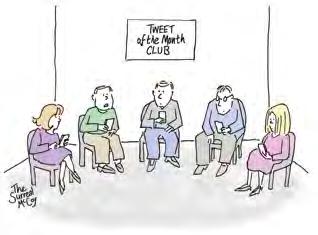
Think of a witty caption for this picture and you could beat the experts at their own game. The three best suggestions will be posted on our website in midJune alongside an anonymous caption from our cartoonist. Visitors can choose their favourite—if your entry gets the most votes, you’ll win £100 and a framed copy of the cartoon, with your caption added. Submit to captions@ readersdigest.co.uk or readersdigest. co.uk/caption by June 13. Vote online at readersdigest.co.uk/caption. we’ll announce the winner in our august issue. Scoreboard ReadeRs 21 CaRtoonists 7
Elaine Paige
“My twenties were a bit of a disappointment”
The singing superstar shares her highs and lows
reader Gordon wallace romped home this month, gaining 50 per cent of the votes with his caption, “So, none of us can get a signal?”
cartoonist The Surreal Mccoy whose original caption, “Sorry, I didn’t have time to finish reading it”, mustered only 11 per cent—was left licking her wounds (despite raising a few chuckles from those of us who go to book groups).

in the july issue
Plus
• the sinking of the hMs Bounty
• how to tame your blood sugar
• the stranger who changed my life
| 06•2014 144


A breath of fresh air


Let SEBO take the hard work out of housework




SEBO vacuum cleaners help make cleaning easy. Light to push, with comfortable handles and long cables, using them is a breeze. High technology filtration ensures that all the dust they capture is safely trapped inside, protecting you and your family against harmful allergens, as well as keeping your home clean. Some models even filter out odour, which is great if you have pets.


As the world leader in professional upright vacuum cleaners, SEBO knows how to make reliable, high performance machines. Made in Germany, they are built to last, so you can enjoy their user friendly design for a long time, which makes a refreshing change these days.




SEBO – the vacuum cleaner professionals
For a chance to win a SEBO vacuum cleaner, enter our monthly draw at: www.sebo.co.uk
www.sebo.co.uk
01494 465533























 Catherine Haughney theeditor@readersdigest.co.uk
Catherine Haughney theeditor@readersdigest.co.uk
























































































































































































 BY CornELia KUMFErt
BY CornELia KUMFErt




























 PHOTOS: (THIS PAGE) ALLSTAR PICTURE LIBRARY/ALAMY; OPPOSITE (RIGHT) PICTURE ALLIANCE/DPA (BELOW) © GETTY IMAGES
PHOTOS: (THIS PAGE) ALLSTAR PICTURE LIBRARY/ALAMY; OPPOSITE (RIGHT) PICTURE ALLIANCE/DPA (BELOW) © GETTY IMAGES



 Saved by a whisker: the alley rat that changed a young couple’s life
Saved by a whisker: the alley rat that changed a young couple’s life


















































































































































